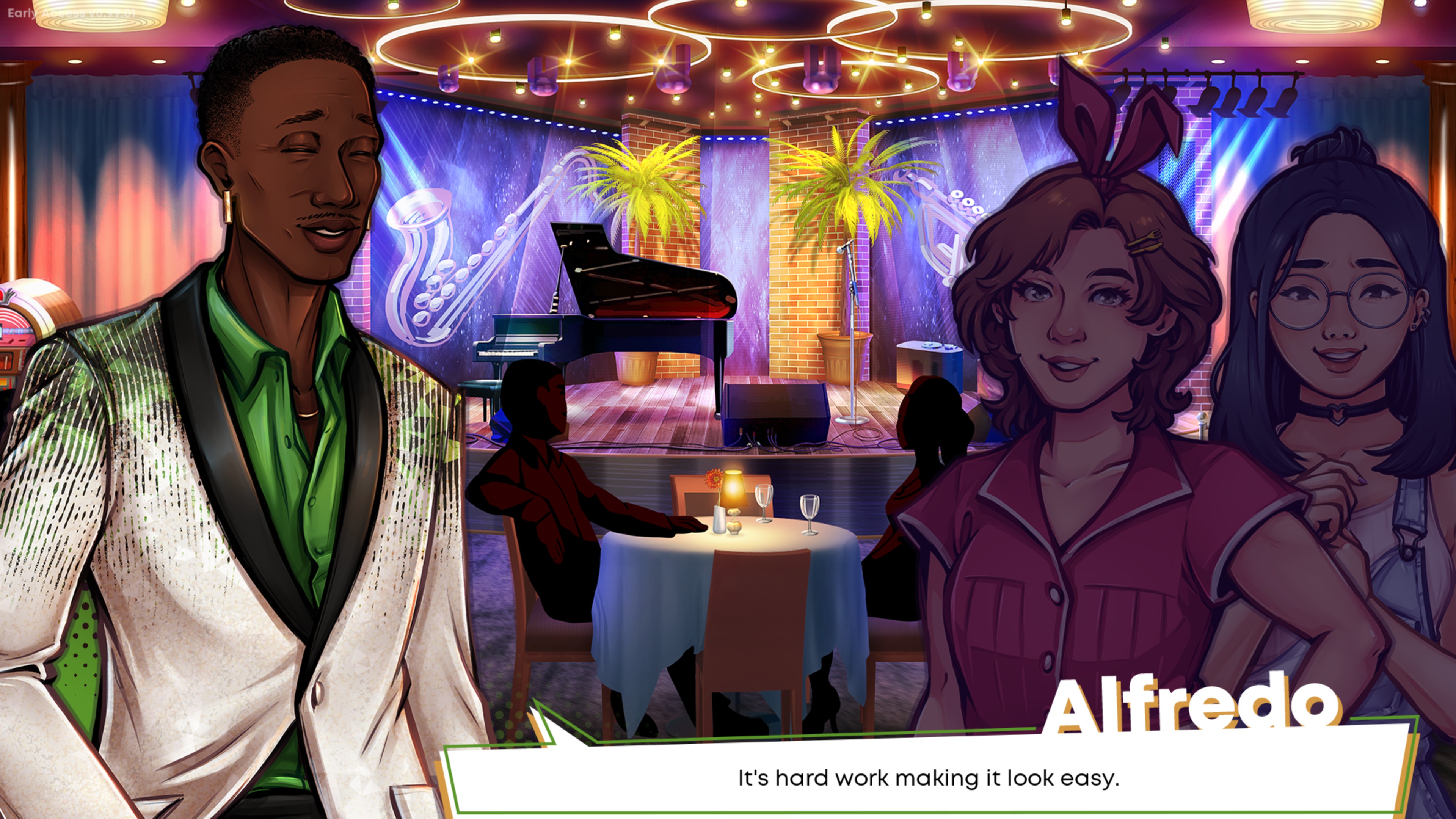
I'm going through a personal crisis at the moment involving an ill family member and the threatened meltdown of everything in my life. The situation has improved since I last wrote, but I don't quite have the time I want to dedicate to this piece. Therefore: I'm going to put this together as well as I can before the July 31 1.0 release date, but I may go back and refine this after posting - for better phrasing; the current version, though inelegant, does reflect what how I feel about Cook Serve Forever.
In brief: I don't think this is a wholly-successful game. I think there are elements that are very strong, that I really like, that do not deserve to be dismissed. There are ways in which this game demonstrates how much Vertigo Games has grown as a developer. I like its attitude and what it's trying to say, and I think we could use more games with a similar mindset in the world. I also think there are gameplay decisions - and it's the gameplay that, ultimately, is the problem here - that detract from what one searches for in a Cook, Serve, Delicious game, and while the game underwent an overhaul to address some of those issues, the fixes introduce new problems, and some of what I feel are the basic issues remain unresolved.
I also think that the choices made in regard to the denouement, while gutsy and thematically-coherent, may be too big an ask for an audience when paired with the gameplay challenges. I may feel differently on that later. I will say: this isn't a timid game.
The complete review's below, bookmarked by section for convenience.
Pompous Intro
The Argument That This Is Not Cook, Serve, Delicious 4 and That You Therefore Have No Right to Complain about Anything, You Big Babies
Presentation
Story
Gameplay
The Ending
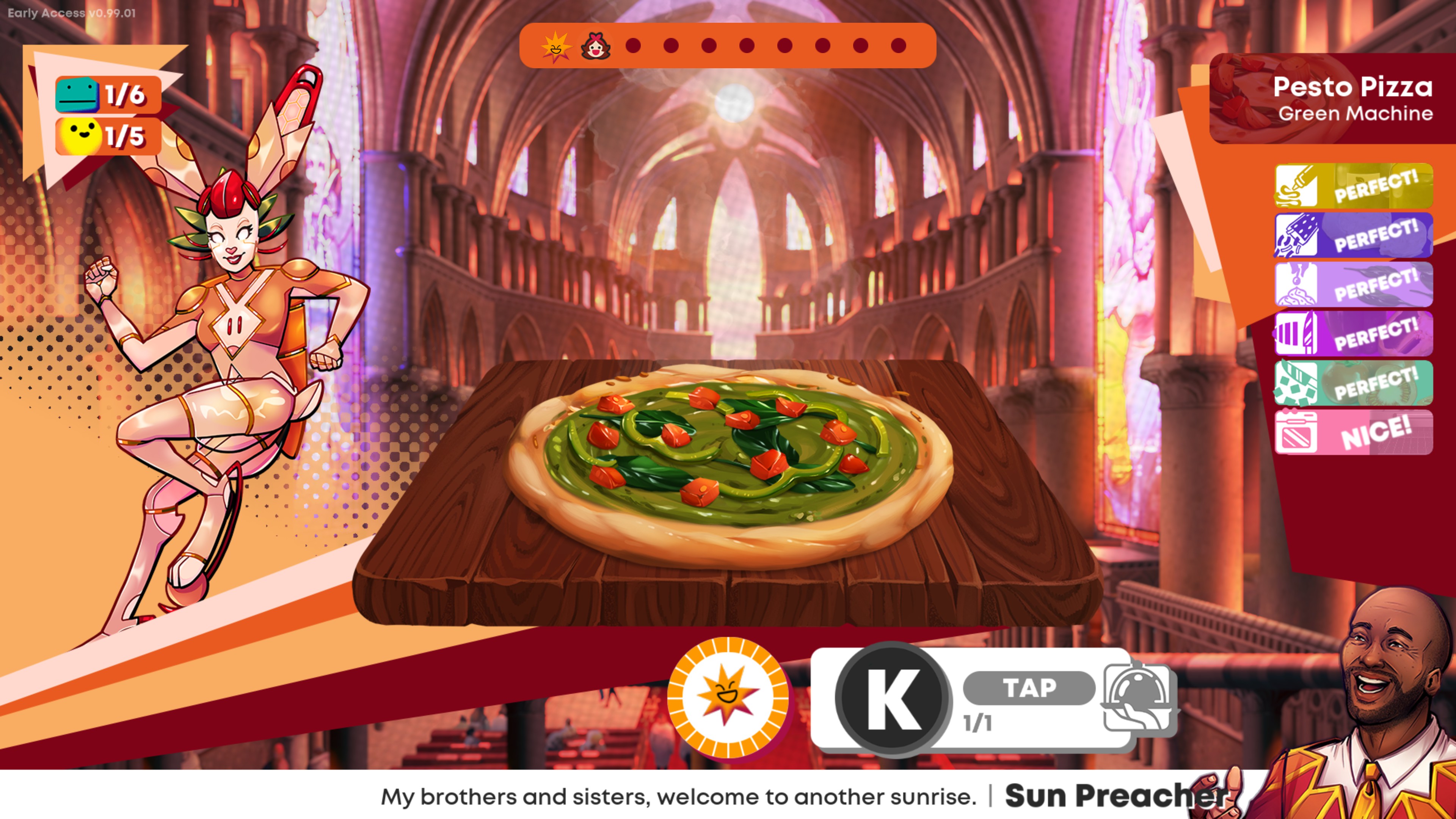
Pompous Intro
Cook, Serve, Delicious is one of my favorite franchises. I bought the first one before it was even on Steam, when it was just an executable off a website, after seeing it on Giant Bomb. I did everything there was to do in it, and after it got on Steam, I bought it and did everything again. I eagerly played and enjoyed the second and third games as soon as they were released. I tracked appearances of the Ryan Davis burger. I learned how to make stacked enchiladas after seeing them in CSD2. I have a fond memory of listening to Jonathan Geer's soundtrack for 3 while watching an ostentatious Christmas dynamic light mural outside a dentist's office that provided far better entertainment than the more elaborate but disappointing holiday event I'd just attended. Achieving a gold medal with a flawless performance on the challenge menu on the final level of Cook, Serve, Delicious 3 on my first try - before the challenge was nerfed, mind you - is one of my fondest gaming memories and perhaps my greatest gameplay achievement. I love this series. 3 is one of my favorite games.
As I write this, the release of Cook Serve Forever from early access is imminent. The latest installment has tried a few significant departures from how business was conducted in previous games, as you would expect of a series on its fourth title, and some folks don't think they're changes for the better. Where there's controversy, there's coverage, but I've frankly felt that the coverage I've caught has missed the mark: a video by someone who obviously was relying on secondhand reports and just fell back on a stock "entitled franchise fans resist change" narrative; Vinny Caravella gently lecturing Nextlander listeners that this, by his information, was not a sequel and that expecting the same-old was unreasonable.
So I took a long look at the landscape below, and I thought, well, my invaluable input is obviously required here. Seriously, though: having played through the series and experienced Cook Serve Forever in early access, before and after the overhaul, I'm working with better info than other folks, so I think I'm a bit more equipped to explain what's going on and offer an informed opinion on the game. For reference, I played through the story using the 0.99.05 build; it took me about 13 hours for a platinum, 40/40-cheevo run.
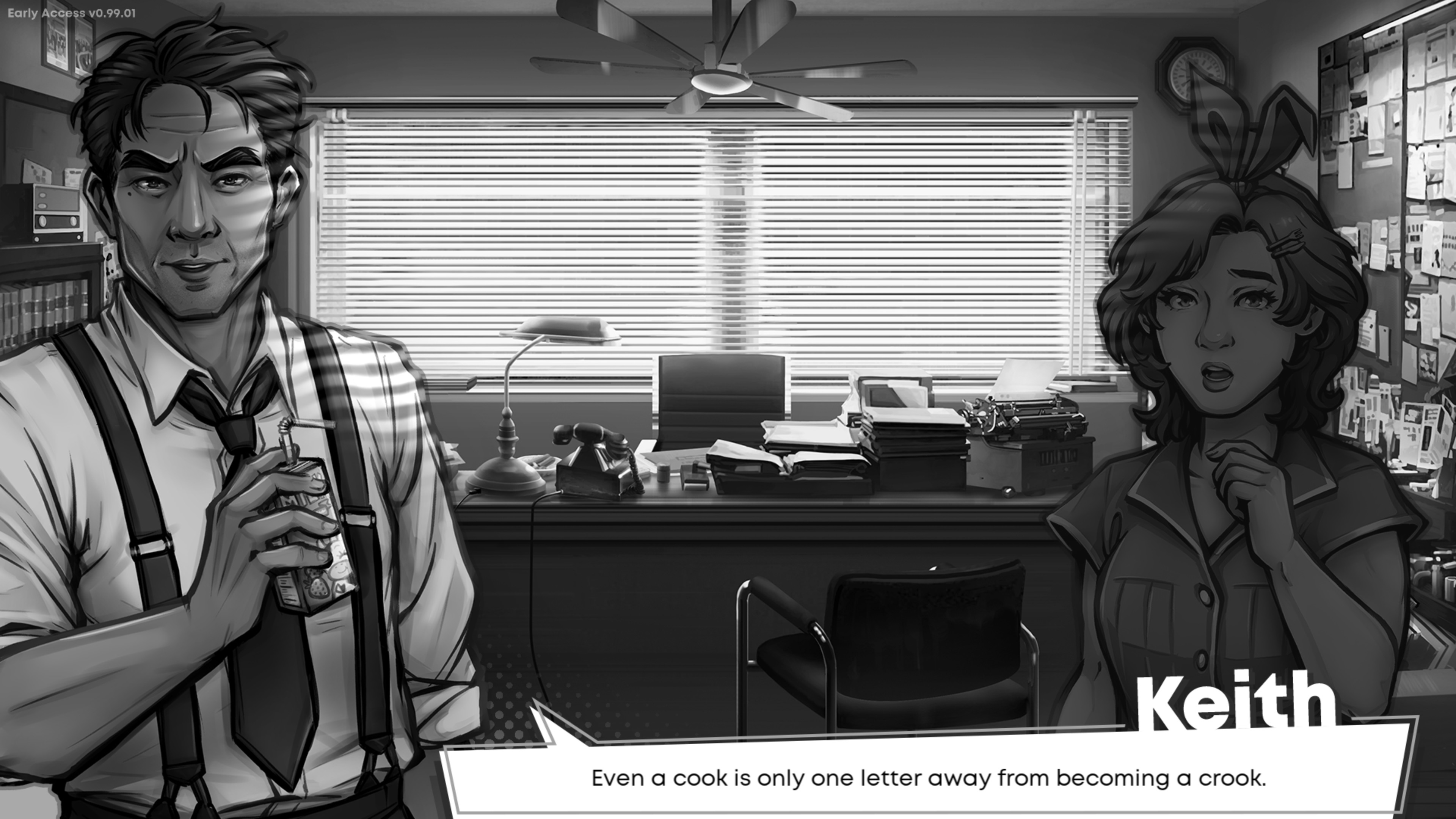
The Argument That This Is Not Cook, Serve, Delicious 4
OK, before we start in proper: as mentioned, Cook Serve Forever features significant changes to the series gameplay and a much greater concentration on story. Some fans didn't quite take to various aspects of these changes, the new gameplay in particular, prompting a revamping of mechanics in the early access period. I've seen these reactions dismissed as, well, reactionary: kneejerk objection to change from a community too accustomed to the same old thing. (The YouTube video I watched claimed fans were upset because the series had never had any gameplay changes previously, which is completely false.) I'll get to the gameplay details in a bit, but I will say, as a series fan willing to try something new, that the changes are, in fact, significant, and I could understand some fans struggling, having trouble acclimating, or just not finding them as fun or rewarding as the gameplay in previous entries. When it comes to the gameplay, at least, it's not just whining for whining's sake.
Some outlets go further, though, and claim that it was completely unreasonable to compare CSF to past games in the franchise or expect it would be anything like them, as Cook Serve Forever, in their estimation, was not a sequel and not intended to be Cook Serve Delicious 4. I would call this unfounded...but even series head honcho David "chubigans" Galindo, in a pinned post on the Steam forum predating early access, affirms that "this is not a Cook Serve Delicious game".
I gotta give a gentle "come on" to this. The game is named Cook Serve Forever. It is the fourth cooking-themed release in this universe from this studio, using the same "player is a chef preparing a succession of short-order recipes using typing or button combos" concept and many of the same mechanics. There is an audible "Four" in the title - presented in a bit of a different way, signaling that this is going to be a bit of a different game, but something that still merits "Cook, Serve" in its name. (Like Silent Hill: The Room: slight departure in the naming convention to indicate a departure from previous installments, but still part of the series.)
The signals seemed pretty clear to me, and I don't think it's unreasonable at all to conclude Forever is CSD4. If Vertigo didn't want that conclusion drawn, they could have named the game something completely different with an "A Cook, Serve, Delicious Story" subtitle and not something with "four" audibly in the title. And I gotta ask: if you didn't want anyone coming to Cook Serve Forever based on memories or expectations formed from previous games, then who *is* the audience for the game, then? If you don't want previous fans of the series buying this because they liked your past work, why put "Cook, Serve" in the title at all?
In a way, this is an old argument: "I want the sales from existing fans of this franchise but not the expectations that come with being a sequel," particularly if you're doing something markedly different this time around. (Dragon Age: The Veilguard is perhaps the most salient recent example.) I can say upon completing it that Cook Serve Forever does seem like a sequel, just one that's gone in a different direction, for 95% of its length. I understand Vertigo wanting some latitude for this experiment from longtime series fans, but I think it's unreasonable to argue the primary audience for this game should bring no expectations to the table, and I think the "this is not Cook, Serve, Delicious, no, sir; where did you ever get that idea?" approach, be it from the studio or folks trying to advocate for the game, is a wrong-headed, bad-faith idea.
(Two addenda here. 1) The heroine of CSF is involved romantically with another woman, who is her co-protag. This has prompted a few genuine reactionaries to object "why does the main character need a girlfriend" etc. This viewpoint is obviously bullshit and will gain no purchase here. 2) Despite all the the above: the handling of the denouement of the game, which demonstrates dramatically different priorities vis-a-vis structure & gameplay than the other games, was the first real point in which I actually considered the "this is not a sequel" argument. But the people in the "expectations are unfair" camp - save Galindo, of course - are very unlikely to have reached that point in the narrative.)
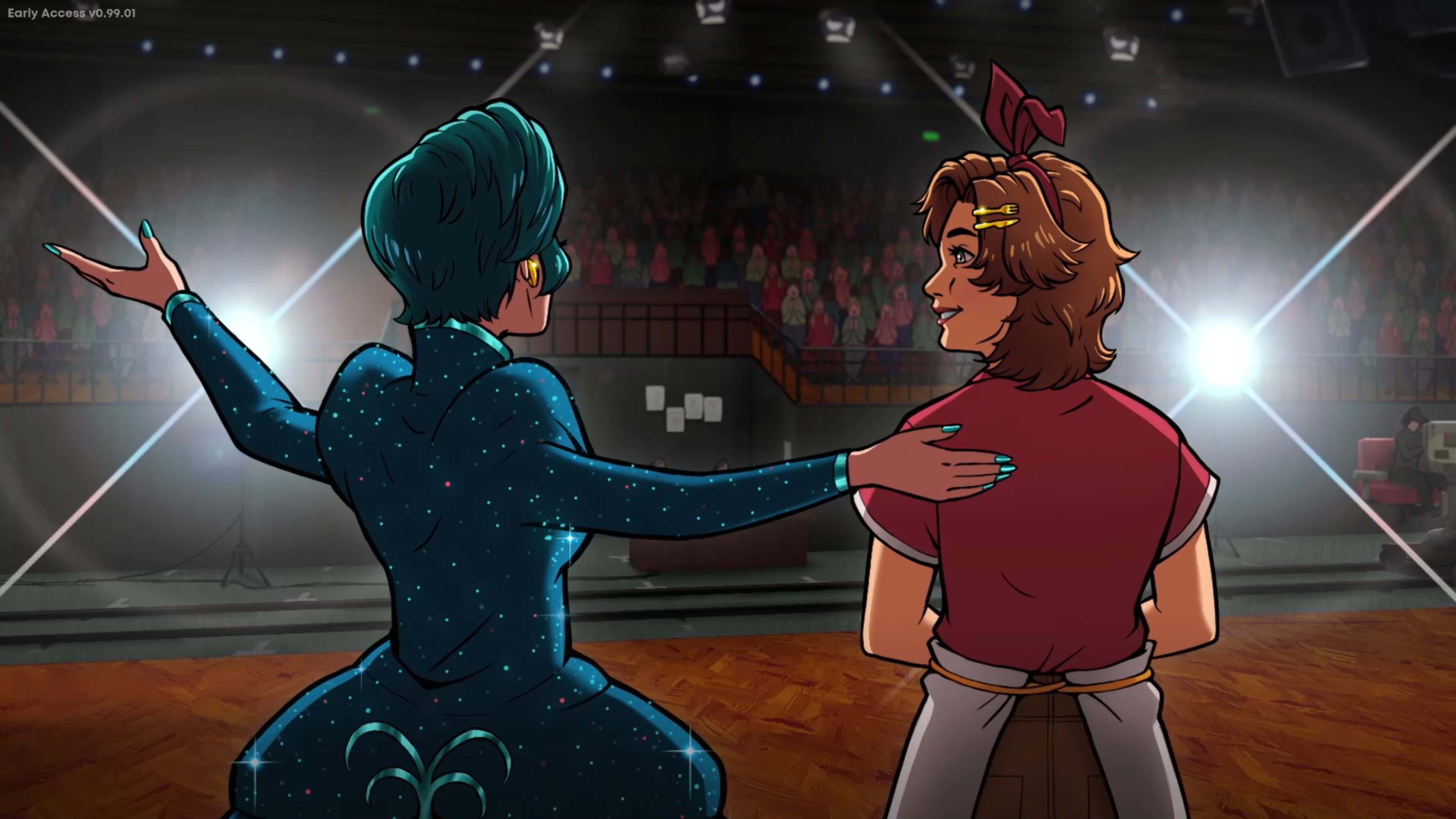
Presentation
Cook Serve Forever's presentation is just excellent - the department in which Vertigo truly delivers on its attempt at Cook, Serve, Delicious, but with a twist, taken to another level. First: graphics. Gorgeous, in many respects. Cook, Serve, Delicious food has always looked downright succulent, and this does the series proud:
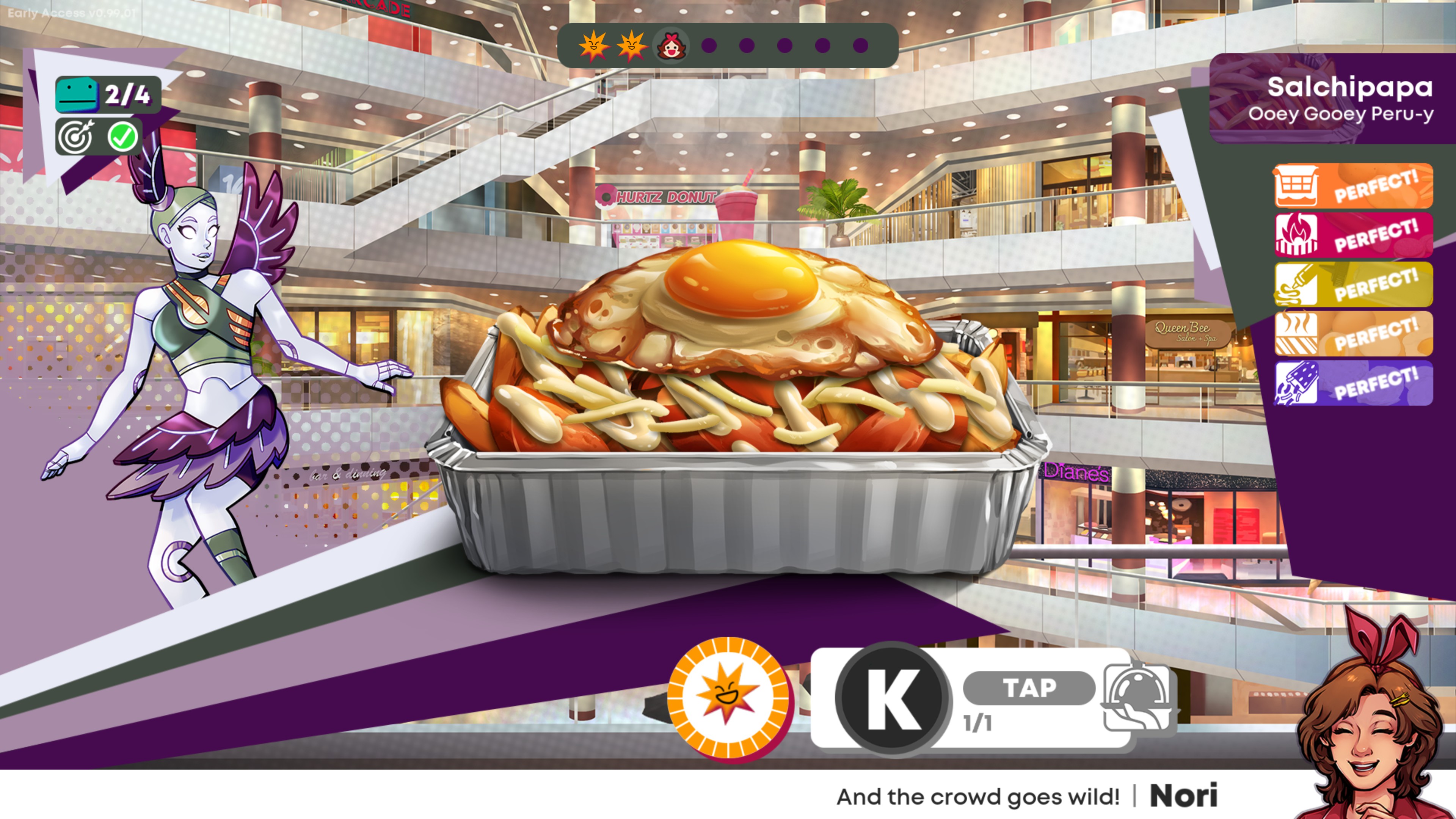
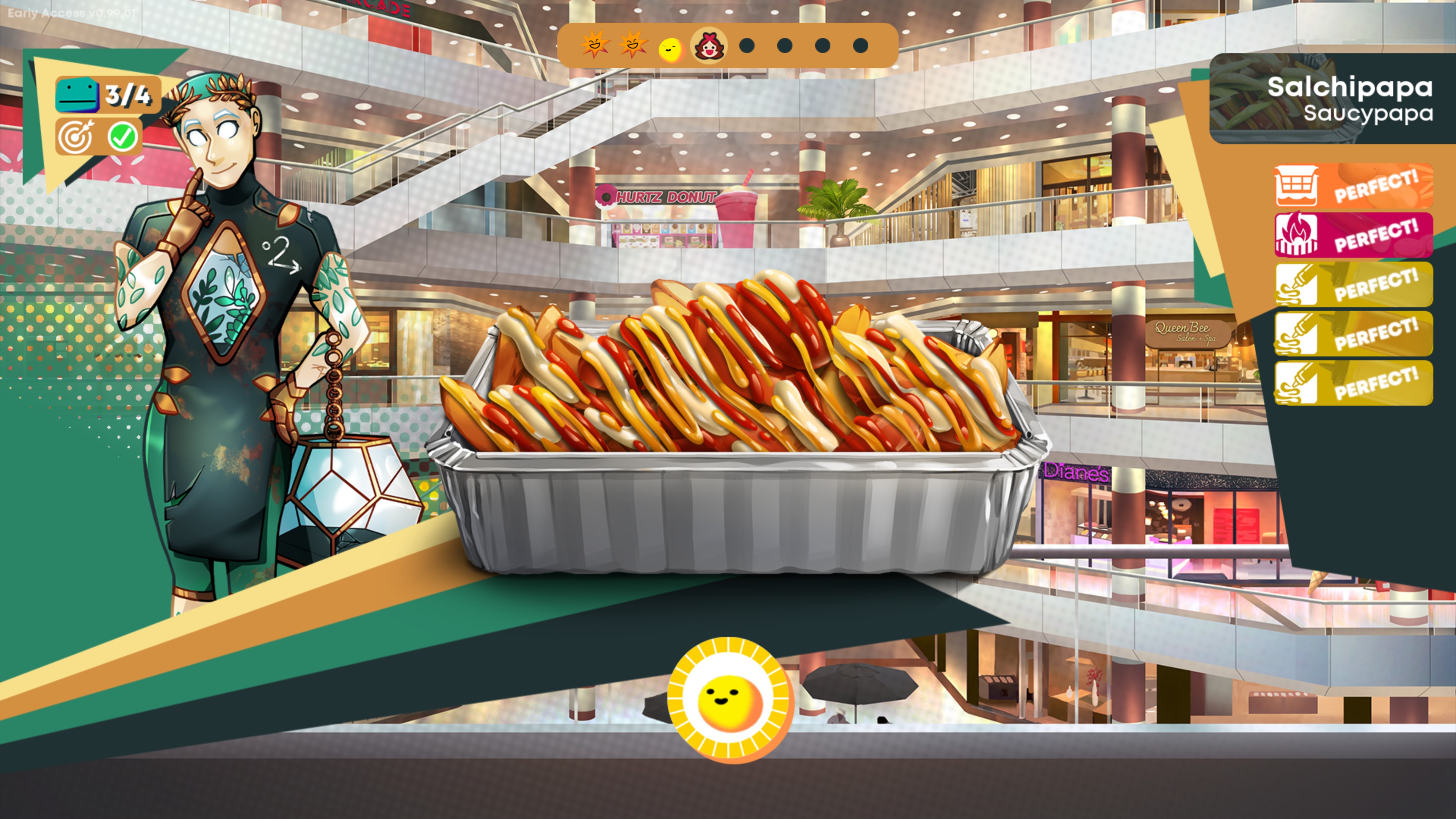
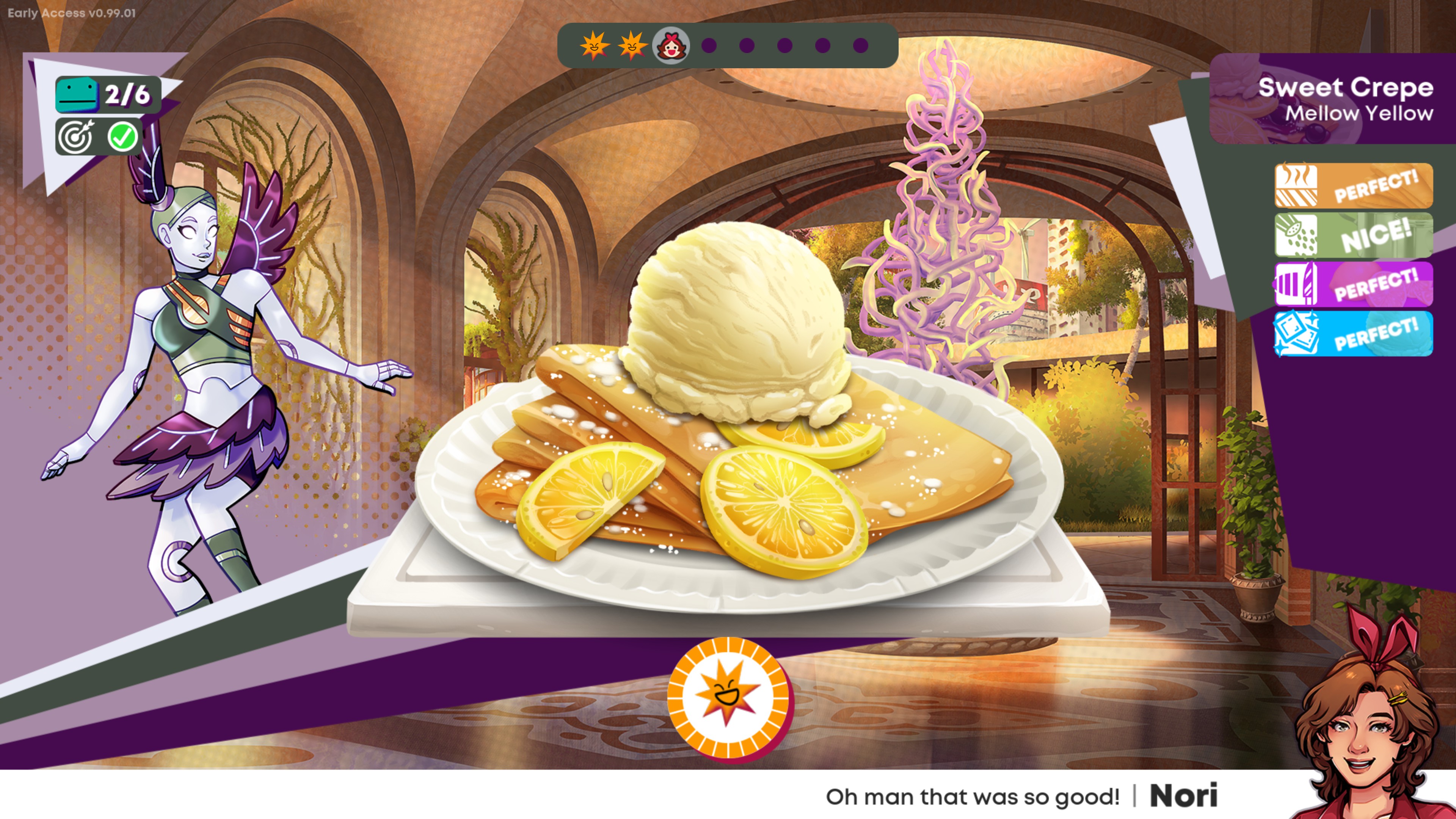
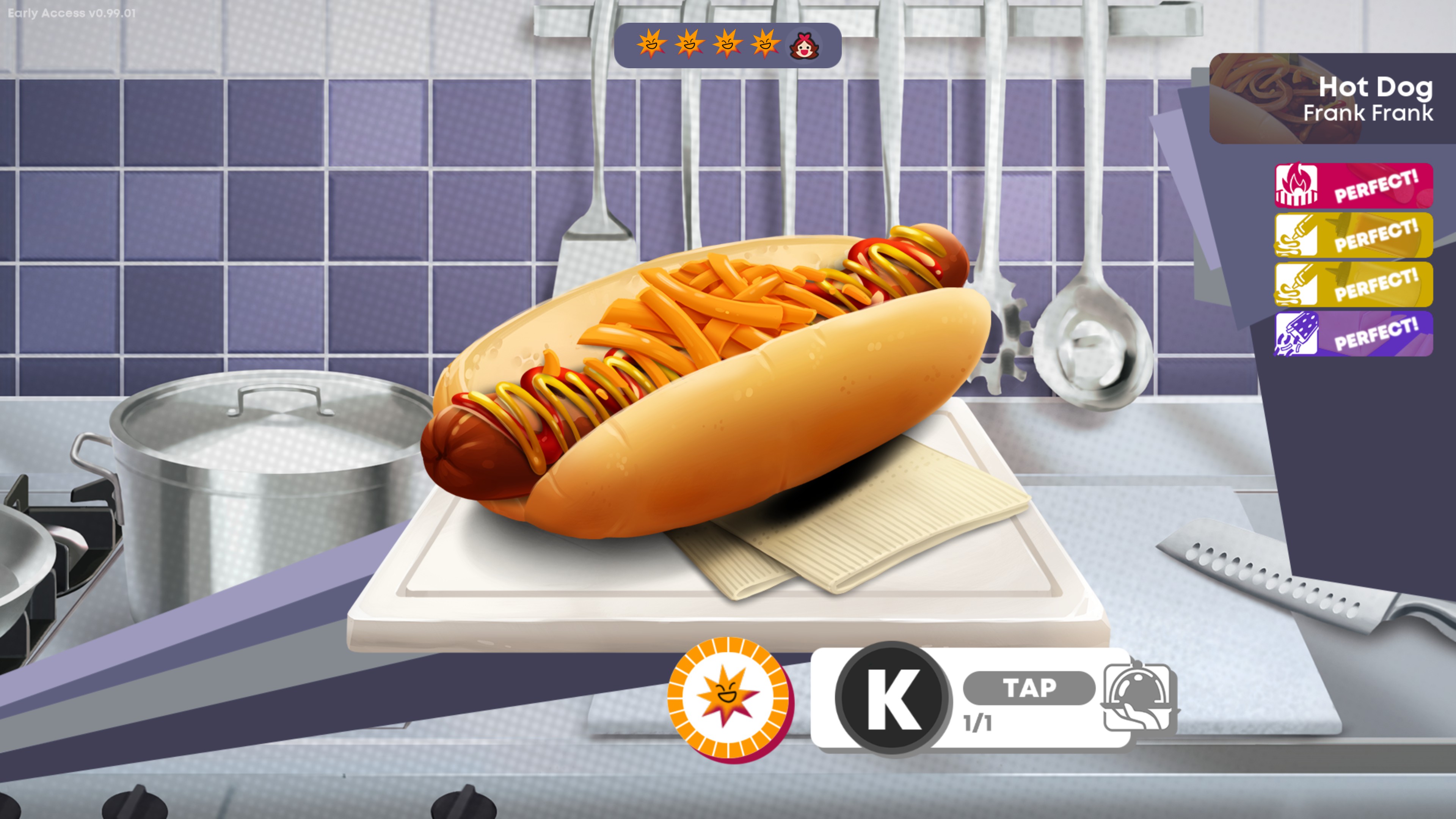
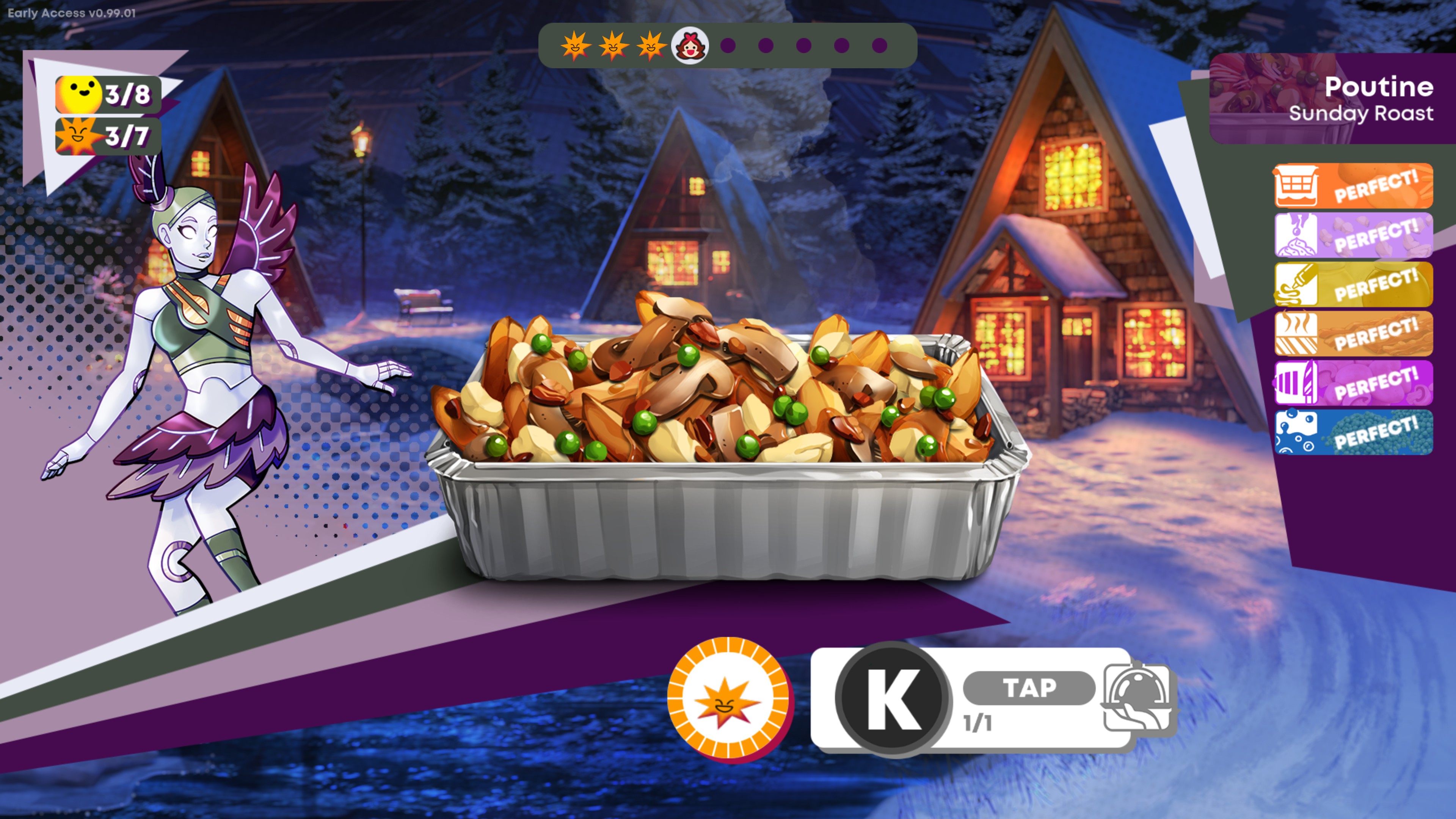
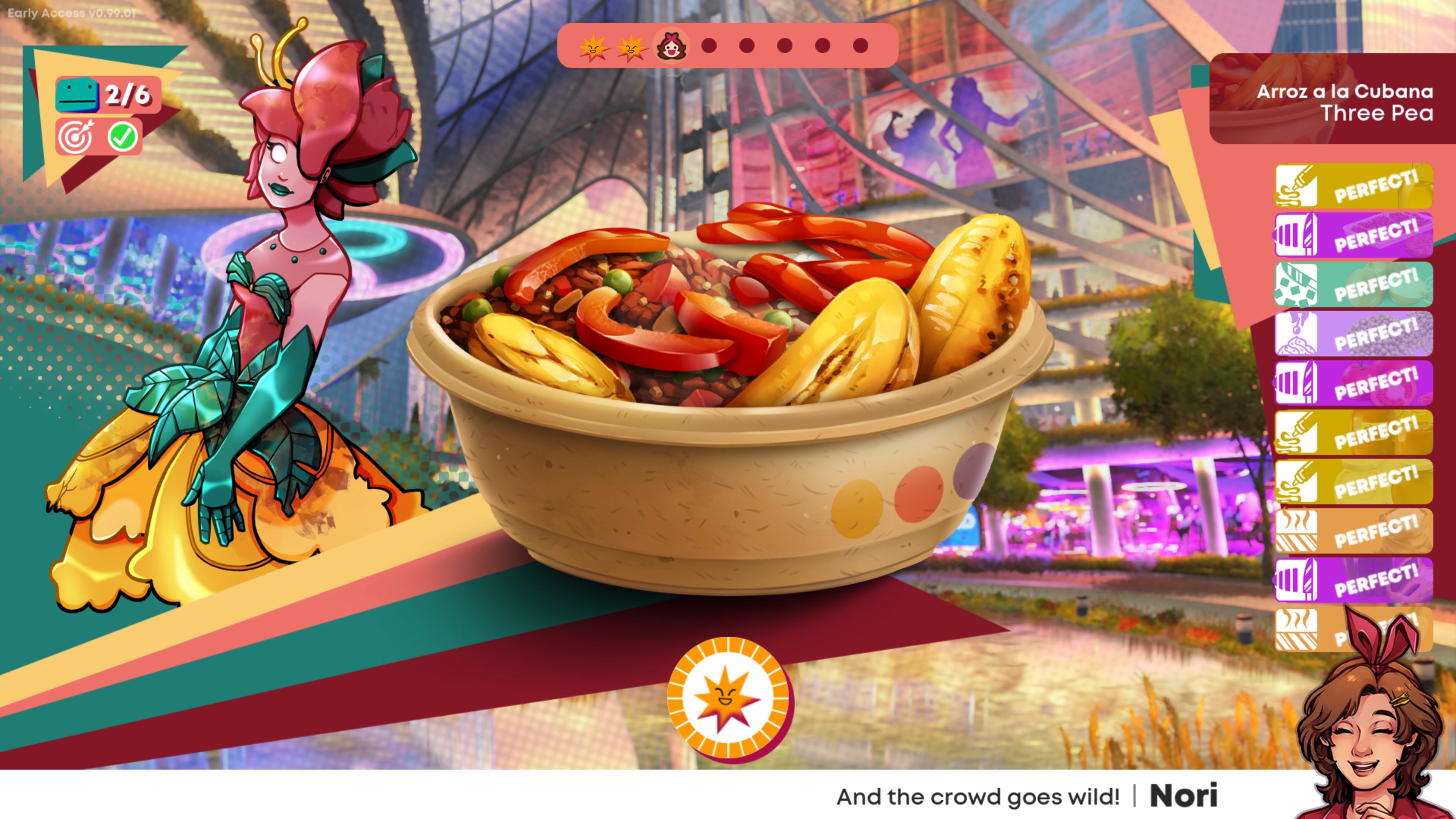
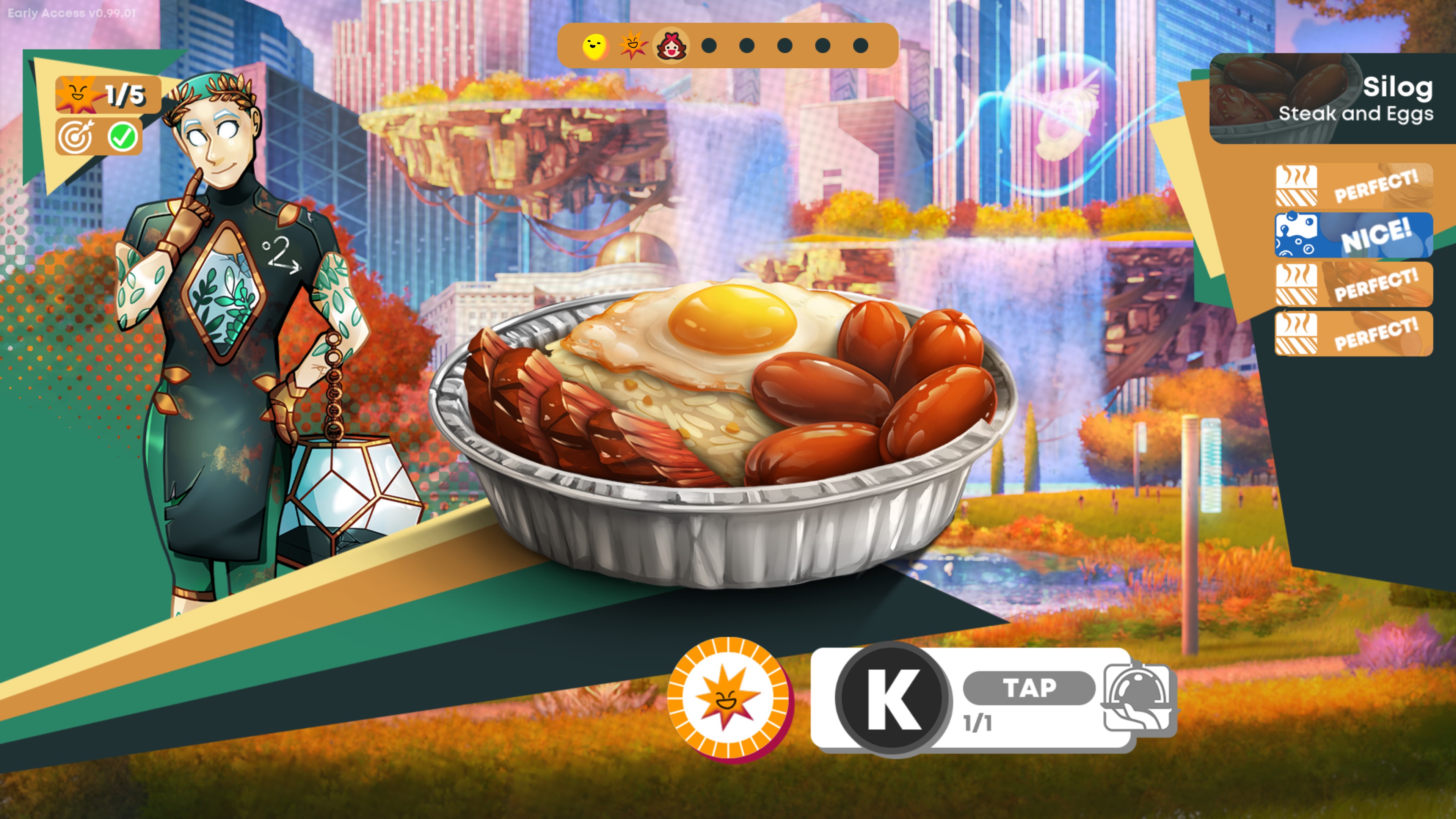
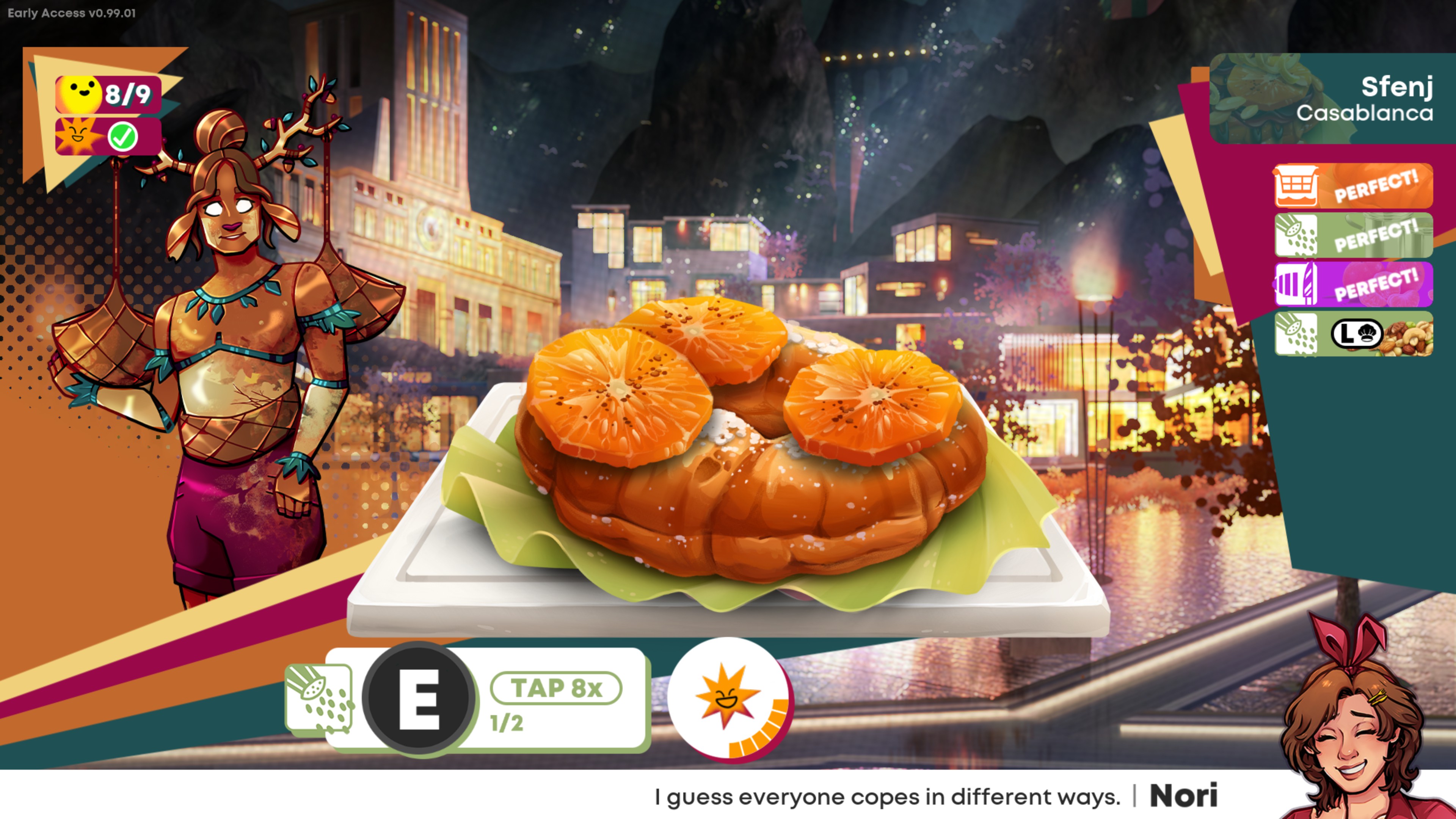
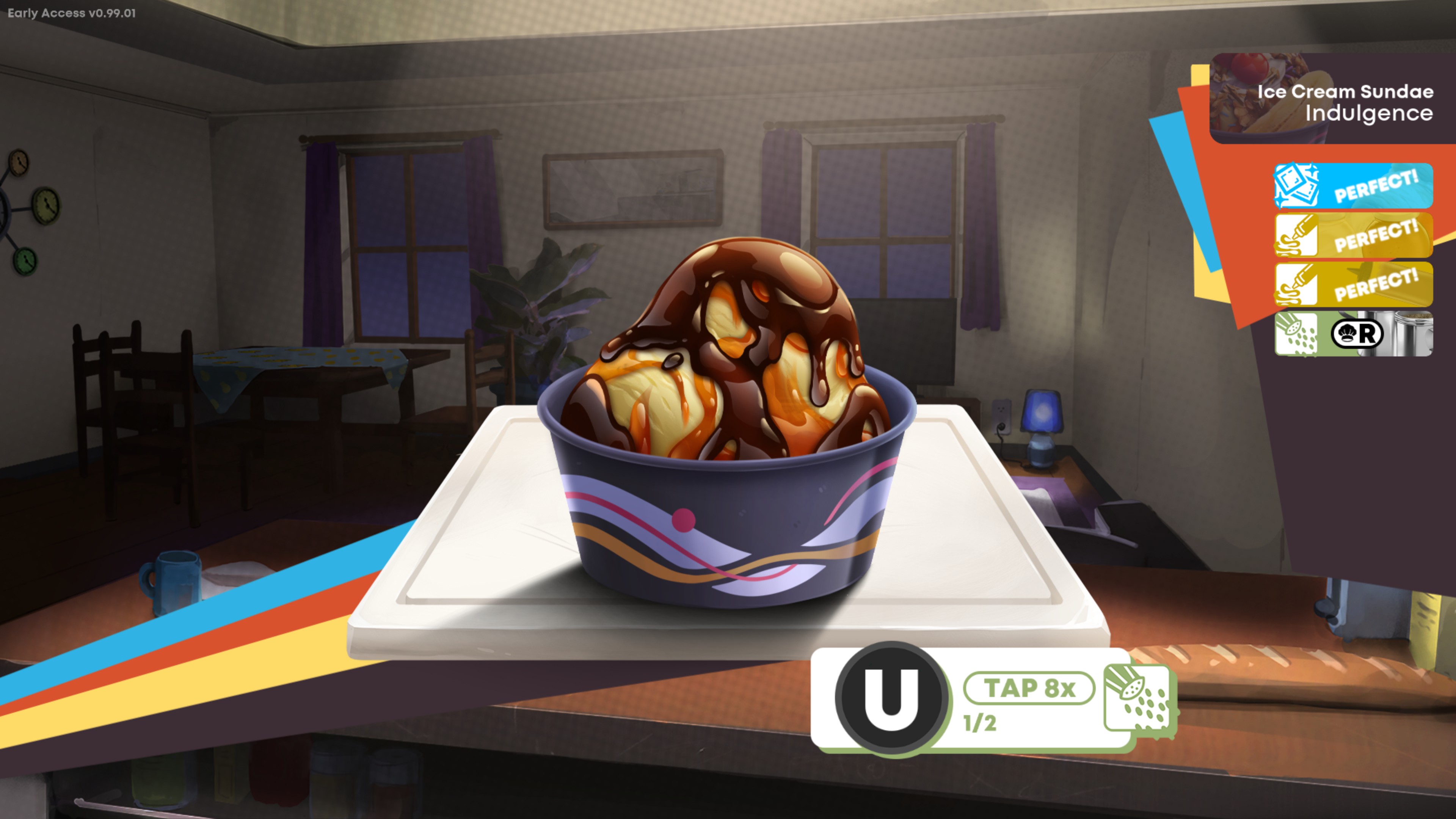
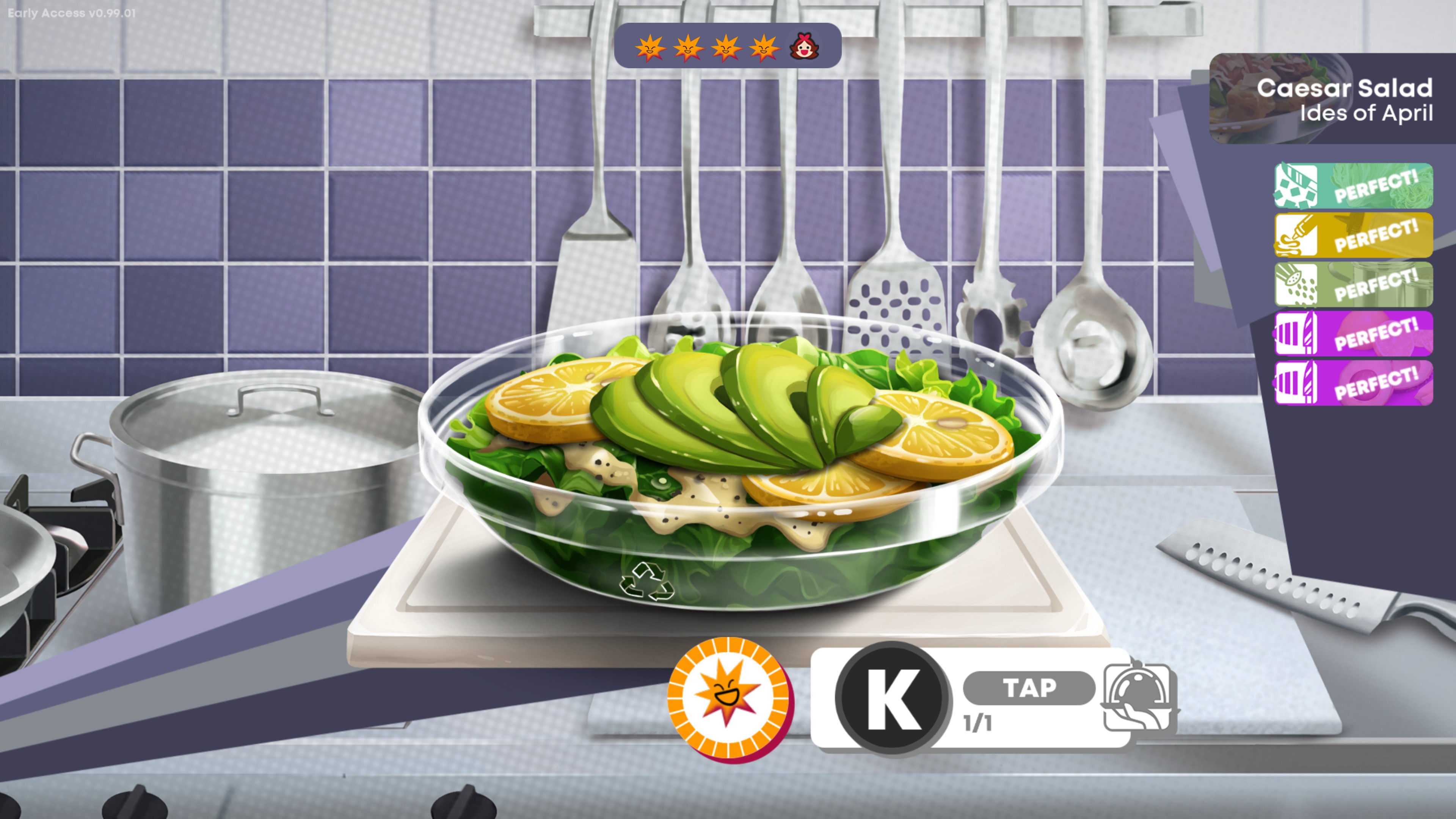
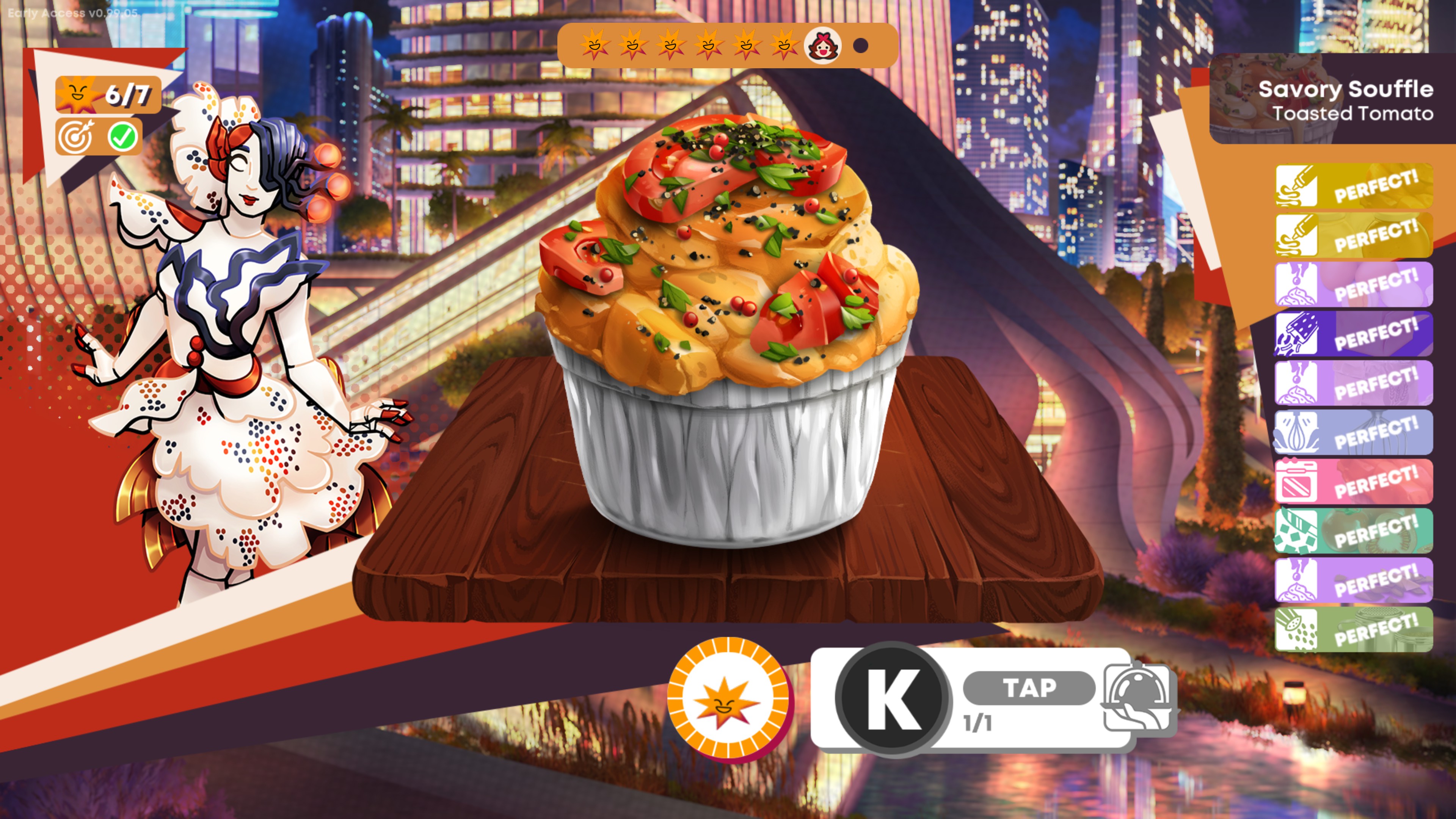
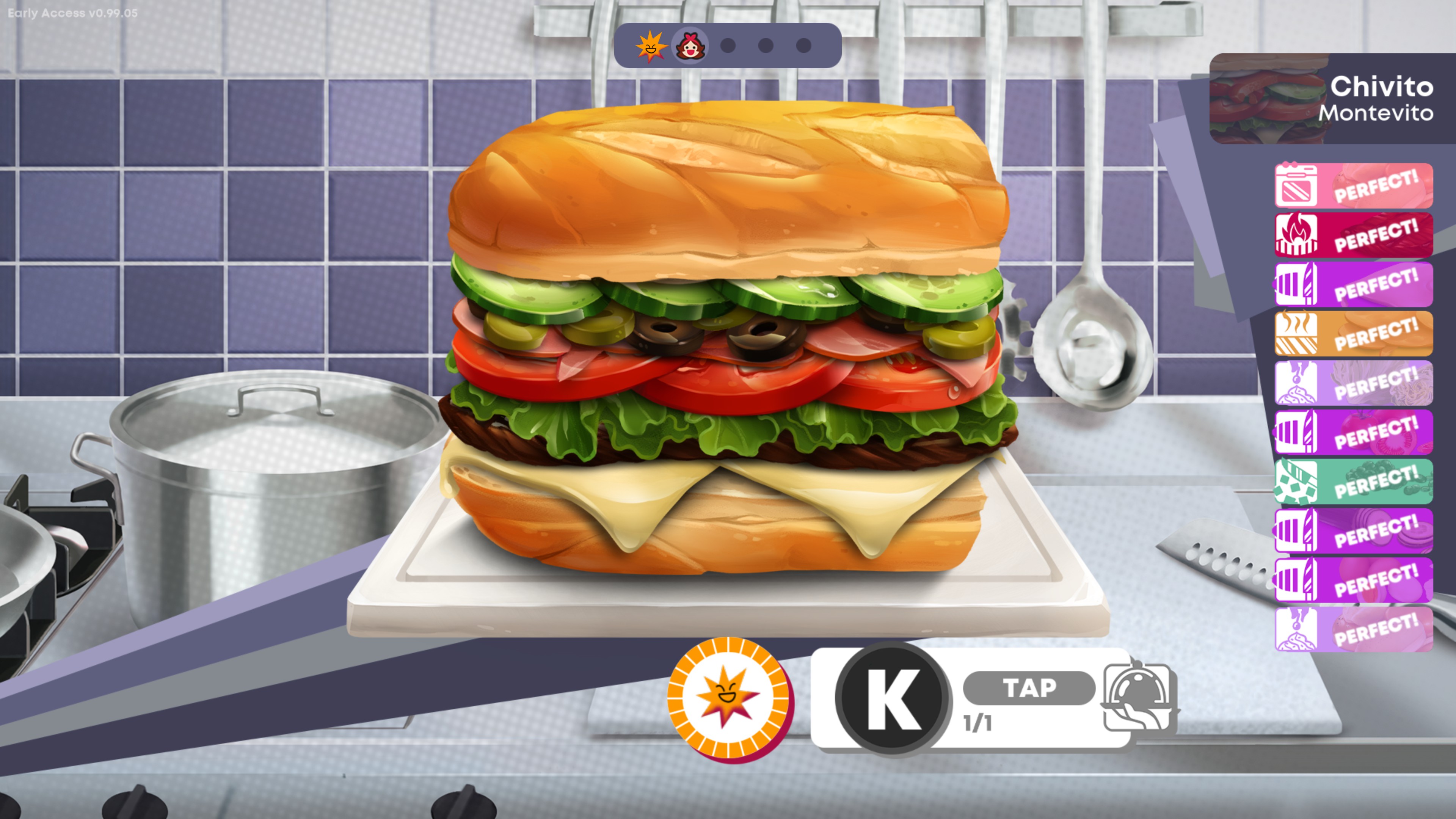
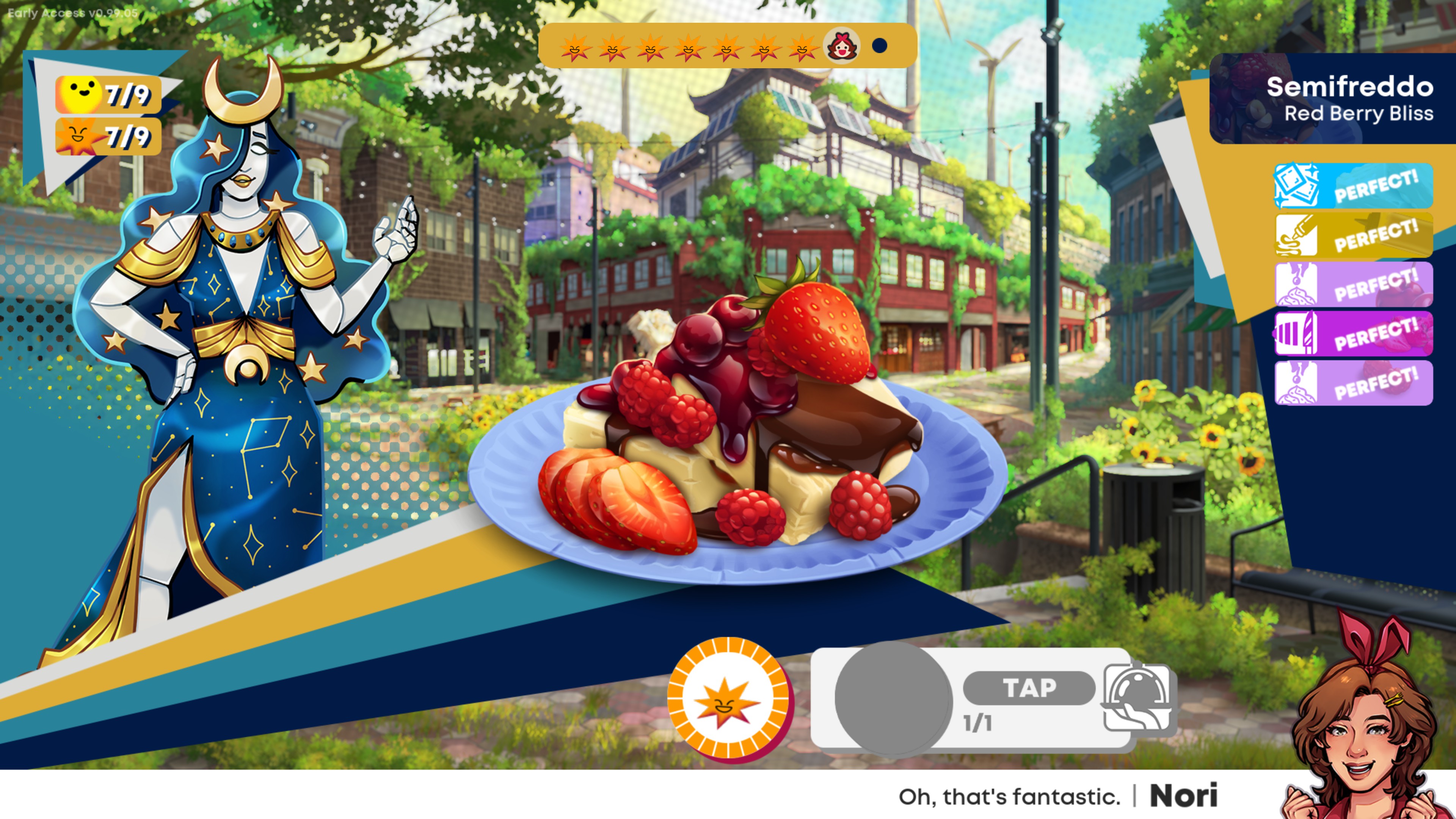
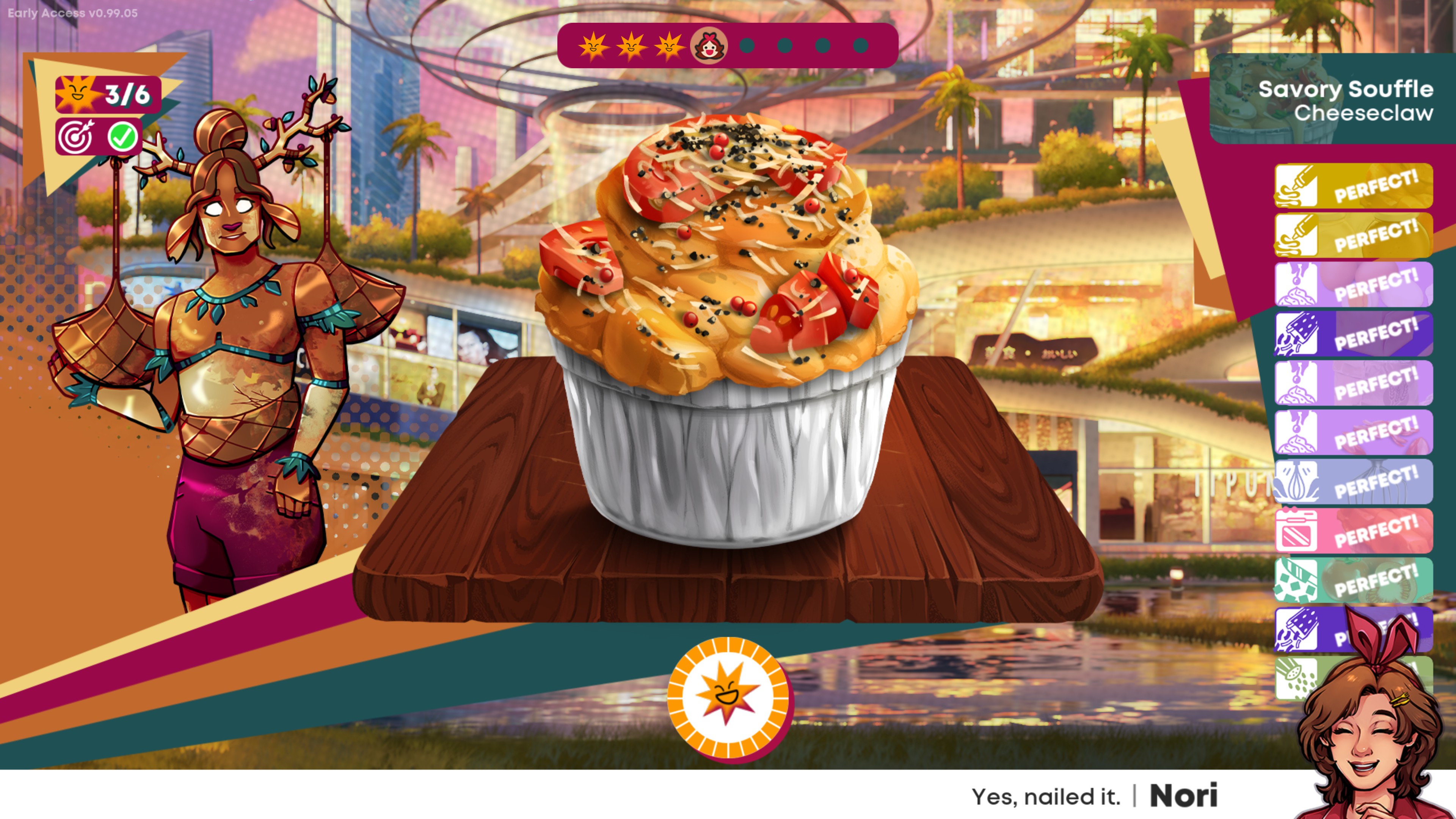
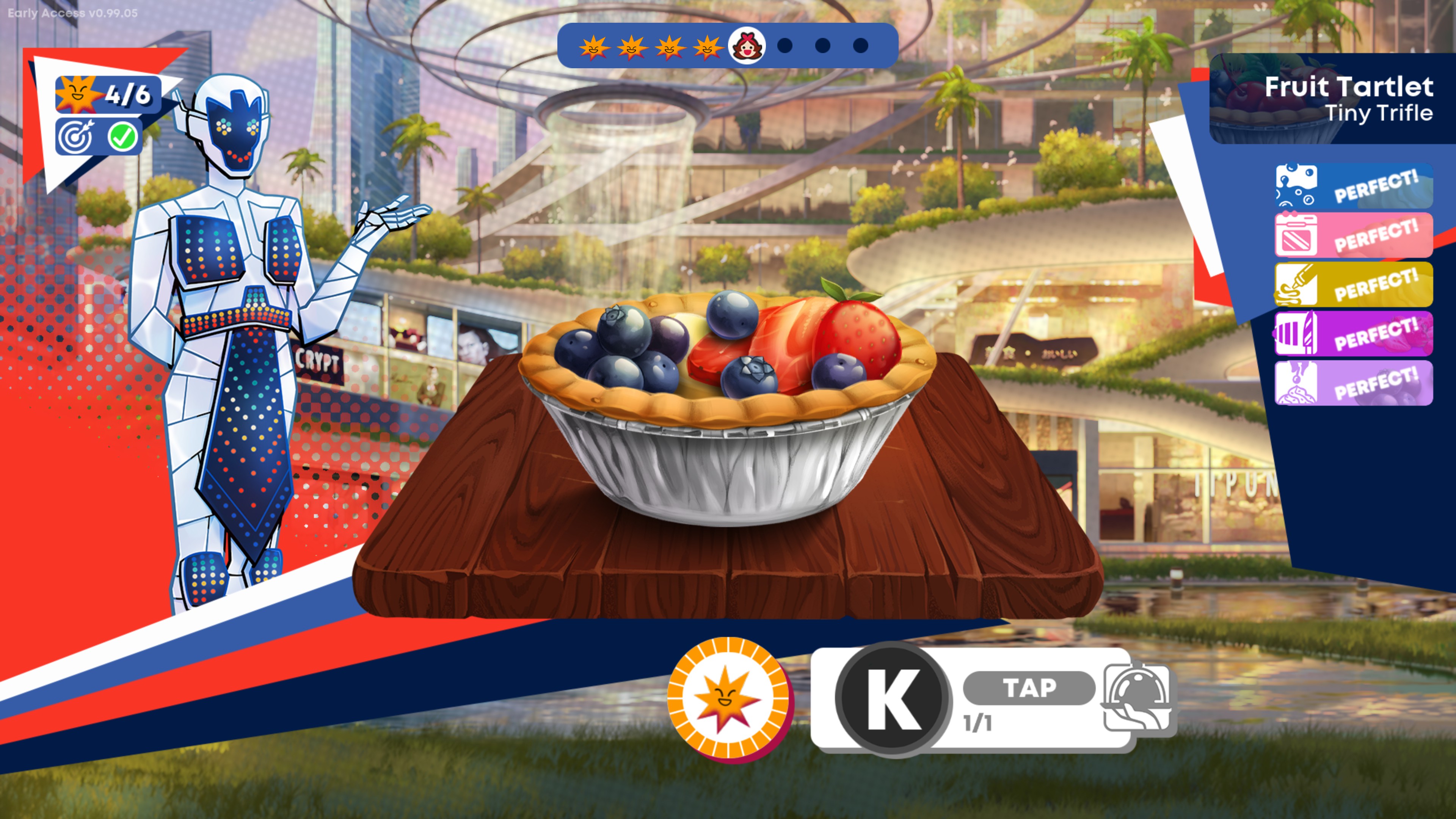
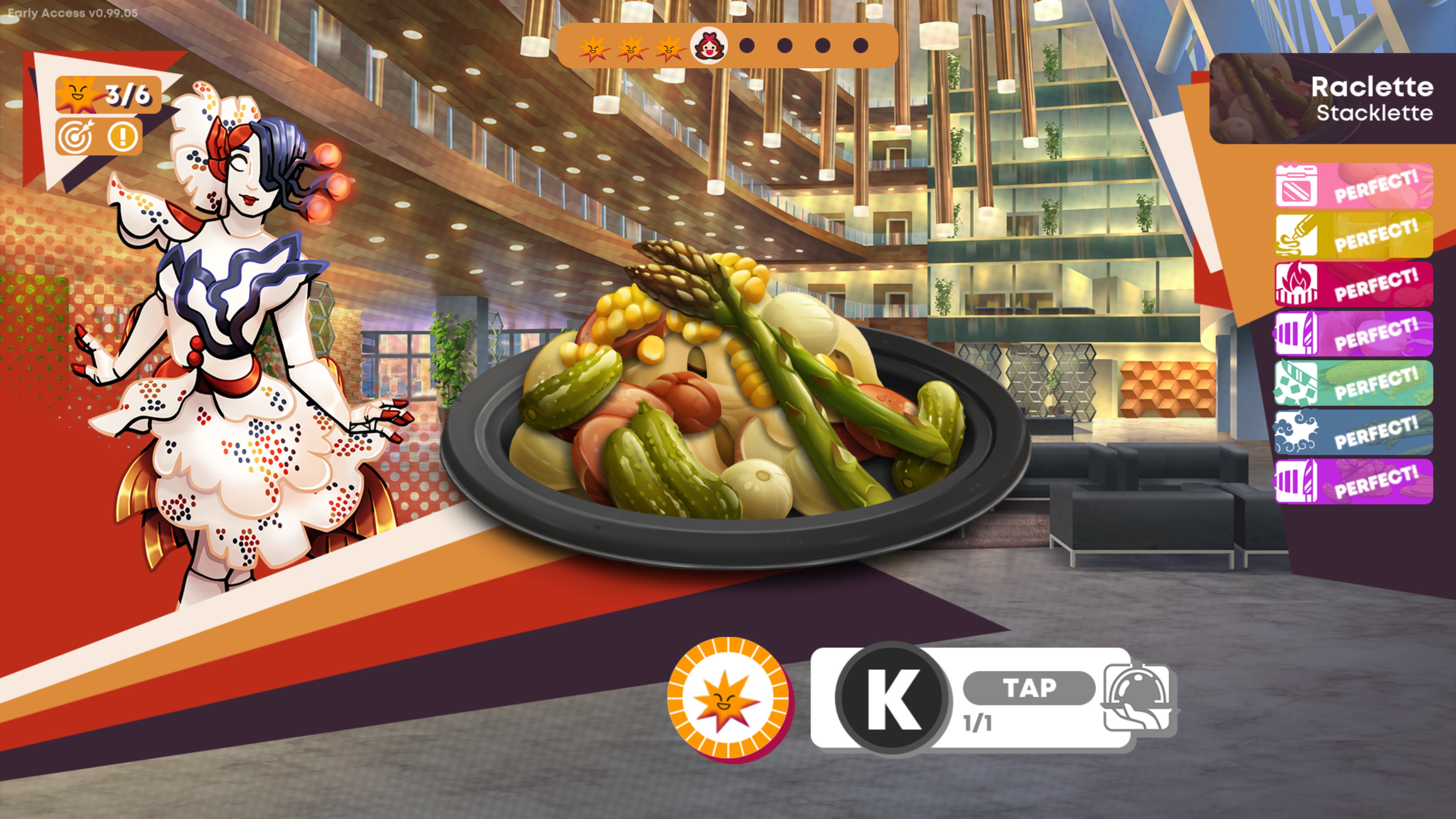
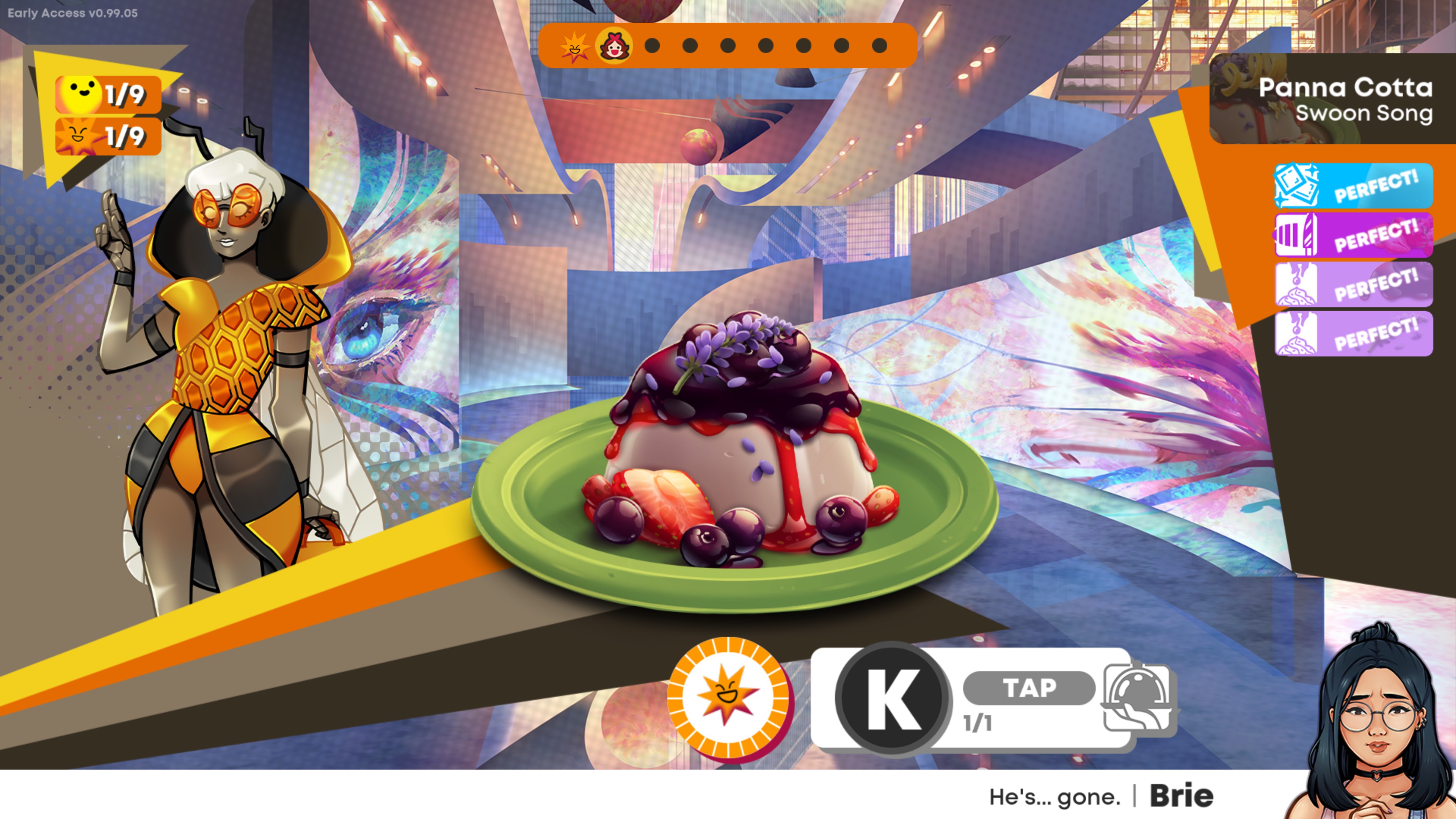
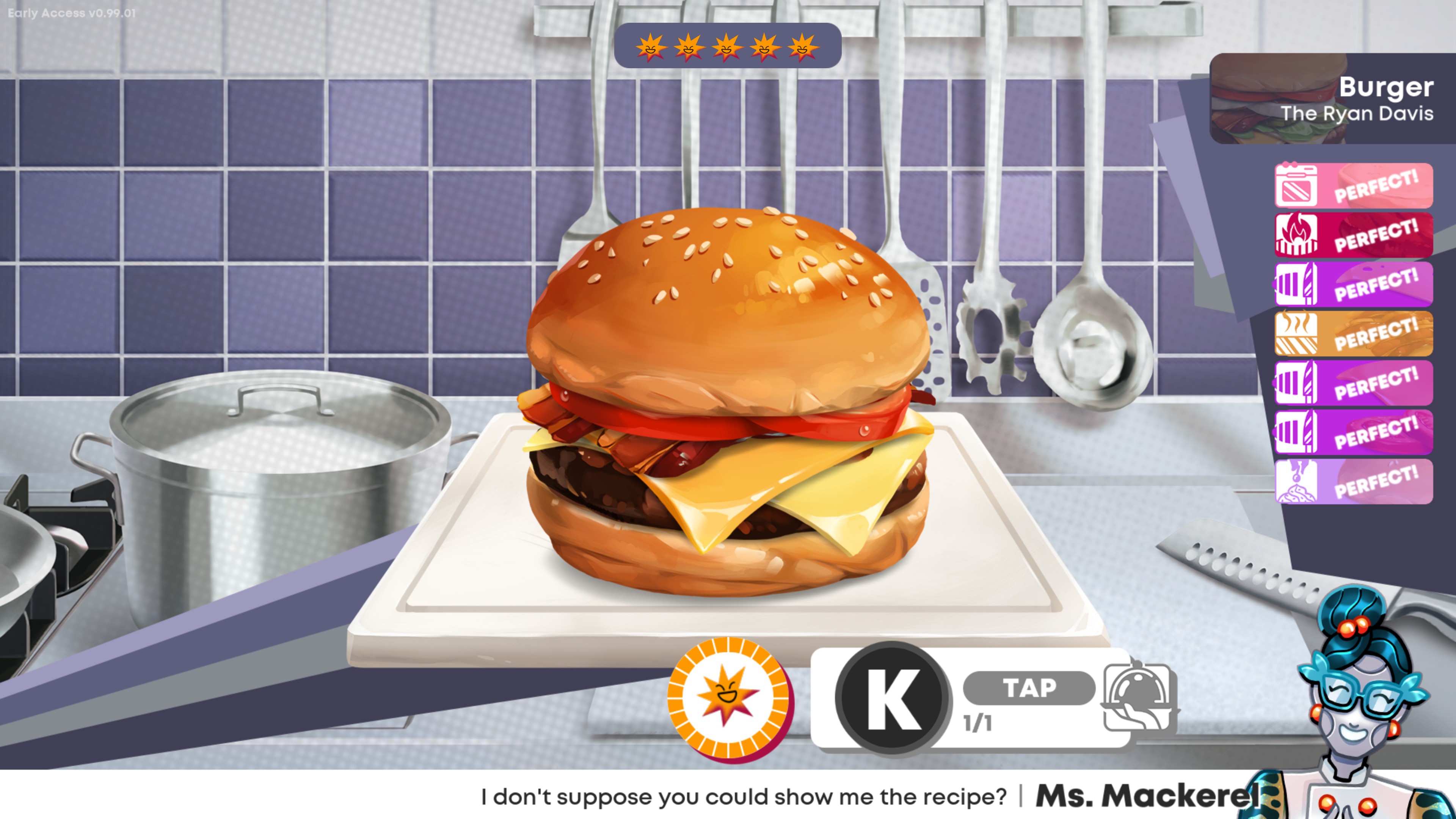
To me, though, even the food was outshone by the location and place-setting graphics. I loved the design of the visitors to your cart, both the humans, who seem to be taking palette cues from Phantasy Star II, and the Doordash-inspired delivery bots and their imaginative themes:
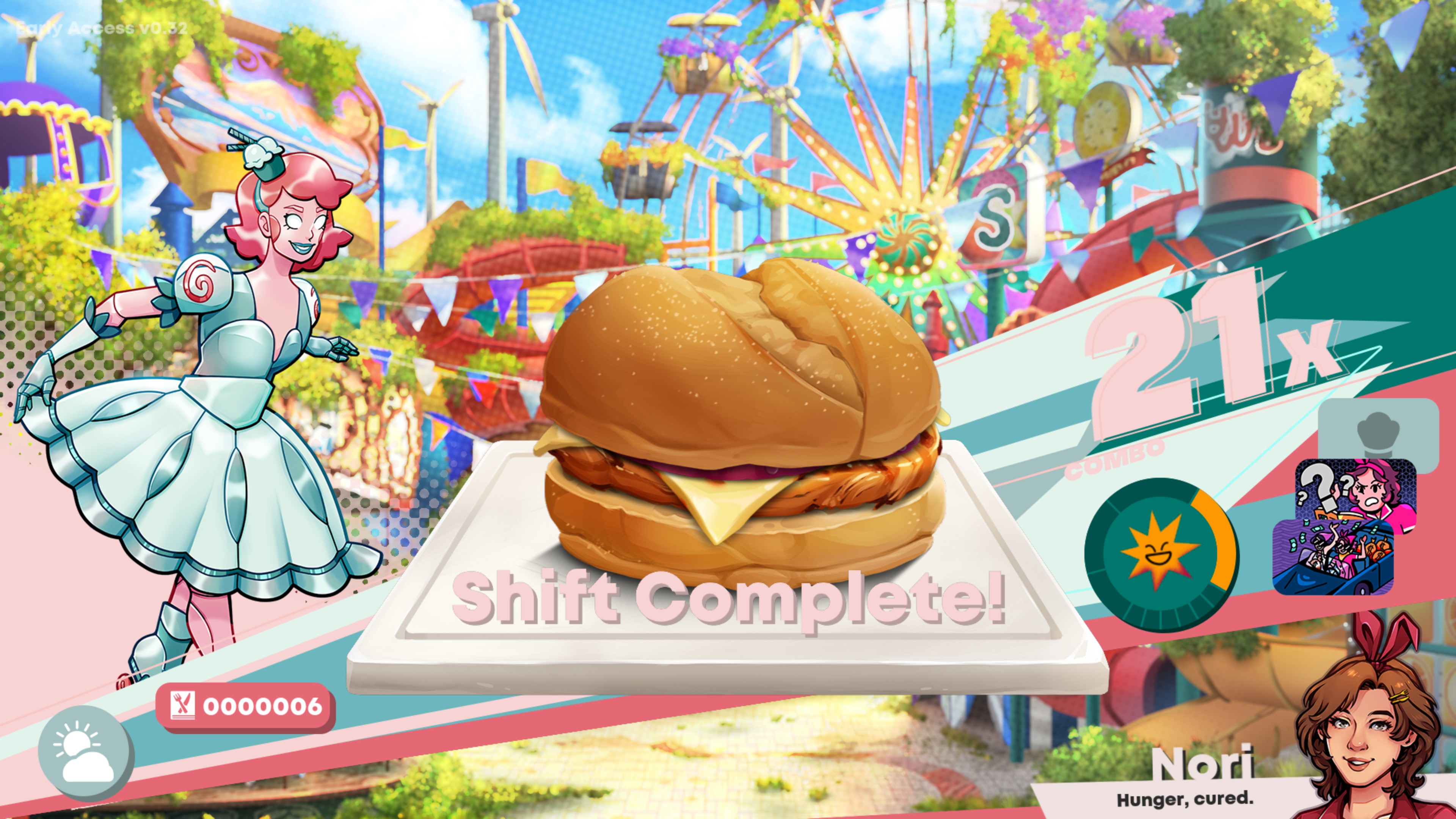
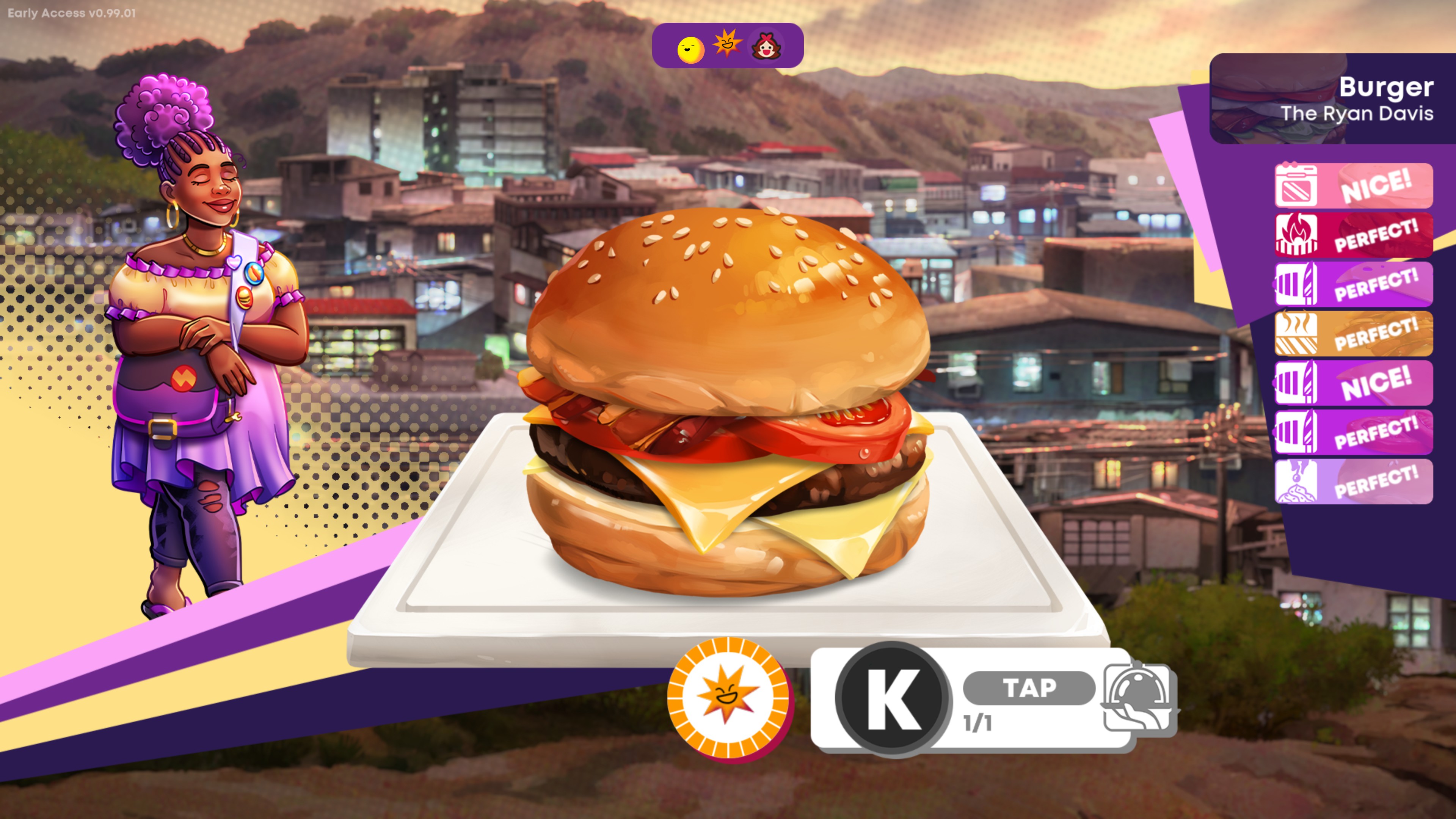
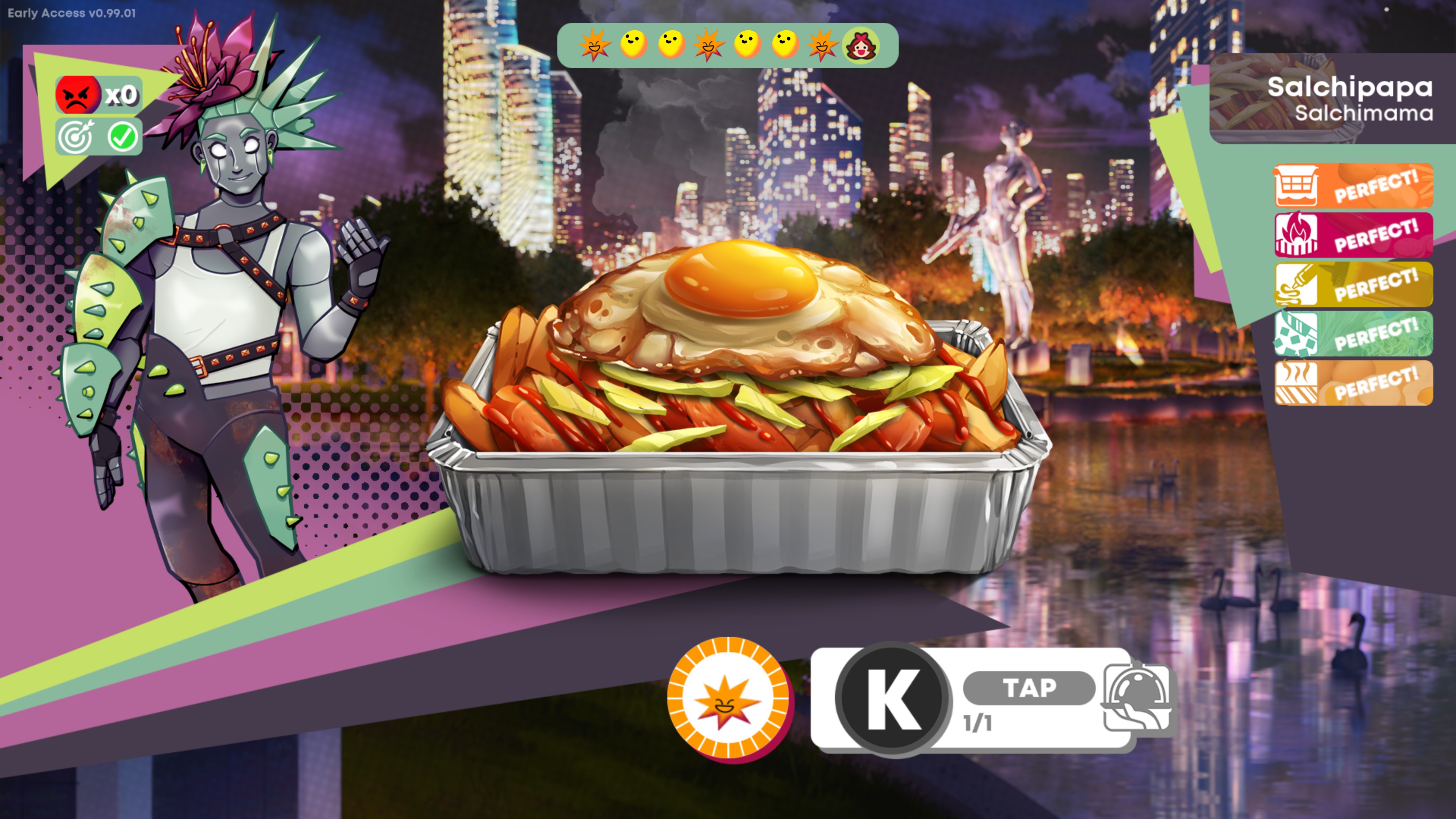
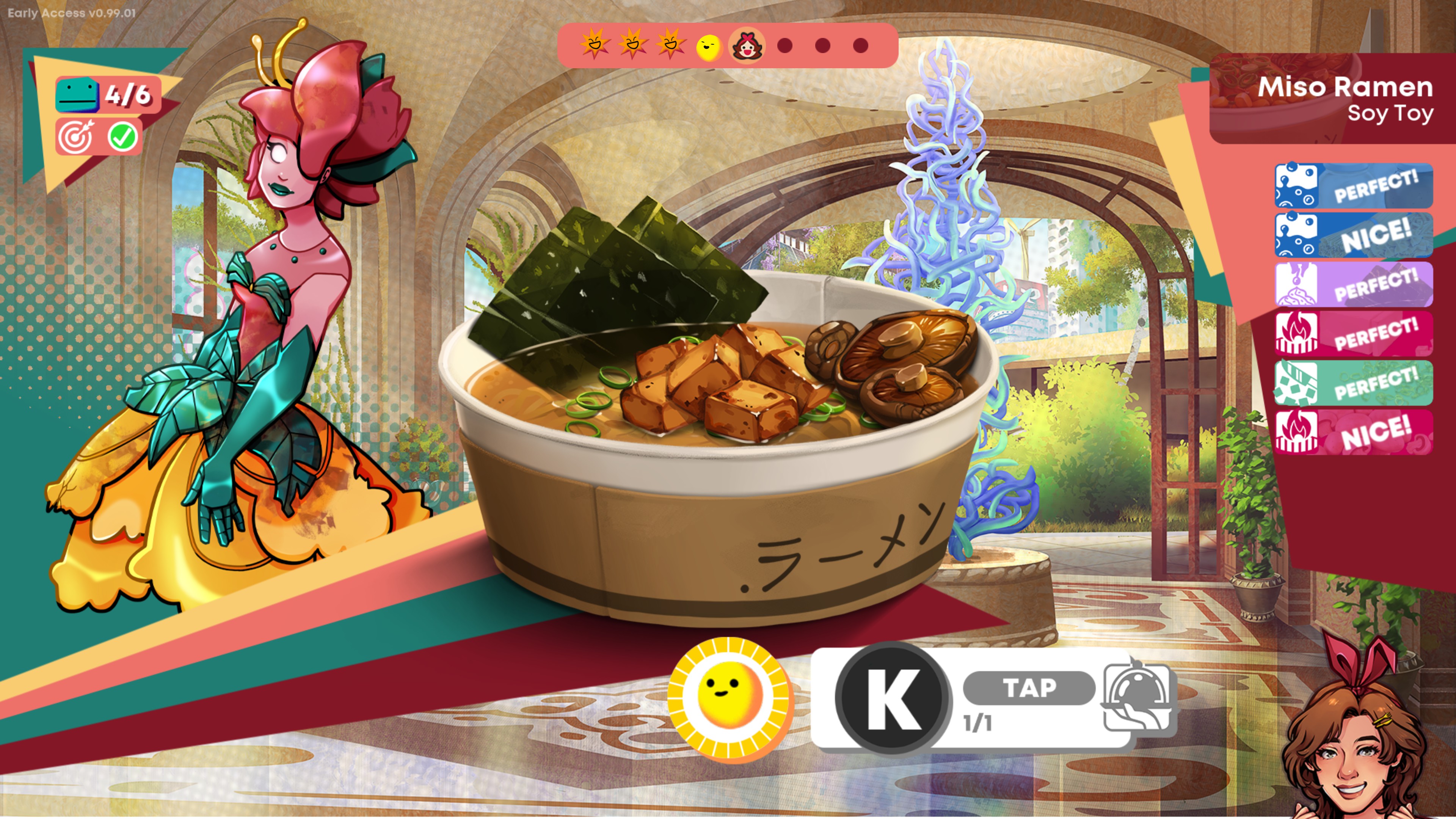
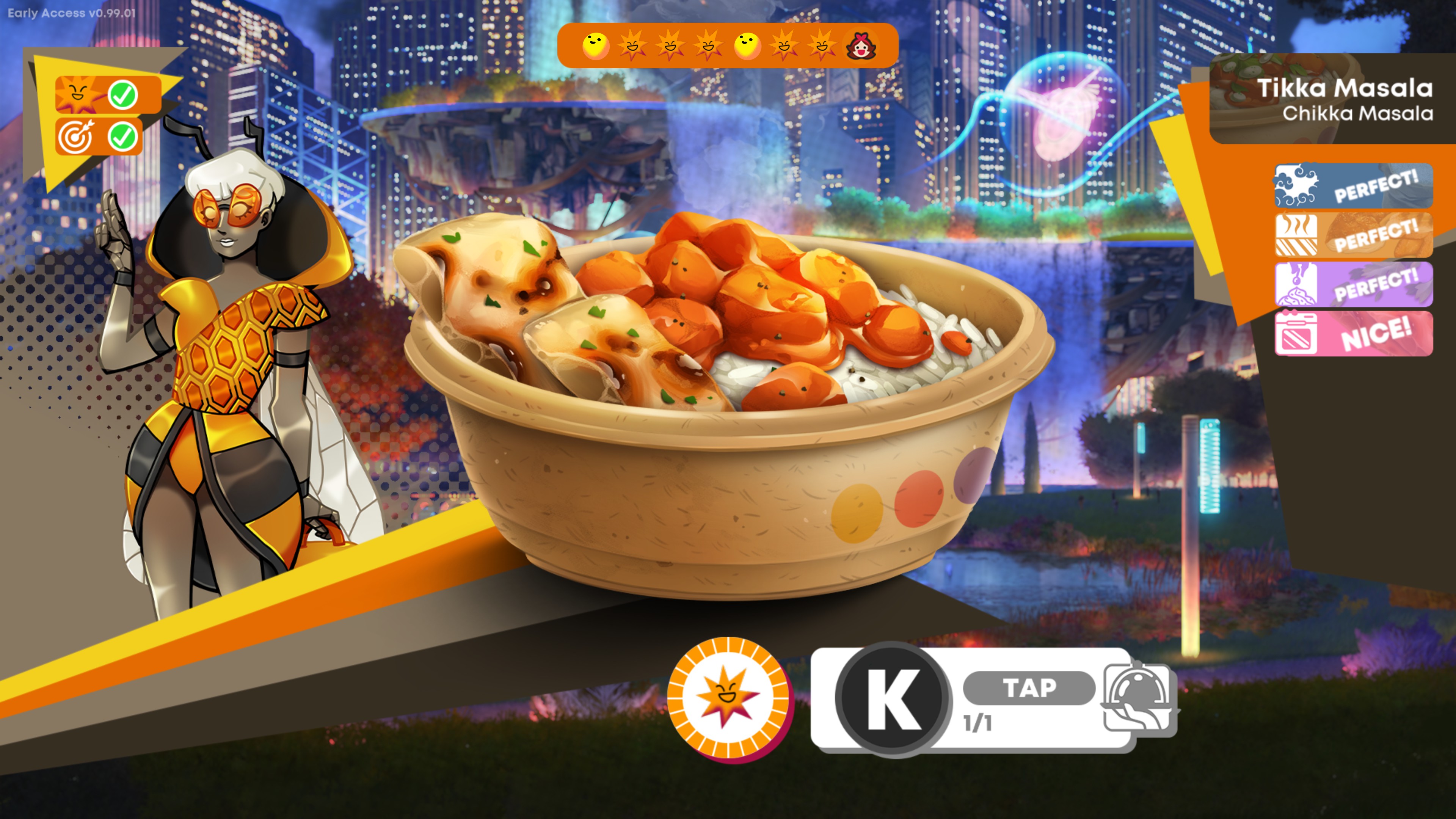
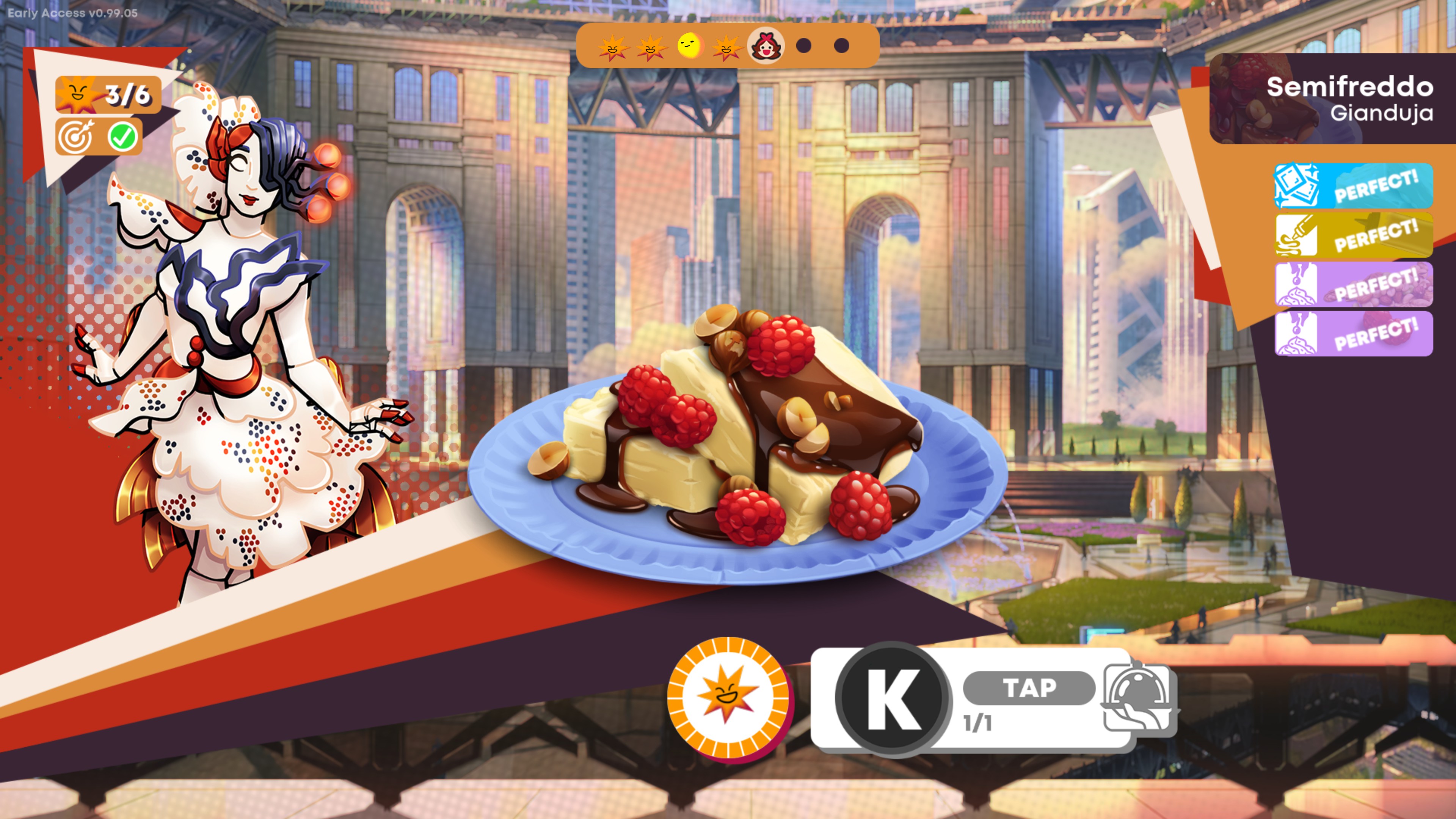
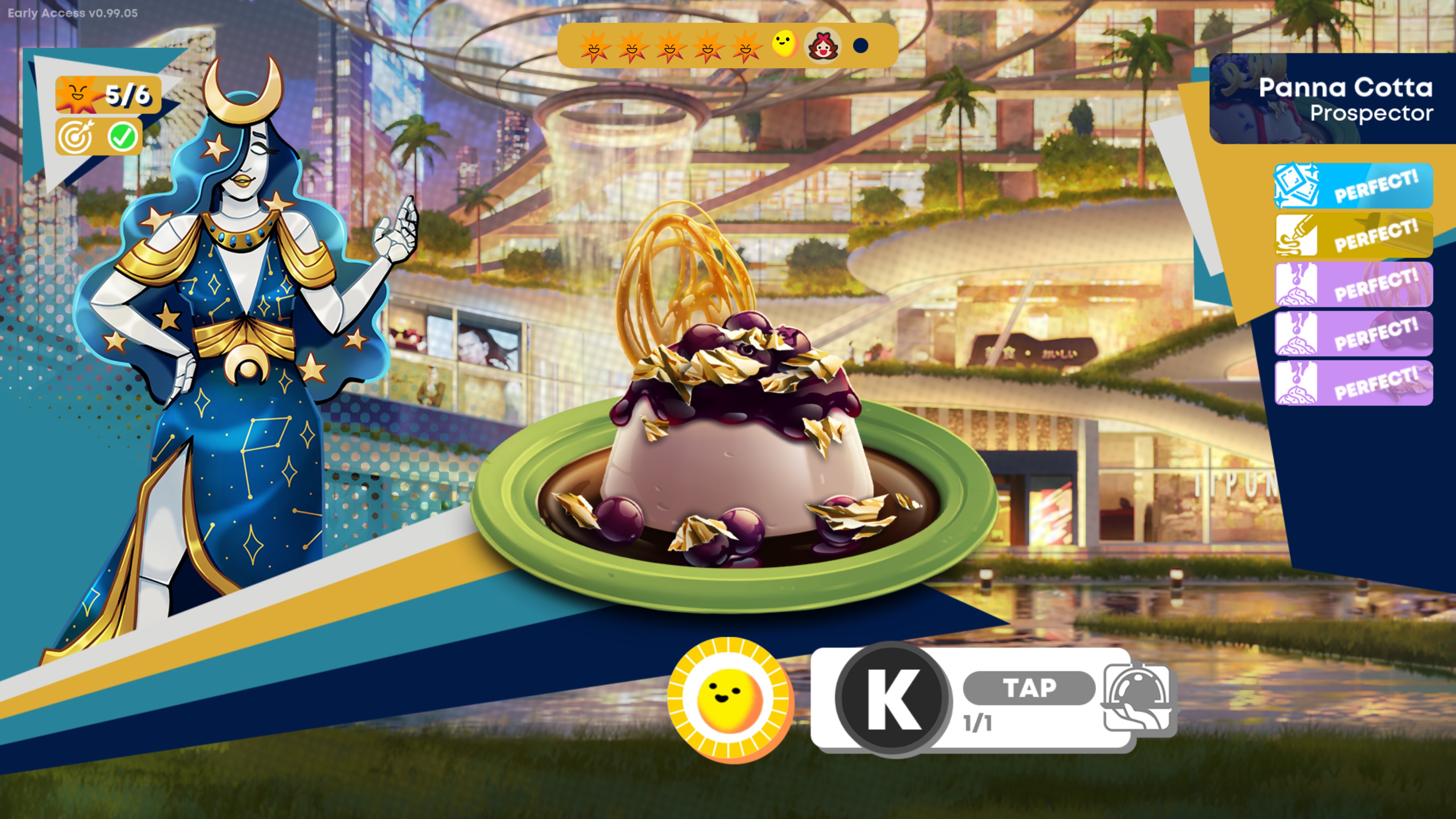
The locations are depicted by lavish paintings that transition from day to night through the course of a level. There's some impressive palette work here, just eye-popping color, and some real imagination in the futuristic structures we see in Helianthus:
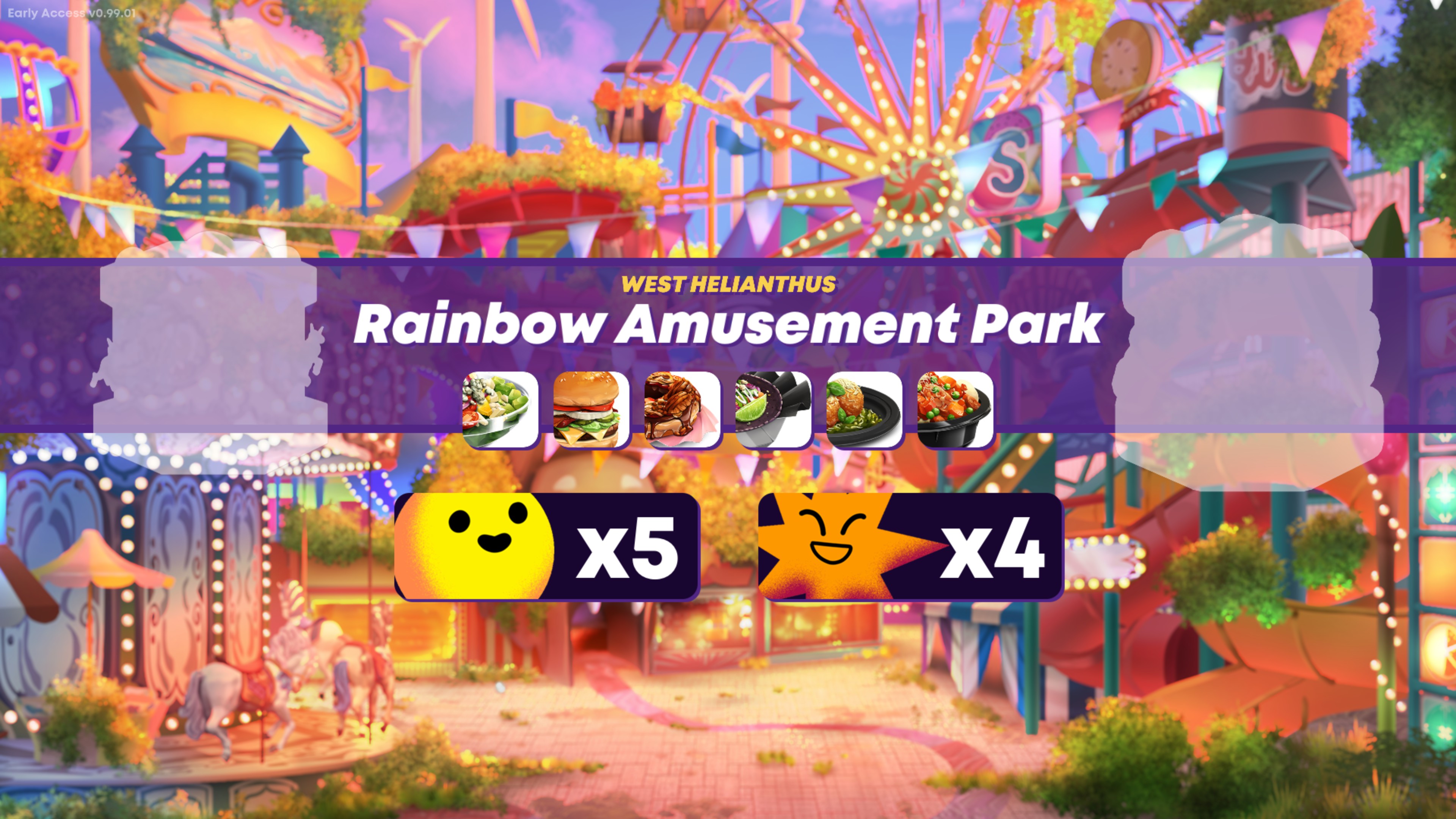
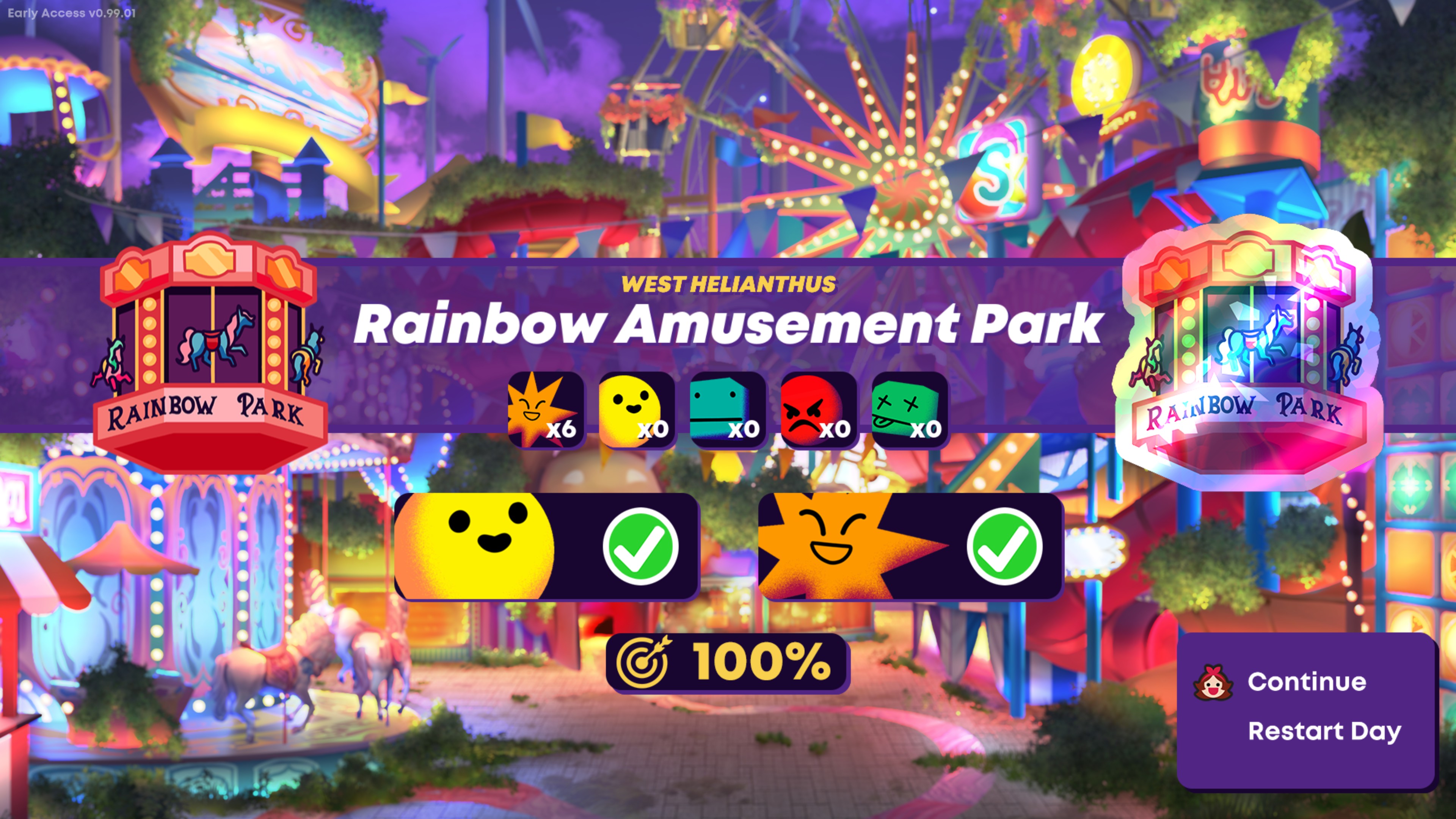

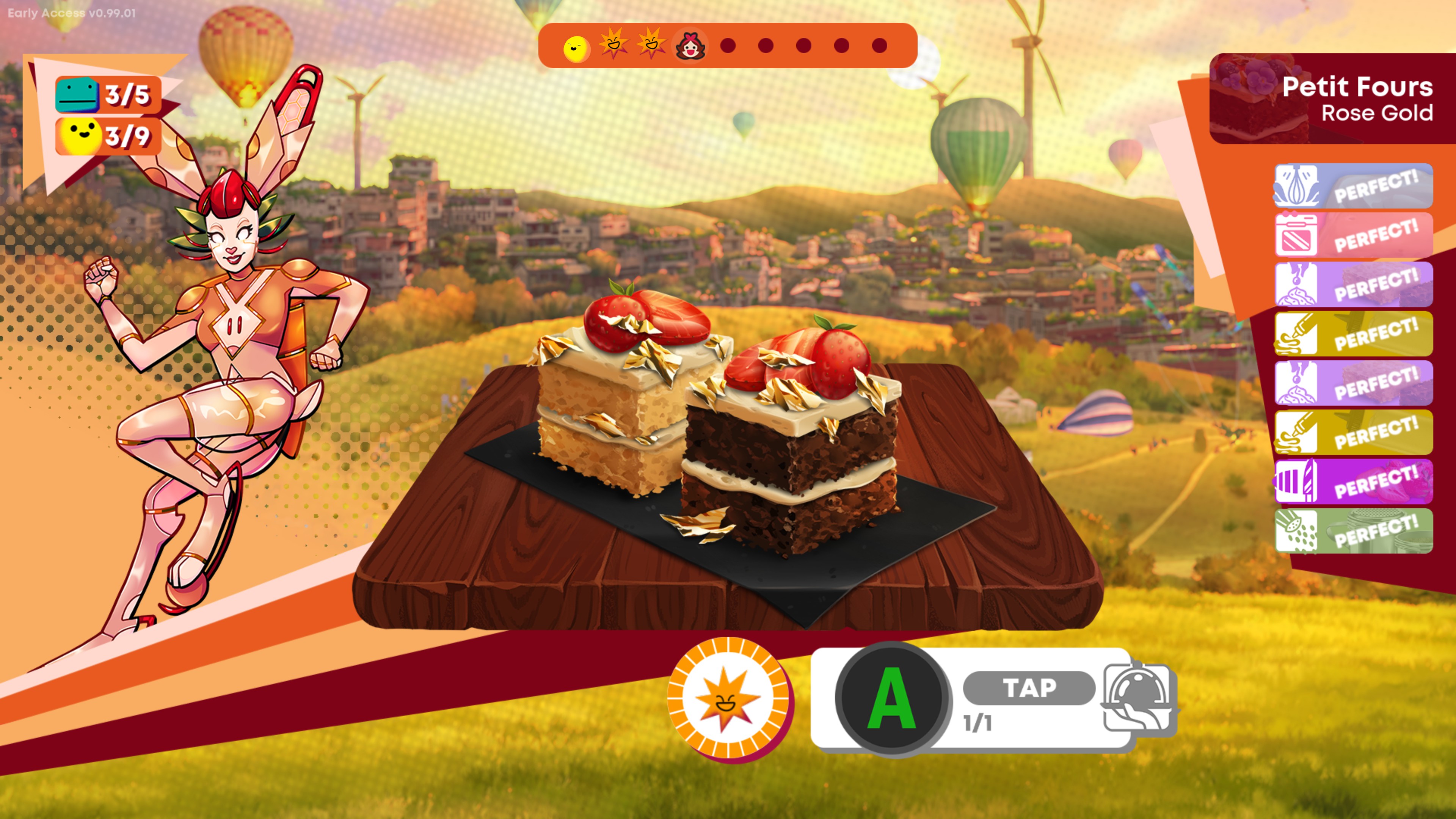
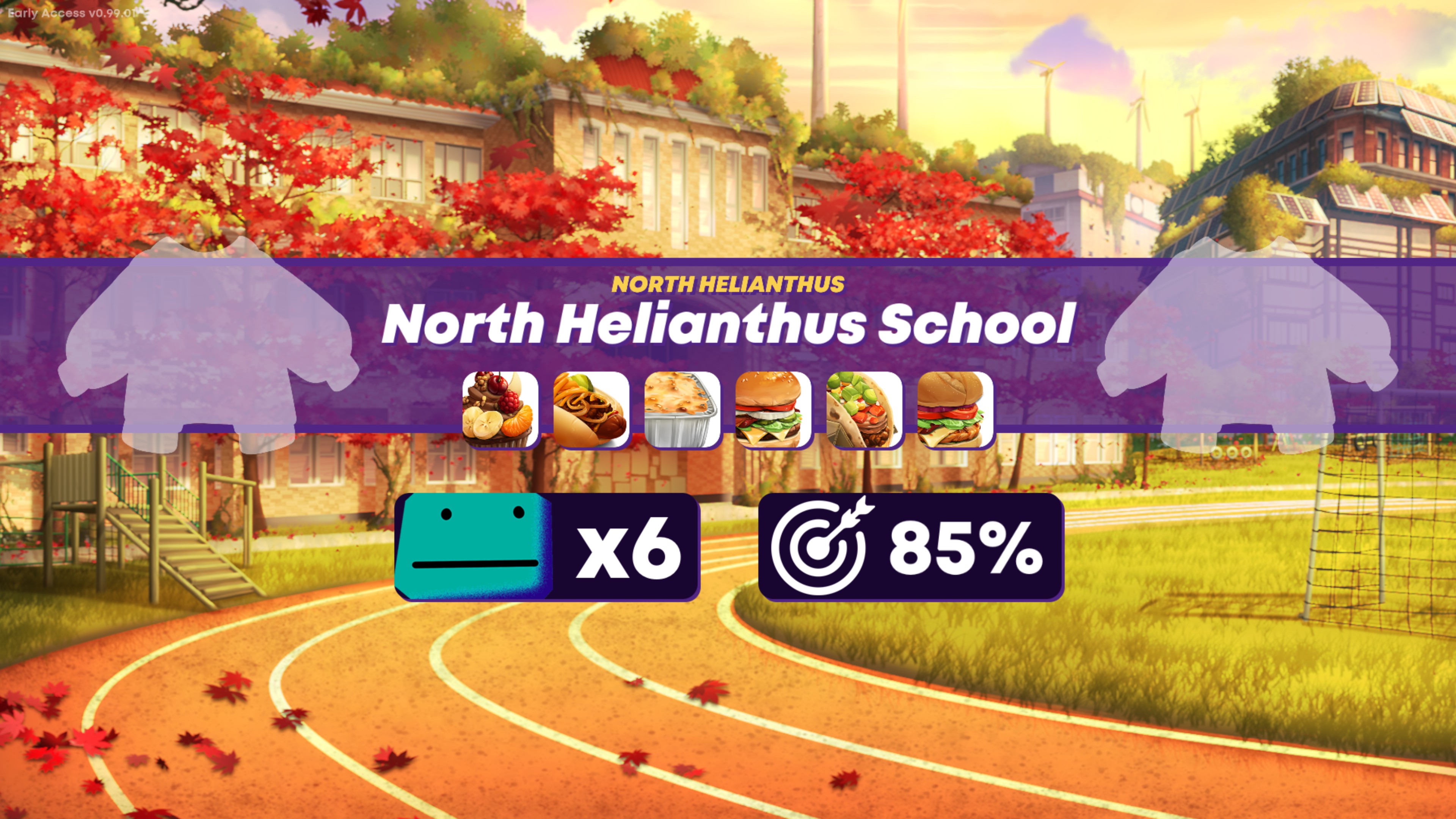
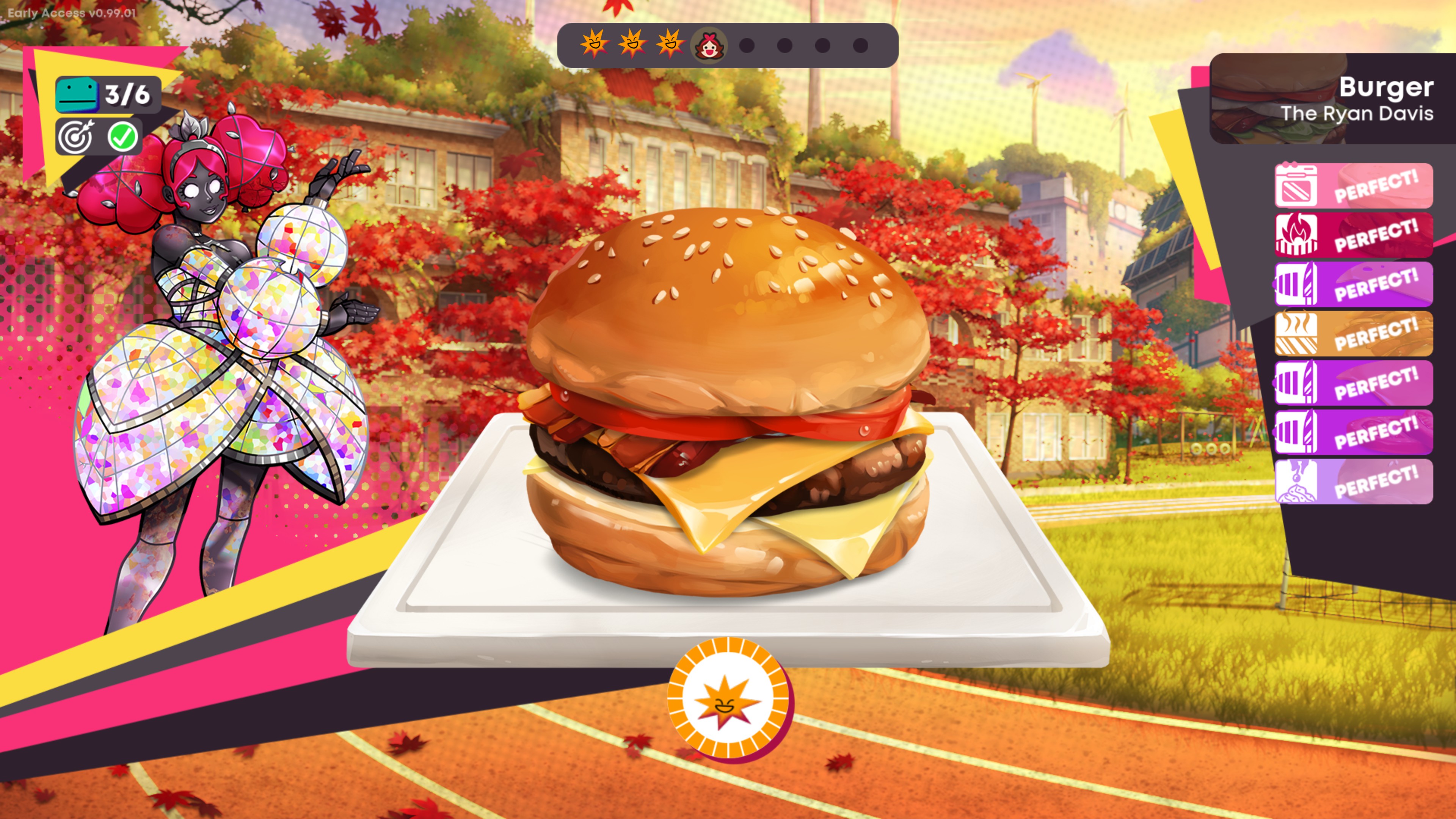
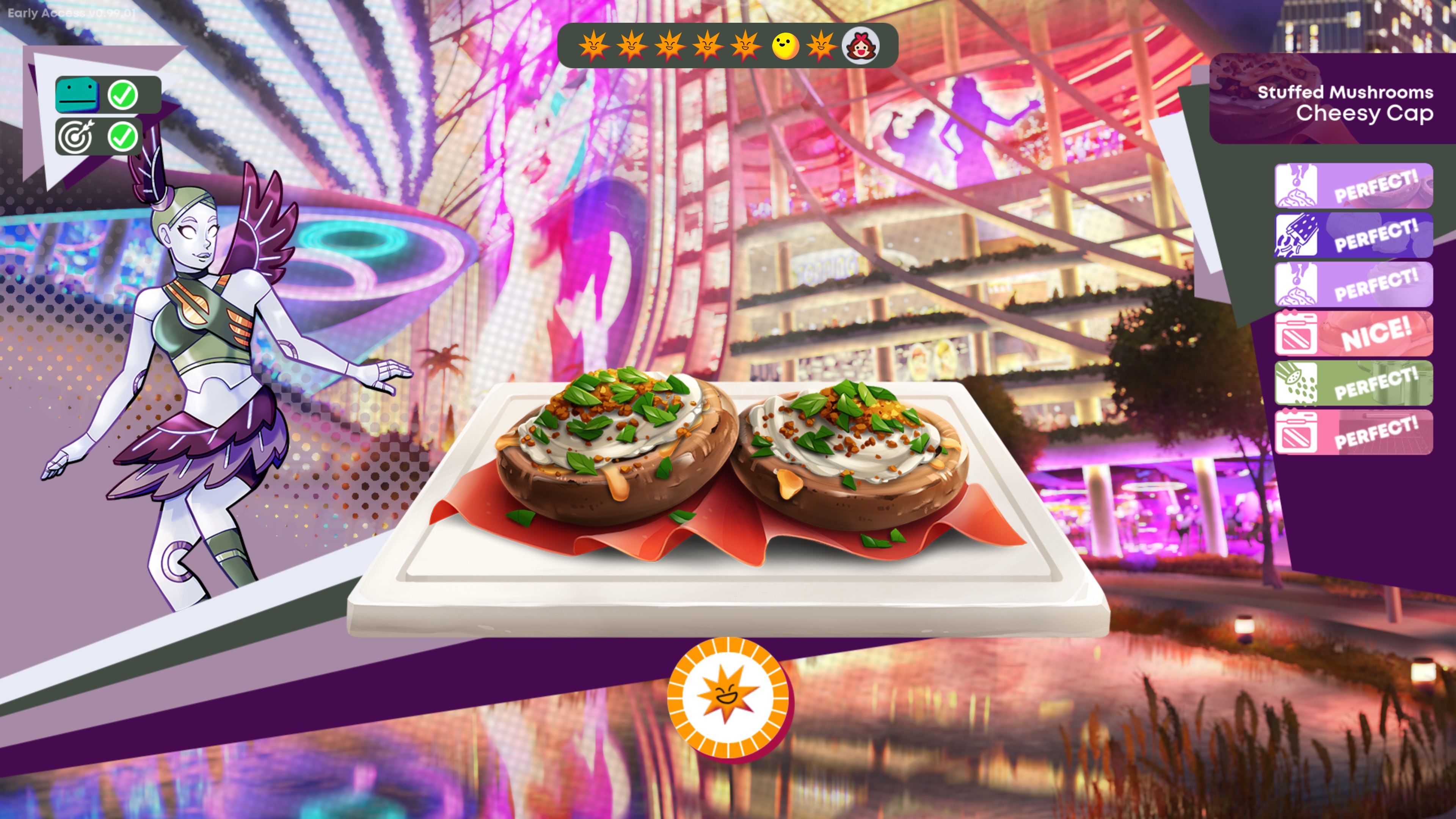
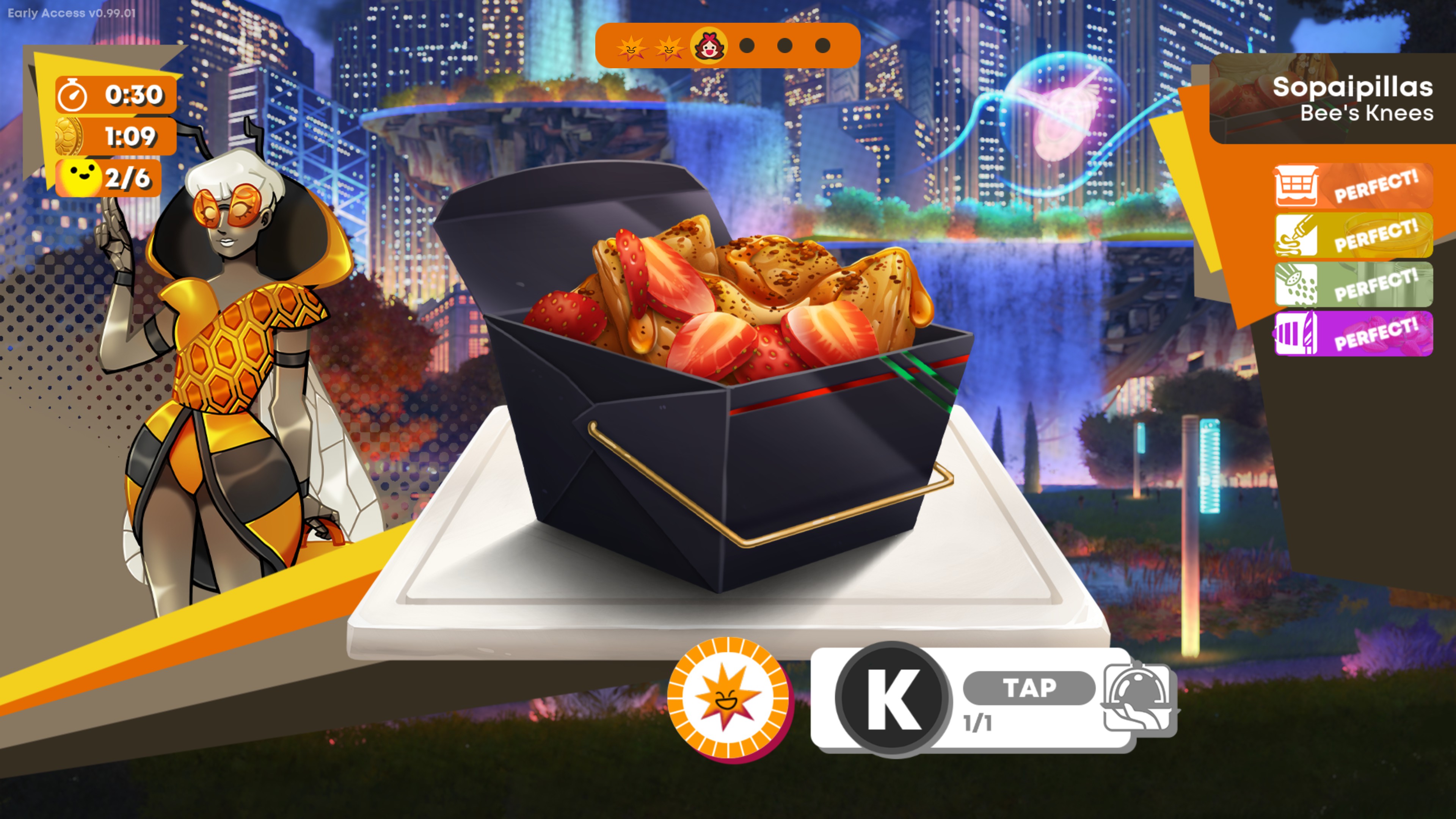

Yes, that's a lot of pics, but the visuals are perhaps the biggest triumph in the game. It's all still recognizable as the friendly, playful, food-centric CSD style, but with more polish, more visual imagination. It makes a strong statement about how much Vertigo has grown as a studio and how they're capable or putting more and better out there.
Music is still handled by the capable Jonathan Geer, but instead of a largely-instrumental score, there's a focus on songs and lyrics this time around. Geer has used vocals before in CSD, but in an intentionally-limited capacity: typically Simlish-style nonsense syllables ("non-lexical vocables," Wikipedia tells me they're called). This time, the vocables are in full English, and they're telling stories: fondly remembering old relationships that can never be revisited, or getting sick with body negativity/fretting and deciding to be, as per the song title, "Happy with Myself." They're bright and buoyant but not substanceless - and yet not so heavy they weigh down the proceedings or get in the way of the gameplay. I adored Geer's "It's Dangerous to Go Alone," the theme song for CSD3, and I'm happy to see more in this vein from him in the Cook, Serve, Delicious milieu.
Voice acting is extensive, and it works. The two lead actresses create likable, bubbly young leads. The supporting cast do their jobs capably, upholding the vibe of the game well.
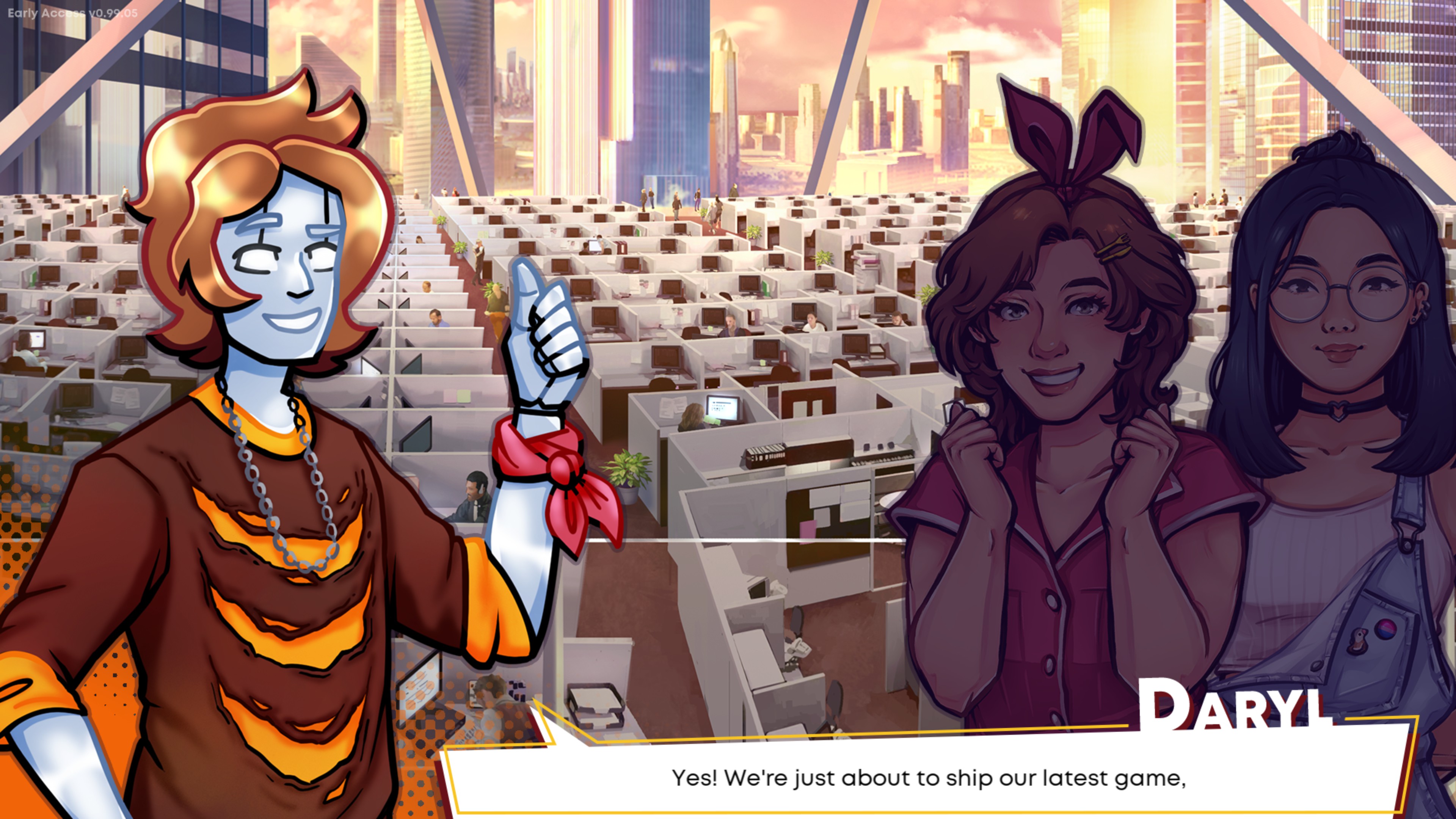
The only reservation presentationwise I could name is that a few of the robot supporting characters have art that's slightly rougher than the others. It's not unacceptable, but it is noticeable. As noted, I did play on an early access build (albeit literally the 0.99(.05) build), so this might be fixed in 1.0. Overall, though: great job, Vertigo, in making a feast for the eyes and ears.
Story
CSD 1 and 2 didn't quite have a narrative per se beyond expanding your restaurant, but the ridiculous state of the U.S. outside your eatery's walls, as glimpsed through offhand references in your emails and dish descriptions, was a consistent source of sardonic humor. (The U.S. had experienced a civil war resulting in most of the country not speaking to each other, with developments such as Wisconsin walling itself off from the rest of the country or Boston being declared an uninhabitable militarized zone - understandable if you've ever attempted to drive through Boston.) This blew up in CSD3, where you took a food truck through the landscape, driven by two cheerful robot veterans of the civil war - as all food trucks need a militarized escort in the post-apocalypse, don't you know - to reach a foodtruck cooking competition / grand prix and hopefully use the proceeds to rebuild your restaurant, blowed up real good after CSD2 in a recent fusillade.
The series background story sounds darker in synopsis and the spotlight: in practice, it's mainly a vehicle for the devs to make ludicrous jokes about our world to provide a laugh in between rounds of cooking, lightened considerably by the game's presentation - you can be only so dour against a backdrop of Jonathan Geer - the hecticness and high energy of the gameplay, and the genuine solace everyone took from food. It's about taking the ridiculous in stride, presenting it as the accepted background of the world, pressing forward and creating an oasis of joy through cooking.
Yet if CSD3 had the story fueling the gameplay more explicitly, Cook Serve Forever goes further in spotlighting the narrative, to the point it's been likened to a visual novel. Instead of your chef being unseen or a randomized player avatar, you're following the personal journey of a set character with an established backstory. Cutscenes between levels are much more extensive, with more elaborate production, animation, and voice acting. Instead of fueling the gameplay, the story's given an equal claim to the spotlight.
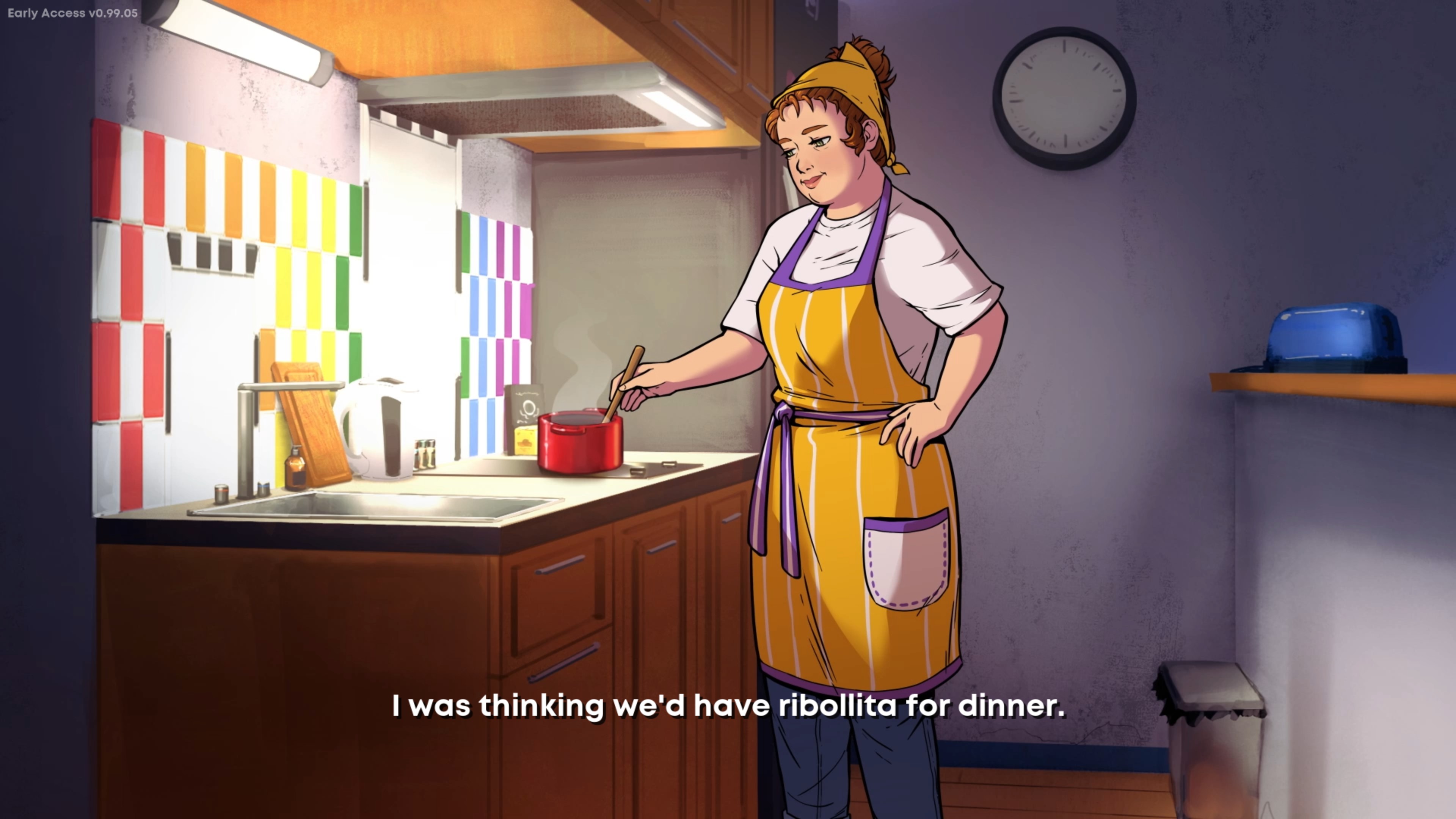
The plot: Food cart entrepreneur Nori Kaga grows up from poverty, trained on the home cooking of her adoring, hard-working mother but dreaming of winning three stars in the prestigious Couteau d'Or competition like her idol, the moneyed, self-impressed Chef Rhubarb. When her apartment is condemned, she takes her food cart and her busker girlfriend Brie on the road to Rhubarb's big-city digs of Helianthus. You can probably guess where the plot is going to go from those two sentences, and you'd be right - to a point. And that point is a huge one, a big meatball to tackle, so let's talk about execution first.
I've mentioned some of what I like about the story already: Nori and Brie are charming and likable leads and have good chemistry. Nori is positive, driven, and can-do inventive, eager to get along with those around her yet serious about her craft. Brie matches her partner's energy well but can be more low-key and thoughtful. I liked supporting characters such as the fatherly bodega owner Romero and the jokey, gentle greengrocer Baz who supported the young chef on her journey. The voice acting works well.
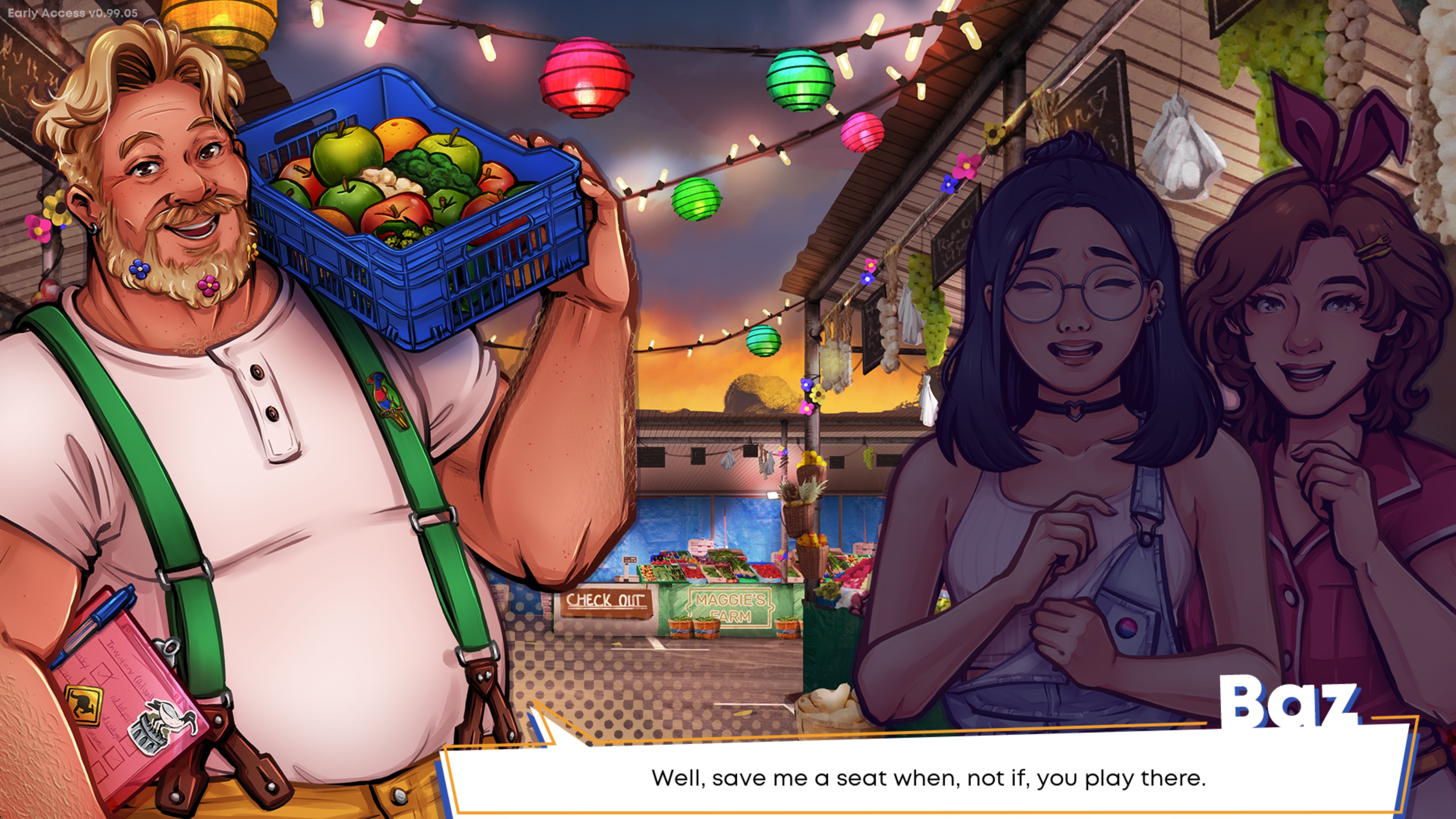
I will say, though, that I didn't feel Nori was really developing into a chef worthy of the most prestigious cooking competition in the world as she dragged her food cart across Helianthus. This could, actually, be partly due to how the series handles its dishes - see below - but there isn't a progression in the narrative of Nori overcoming various cooking challenges, learning new tricks from the various people she meets in the big city, etc. I'll also say that the story came across as a bit too nice, shading into bland in spots.
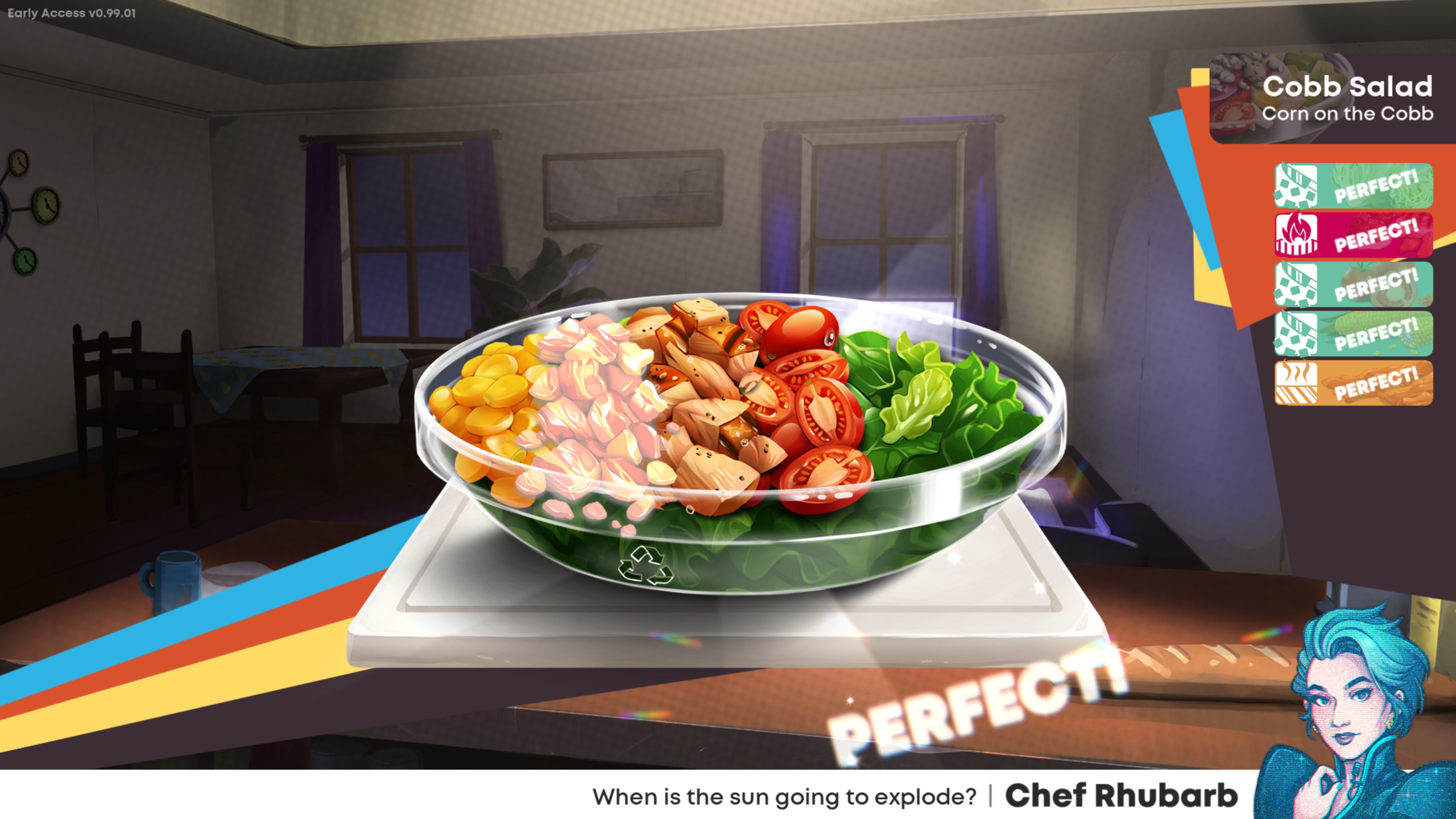
Then the game hit me with a subplot about, um, the sun imminently exploding. There we go; that's the Cook, Serve, Delicious I know.
This produces the game's best level, with Nori and Brie catering to a church of sun-worshipers, with an enthusiastic, loopy sermon in a cathedral open to the skies above delivered by the pastor on embracing the carpe diem memento mori the uncertainty of imminent demise via solar expansion inspires and using this crisis to appreciate better the sun's soon-to-expire light and "the warmest hug you will ever know." The pastor's gung-ho conviction and delivery underline that CSD absurdity, with Brie and Nori exchanging viewpoints on whether the parish's positivity is inspiring or unsettling.
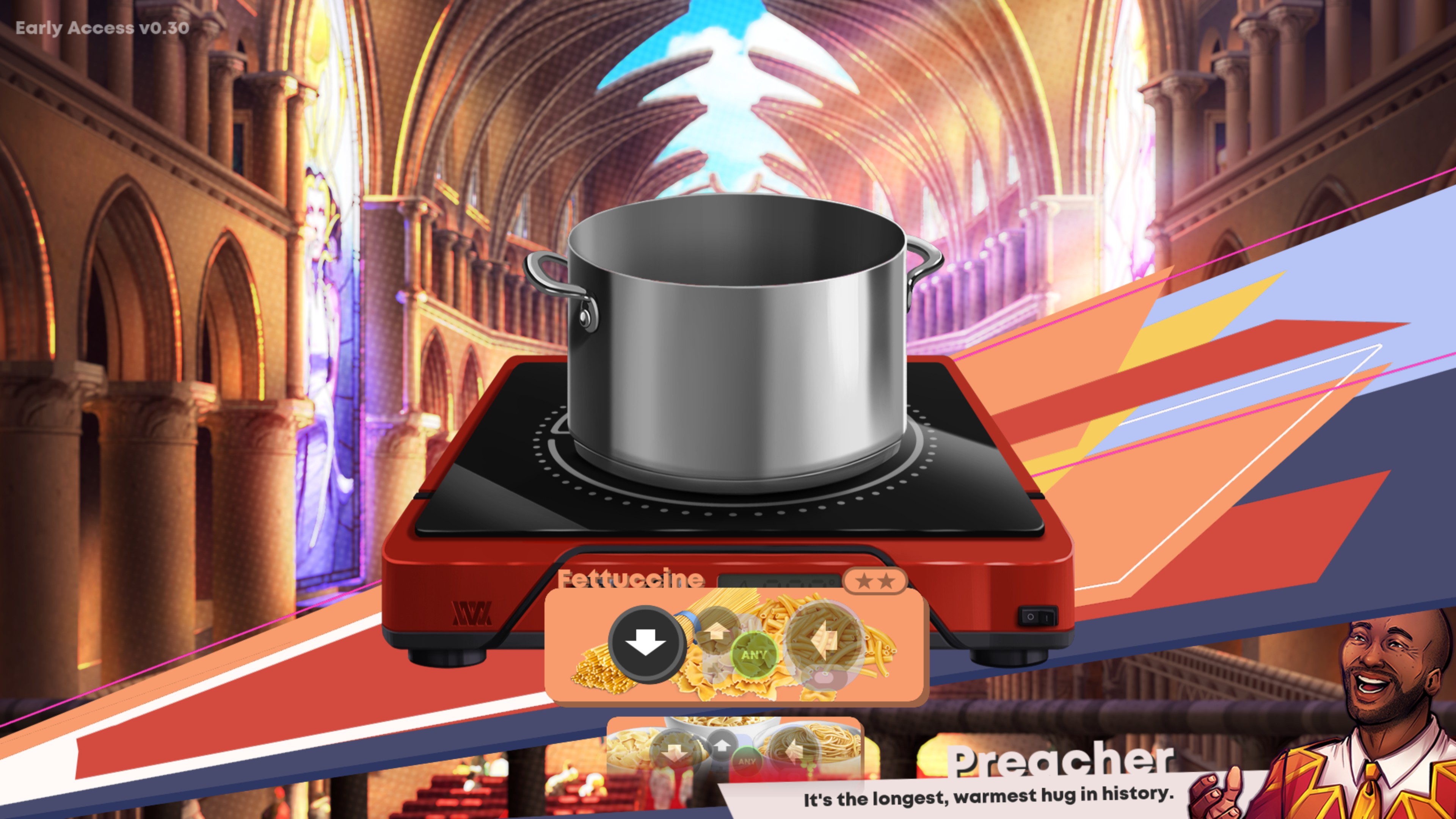
The ultimate destination of this plot is a matter for the ending discussion. Cook, Serve, Delicious, though, has always excelled at the smaller, glancing moments of storytelling, and Forever delivers some of these moments, many of them fueled by the sun going boom sometime. There's a level where the girls stop by an artificial chalet village crafted so that visitors can encounter winter - it doesn't happen anymore - where they enjoy the rare experience of snow. Or when the girls cater a seminar for a pyramid scheme run by a robot involving timeshares in an underground city which, as Brie notes, won't protect residents from the solar apocalypse ("I'm working on a plan to open it up to more working-class investors once we finish constructing the slums"). And there's a thoughtful bit where they visit an industrial park designed in harmony with the environment to provide livable working conditions, and Brie wonders if she would have ever become a musician had she grown up there - if she wouldn't have been happy to be, say, a machinist in a place where all labor was made safe, pleasant, and rewarding. And at one point, as the girls watch the latest in a succession of news stories on solar doom, and Brie manages to take a bit of comfort in that at least humanity will all be together and have each other in the end.
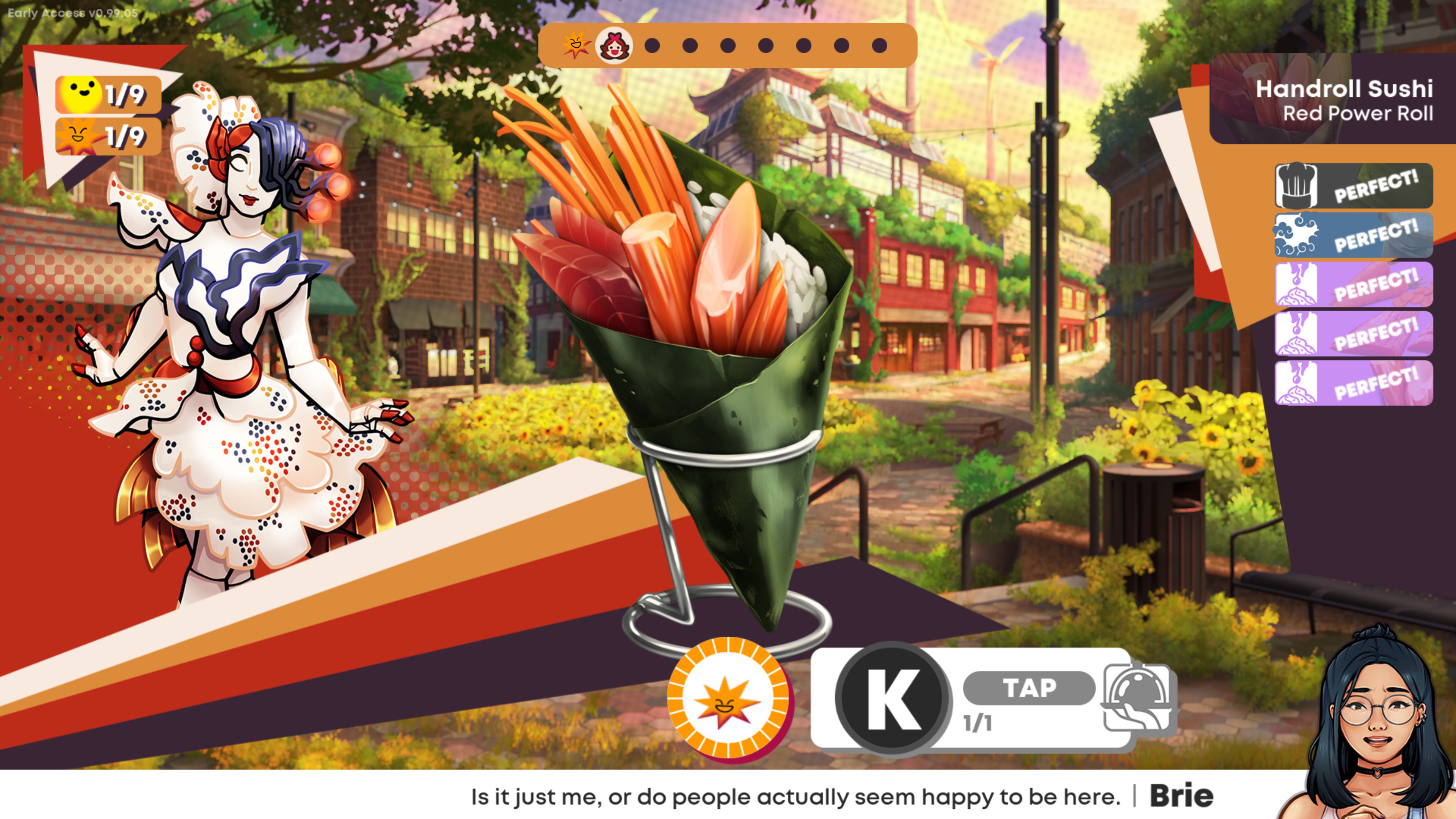
Again, a lot of this sounds dire or didactic in abstract, but it doesn't come across as such due to the presentation, barbed writing, and the sweetness of the two main characters. As with the rest of the series, the focus isn't on death and doom; it's on being human and finding something good in a ludicrous situation.
Despite those moments, though, and despite what happens at the end, the weakness of the overall story remains. Forever's likened to a visual novel; could its story uphold a visual novel of its own? I'd have to say "no"; there's not enough development, at least for most of its length. The game needs a strong partner in solid gameplay to stand on its own two feet.
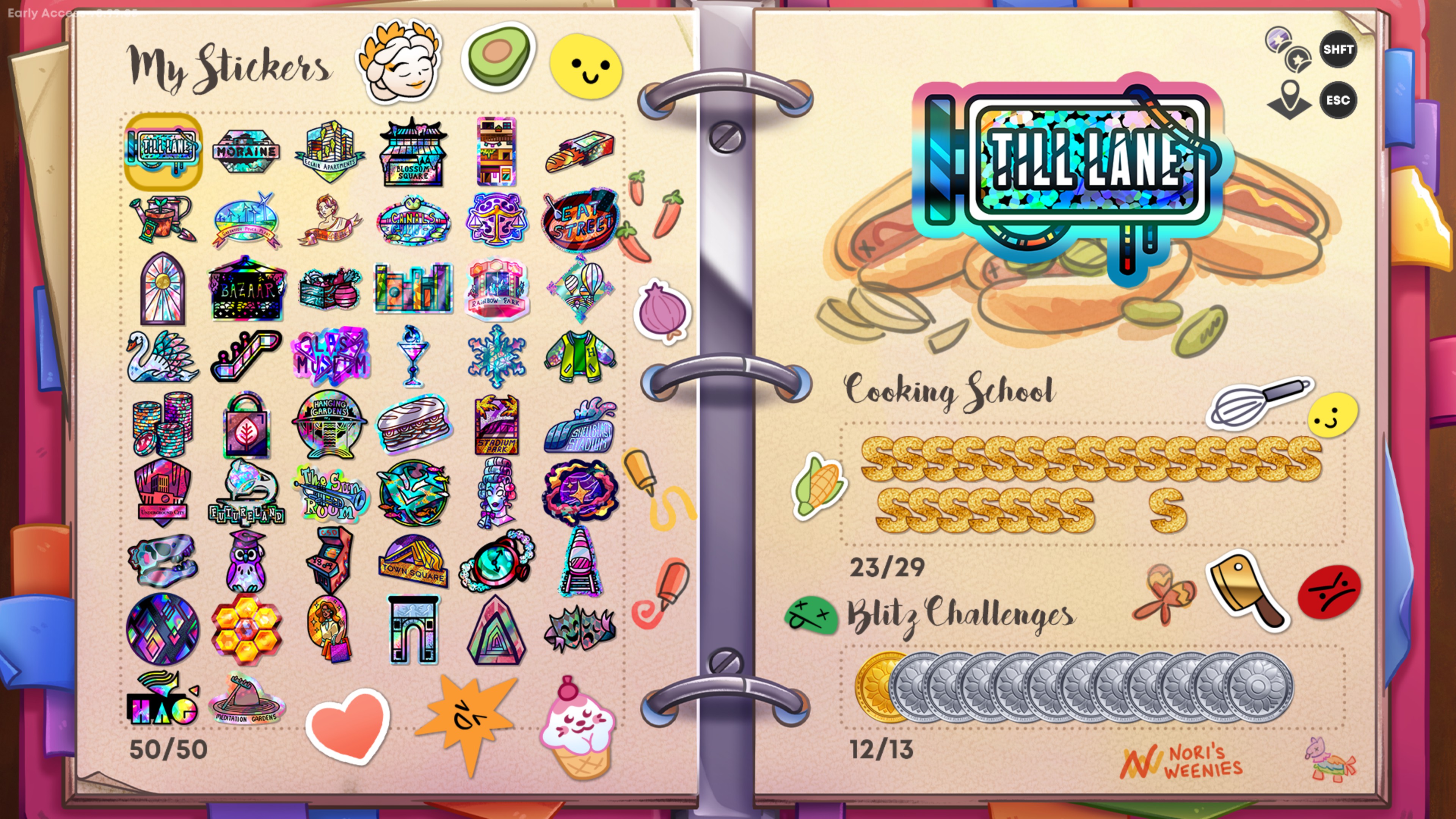
Gameplay
OK. Gameplay. Here we go.
If I had to describe Cook, Serve, Delicious gameplay, I'd go with "a typing rhythm game." You're operating some manner of restaurant or food service and preparing a number of short orders by typing keys that respond to various ingredients. There are tricks to each dish. Sometimes, the ingredients have to be assembled in a given order. Sometimes, the dish has to be left to cook for a period of time, with, sometimes, additional prep work after. Sometimes, there are timing-based stages of preparation (don't torch the crème brûlée too much, lest it burn!). Sometimes, you can make a whole batch of a food at once to sell to customers as they come in (cookies, pretzels); sometimes, dishes must be made to order. In addition, most of the dishes have a number of variants (think pizza with different toppings, sandwich fillings, etc.) that require slightly different inputs.
You also have to plan the slate of foods you'll offer each day to fulfill certain requirements: you might need to make a certain amount of cash in games with a money system (with fancier, more complex dishes typically commanding more bucks), or fulfill certain difficulty requirements for a competition, or serve cuisine appropriate to a given venue (no corndogs at your five-star restaurant). Serving the same dishes each day will bore your customers, so you can't coast on old standards: you need to switch things up. There's an added element of strategy in the order in which you choose to tackle dishes: it might be smart to knock out a bunch of pretzels while those stacked enchiladas are in the oven, but it might not be the best idea to start preparing a finicky sushi order when you've got five other customers about to walk out the door. There's a heavy timing element, too: customers don't have infinite patience, dishes can burn if left in or on the stove for too long, "batch" foods will eventually go stale. (Some games let you turn on "infinite patience" in exchange for fewer rewards and/or a ding to your rating.)
This is a lot to juggle - but it becomes extremely gratifying! It's an excellent marriage of two halves of gameplay: the "cooking" is very dynamic and in-the-moment, but it has an intellectual element of planning and preparation, with the in-the-moment decisions you have to make about when to do what providing a bridge between the two. The system delivers both action and a mental challenge, and as you learn to touch-type recipes, you get into a state of flow and rhythm that's viscerally satisfying. And the element of player choice allows you to adjust gameplay to your liking and strengths to an extent through dish selections and priorities, as well as just to do dumb stuff - you can do an all-fryer menu, or an all-Italian menu, or a completely lazy corn dog and pretzel menu...whatever you like.
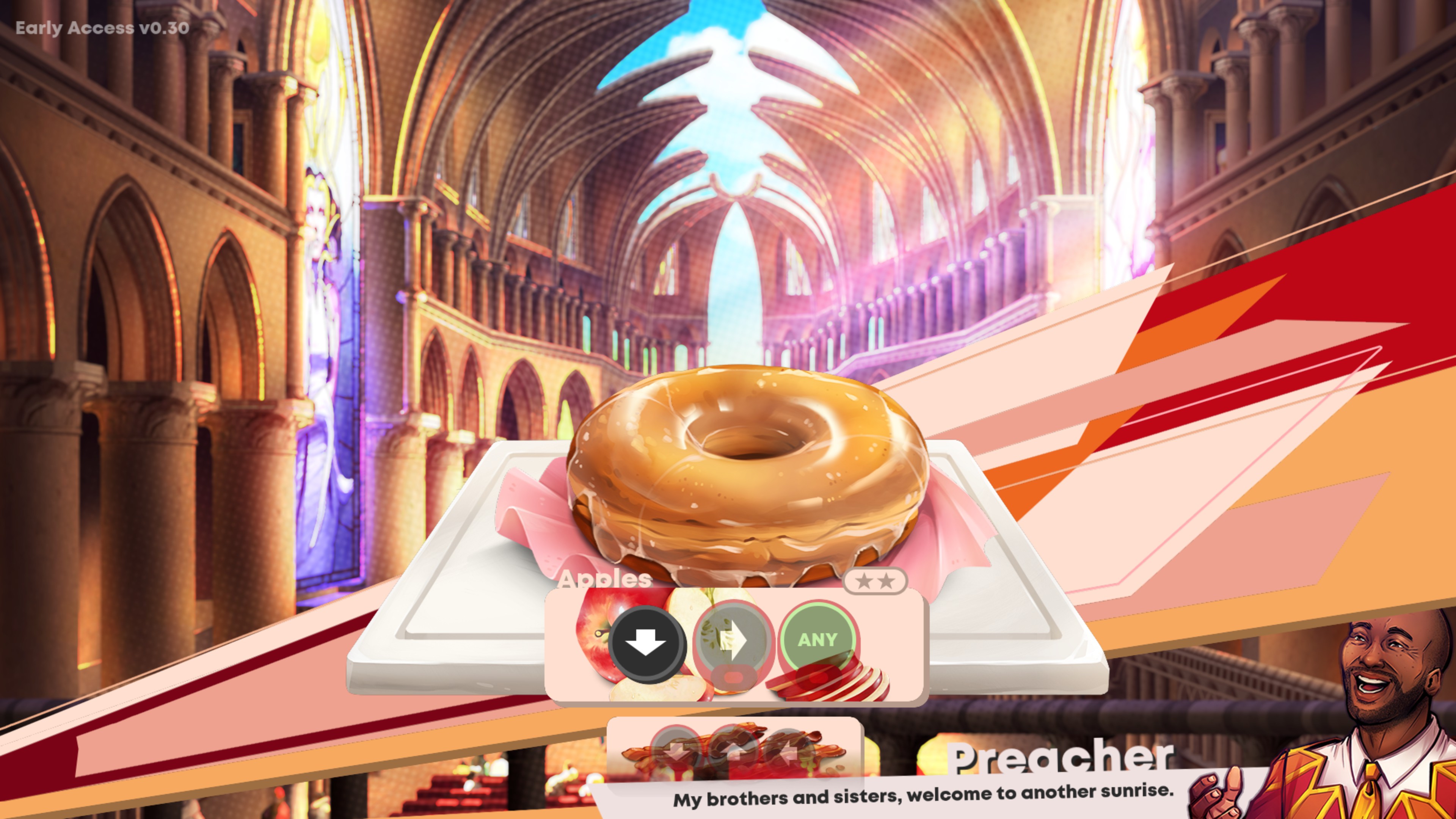
OK, on to Cook Serve Forever. In that post I mentioned, Galindo stated that he wanted not only to switch things up but make something more accessible. So, initially, CSF jettisoned the previous system for something that, to me, played a lot like Simon. Recipes no longer had reliable inputs; you instead copied a seemingly somewhat random series of prompts that appeared in a little box at the bottom of the screen. The inputs didn't appear to correspond strongly to what you were doing cooking-wise, and with the random element, you couldn't memorize or get good at recipes. What's more, players could no longer choose menus or the order in which to tackle dishes; everything was on rails, and the strategic element of previous games was gutted. Gameplay was, honestly, not much beyond a succession of QTEs - and with your eyes glued to the bottom of the screen for prompts, you couldn't appreciate your handiwork coming together. The connection to the food was gone.
(You also couldn't use a keyboard; controller was mandatory. Folks did play the previous CSD games with controllers, bless 'em, but I would no more tackle Cook, Serve, Delicious with a controller than I would, say, The Typing of the Dead.)
As mentioned, this system wasn't received well, so later in early access, CSF's current gameplay system was introduced, and it revolves around two entirely new approaches to CSD gameplay. First off, food prep isn't centered around ingredients; instead, it's based around the processes of cooking: boiling, chopping, baking, etc. Instead of a huge succession of short orders, you're preparing a small selection of dishes with painstaking attention to each prep step: holding down a button to simulate the wait for baking, or pressing WASD repeatedly in succession to mimic the circular motion of an electric beater.
The second approach, uh, requires the player to execute different motions with each hand simultaneously.
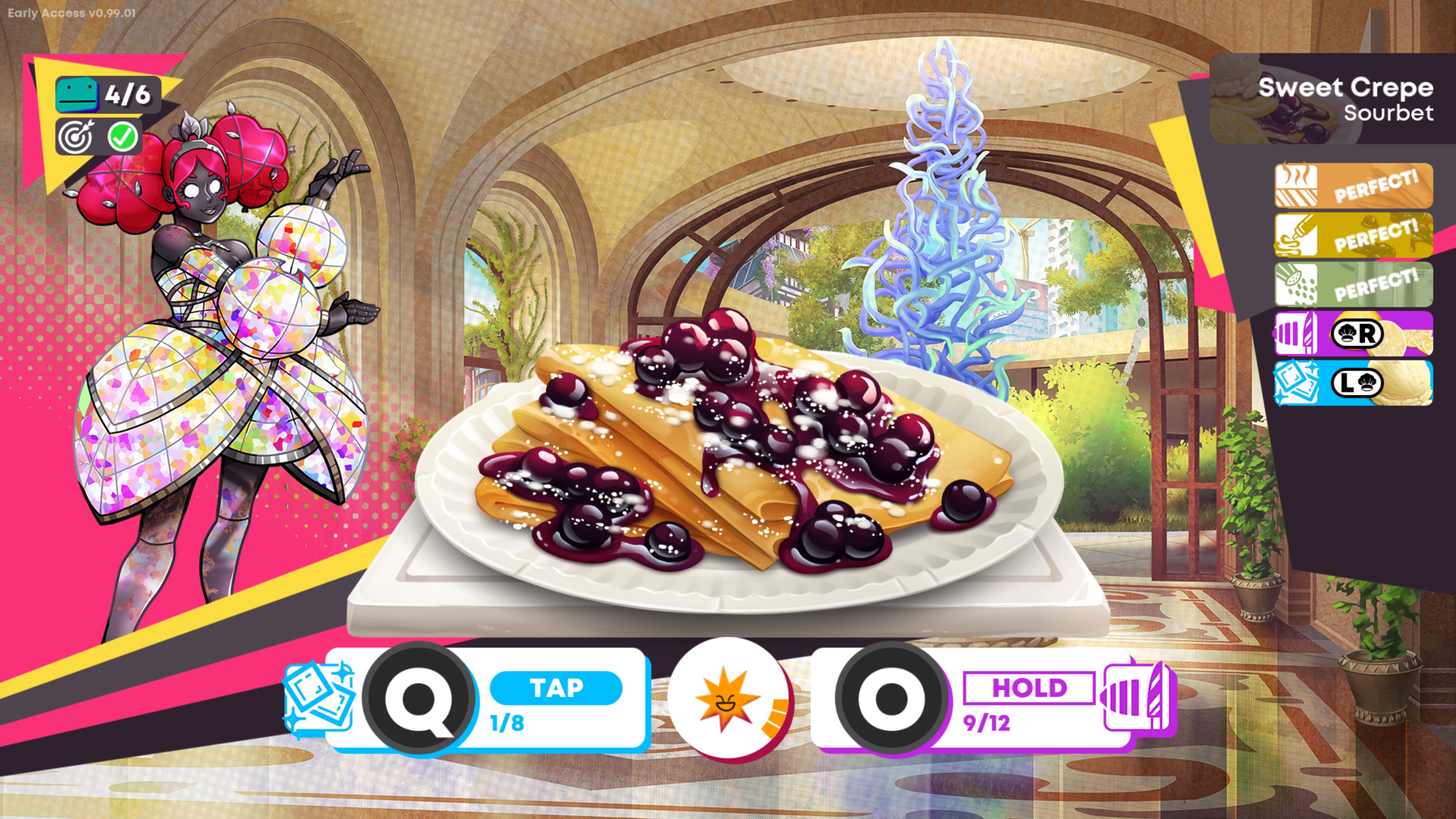
The two sets of key prompts you see up there? You're meant to input the ones on the left with your left hand and the ones on the right with your right.
Uh...huh.
This is, as they say, a lot. I haven't run into a system like this in any other video game ever - likely with good reason. It's not unlike patting your head and rubbing your stomach at the same time. I'll be honest: I had real problems with this mechanic at the start, and I'm an enthusiastic veteran of this series.
I gave it the old college try, though, and with patience and experimentation, I found ways to negotiate it. Hey, I can get in two chops or three grates for the length of time I have to hold down this key to grill. If I time finishing up steps so I do the chopping for both sides together, it's actually quite fun! Hey, maybe this system doesn't actually mean for me to do two things at once! Maybe it just wants me to organize and prioritize actions, like the previous games - just with keystrokes instead of entire tasks.
...Then I hit the Rally stages, sporadic roadblocks where the goal is to prepare a small group of recipes as quickly as possible (with no penalties for missed keystrokes, unlike the main game)...and it's clear in some of them that the only way to get gold is to do both sides simultaneously at top speed.
As I've mentioned, I've tackled the greatest challenges this series has previously had to offer. This double-fisted gameplay style, though, never really became second nature to me, and while I finished the Rally stages quickly enough for the achievement (get all Gold or Silver medals), I could seldom perform at the level required for the Gold. I've seen people saying that the new approach is much less demanding and better-suited for new players. Either these folks are under the impression that the old, initial system from the earliest Early Access release is being used, or they haven't gotten very far in the game. (In addition to the basic gameplay hurdles, the accuracy and speed demands of the final levels are downright murderous.) I honestly feel that this system is going to be too much of a difficulty bump for the new and casual players Vertigo is seeking.
(Now, there's a kicker: That high difficulty? Well, in a way, you don't have to engage with it if you don't want to. You can just mess up a lot, get the orders all bad, and muddle through the game. The stage requirements are only for those going for achievements and holo stickers. (In fact, reflecting on the game's themes, it strikes me that making achieving stellar performance miserable might be intentional.) If a game has design issues with which players are struggling, however, I don't think making strong performance optional is preferable to, you know, fixing the design issues.)
The two-handed system's not without interest, and if you're going to do something like this, your visual novel departure is the place to do it...but I don't think this is an improvement on the traditional CSD gameplay, and I hope the series doesn't use it in the future.
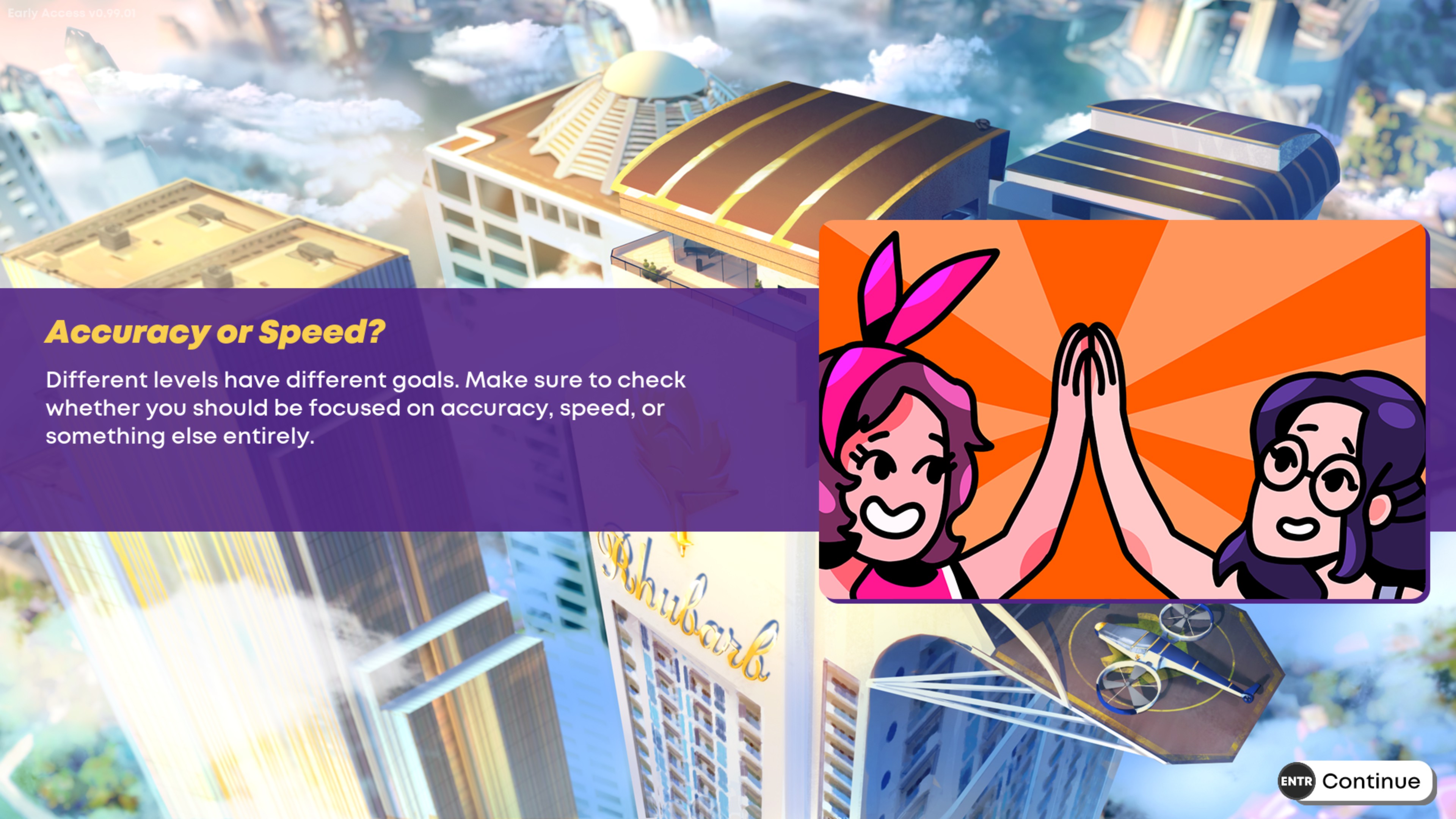
Now, let's go back to that first major change for a moment, the focus on cooking processes instead of ingredients, because it carries its own problems. CSD is an abstraction of cooking, and to a layperson, it's easier to connect to ingredients and identify a dish by what it has in it than by the mechanisms which that food is prepared. I mentioned that part of the fun in traditional CSD is acquiring muscle memory for certain recipes: getting down any timing element, knowing how they can vary, and knowing when it's best to tackle them in a given workday. This leads to satisfaction both emotionally (the visceral groove of banging out a dish) and gameplaywise (being able to perform well).
Under CSF's system, it's just not feasible to master a recipe, as they all have so many steps - up to twelve, with each step requiring up to 20 button presses or more. That means that you still have to keep your eyes focused on that little box at the bottom of the screen to know what to do, as you'll very seldom anticipate the next step or what you have to do in it - and you still wind up alienated from the food as a result, as you can't watch the dish come together. (I appreciate that the game lets you pause before serving a dish to see the ultimate fruits of your labor, but it's just not the same.) While the new system is substantially overhauled from that very early access build, it doesn't solve one of its central problems.
And player choice is still severely restricted: you still can't build your own menu each day or decide when and in what order to tackle the dishes you prep. While I imagine this was meant to make things more simple, it really eliminates a lot of the strategy and fun of the game, serves (again) to disconnect you from the food, and makes the game feel like an assembly-line experience. Though the joy of cooking is spotlighted in Forever, the gameplay isn't really designed to express it here.
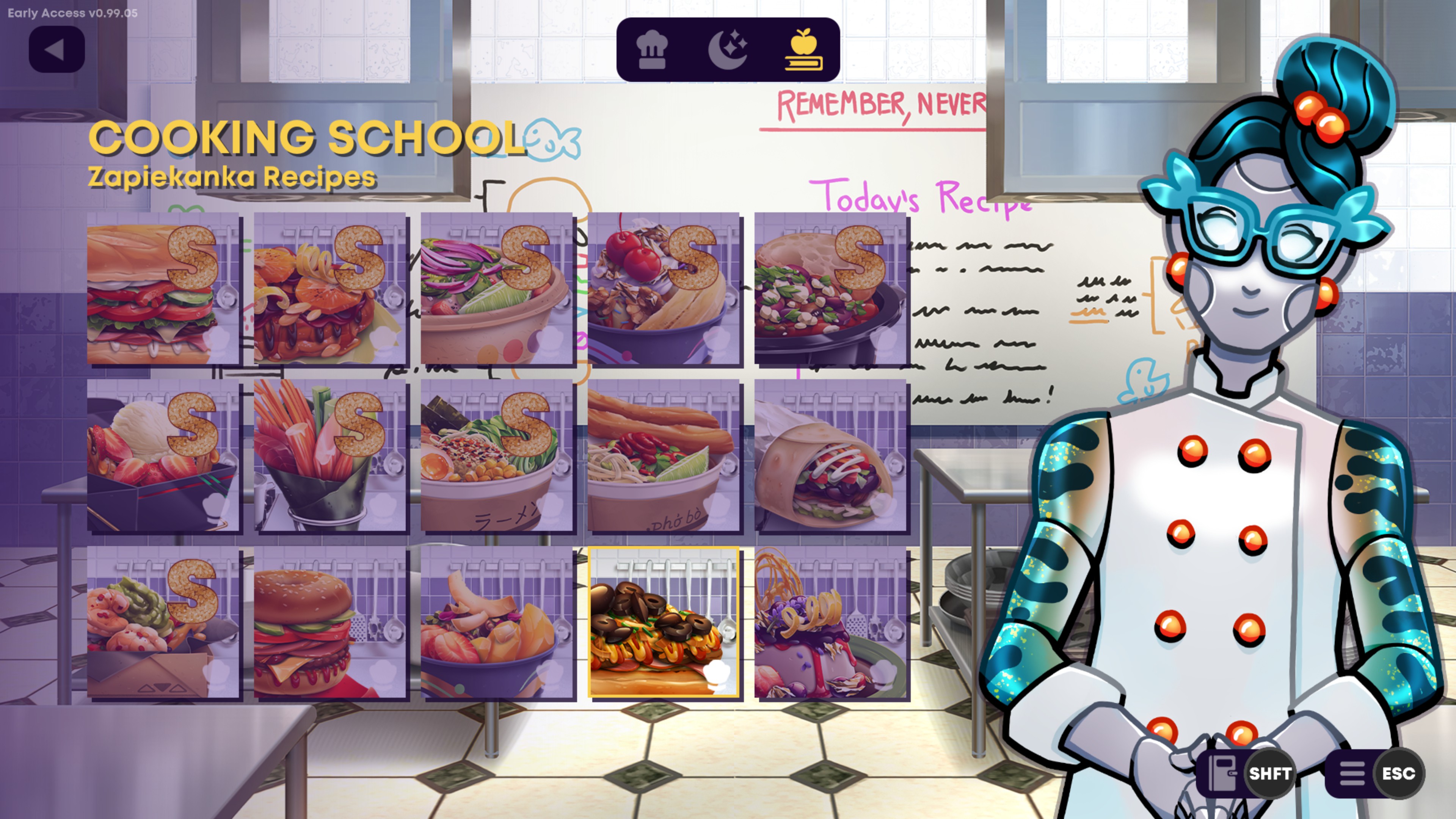
There's also a series of cooking school side missions that put you through all the variants of a given dish. It's an OK diversion, but it doesn't help to you learn a recipe, because these recipes, as discussed, as simply not learnable.
I can understand the problems they were trying to solve here and their thought process in attacking it. The flood of demands on your attention in traditional Cook, Serve, Delicious can seem, to some, overwhelming. How do you make a CSD game that doesn't present players with that font of stress? Well, reduce the number of dishes they have to make - focus on the individual steps to creating the dish rather than managing a deluge of orders. Turns out, though, that the various strengths of CSD's gameplay are interconnected, and if you extract certain elements like so many Jenga pieces, the tower collapses, or at least kinda slumps over.
I can't say I didn't get enjoyment out of the game. I did cotton to it enough to get holo stickers on every level. But I honestly think a lot of this, particularly the two-hands thing, is just going to be too much of an ask for a lot of players.
THE ENDING
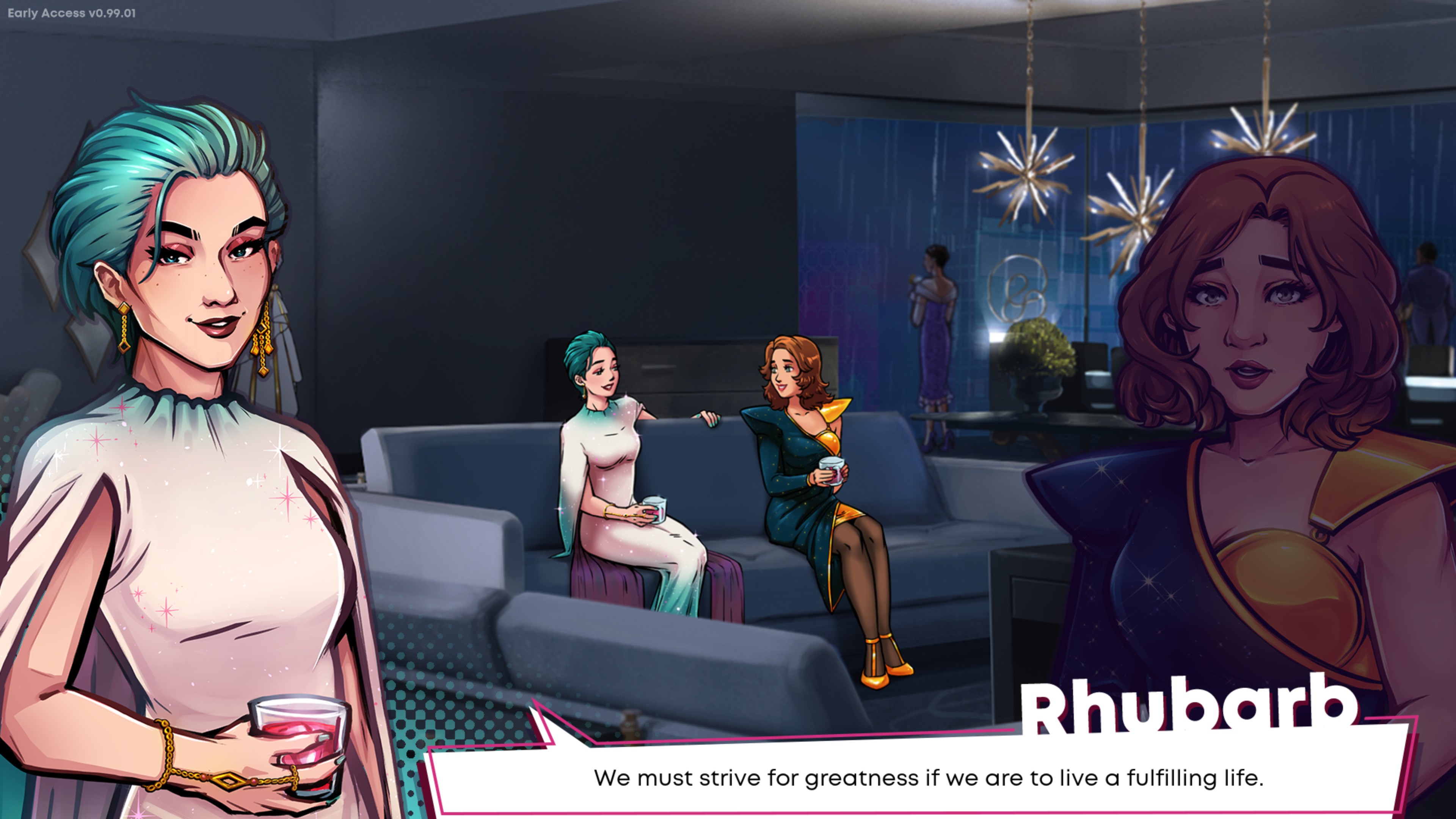
Looking back to CSD3, it ended up very much a game of its 2020 release date. It began with your chef's restaurant, renowned as the greatest in the world, getting blowed up good in some stupid conflict, then your chef hitting the road in a food truck, with two awesome bots/veterans of the stupid wars, across the fucked-up ruins of the country to win a food truck race and win the bucks to rebuild and pull yourself back up. It resounded in 2020 with the idea that the unexpected and horrible might happen, yes, but good can be found again. It wasn't overstated, and it was served with CSD sardonic humor, but it hit home. It was what we needed for the time.
Well, here we are, in the midst of another disaster. Instead of eventual resurgence and recovery, I think we all feel that we're likely not gonna make it out of this one. The worst is coming, and doom is inevitable. (FF7 to FF6, if you will.) What do you do? How do you approach life?
I'm going to limn the plot of Cook Serve Forever a bit further, then I'm going to get into full spoilers. I wouldn't usually do this for a title that technically isn't even out yet, but I think it's vital to assessing the game, as I think there are going to be some opinions on this ending. (The spoilers will be in white text you'll have to highlght, so don't worry about happening upon them by accident.)
Nori's cooking adventures take her into a part-time job at Rhubarb's restaurants, where, after coming up with an ingenious solution to a crisis, she comes face-to-face with Rhubarb herself, who takes an interest in Nori and invites the young chef to a few social events. At the same time, Nori learns that her mom had a past in Helianthus herself, and she tries to track down some family history.
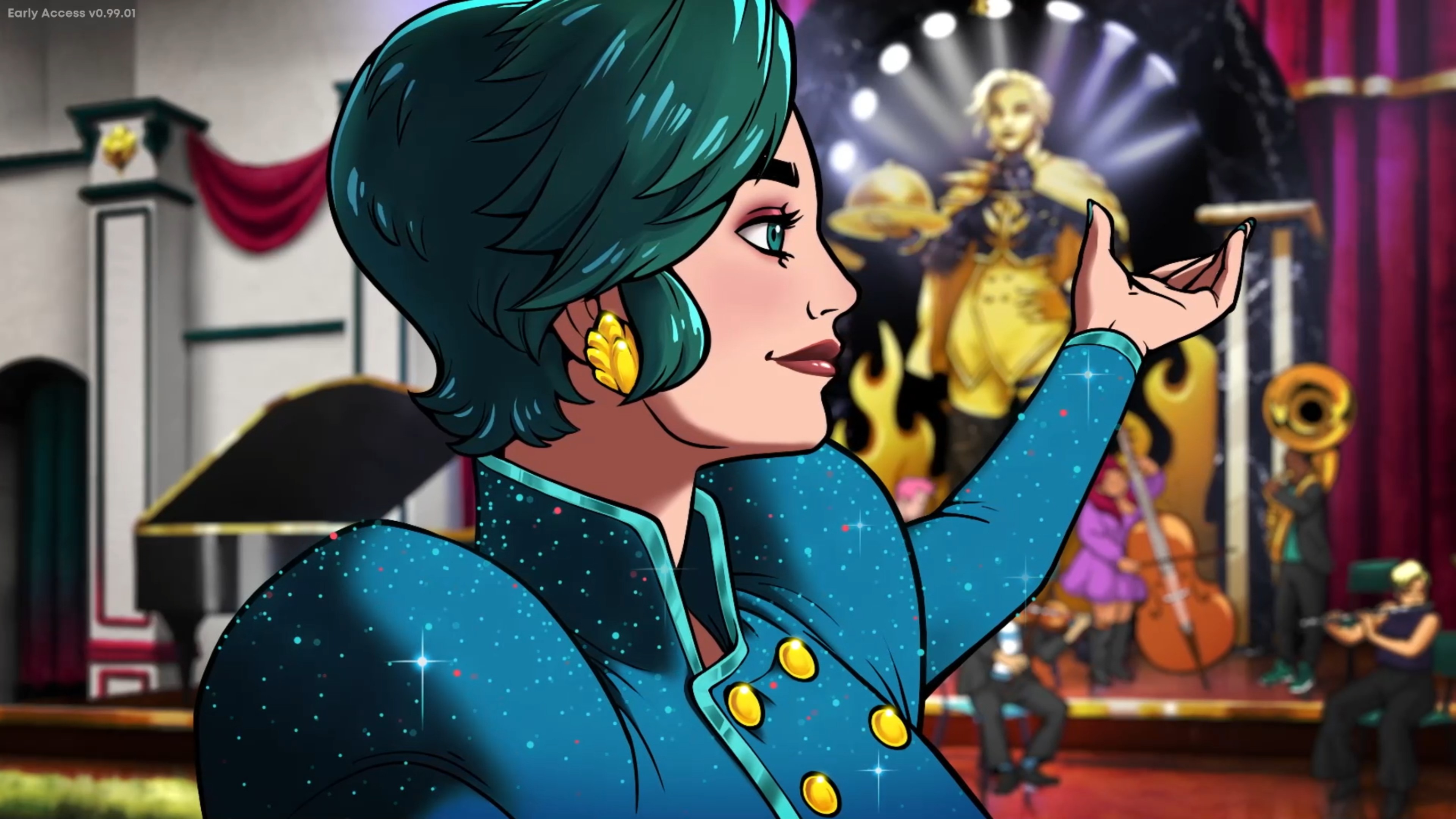
Rhubarb is the third figure featured in promo material, given almost equal billing with Brie and Nori, and she's a bit of a conundrum. The game initially seems to be setting her up as a figure unworthy of Nori's idolizing: she's perpetually self-impressed, we see her at times not being the kindest host on her program, and her sous chefs are petrified of displeasing her. She markedly never dips, though, into being a Gordon Ramsay, an outright terror: we don't see her berate her underlings; her obsession with self-image remains within the limits extraordinary wealth and pride in her cooking prowess would produce instead of outright megalomania; and she seems, at least, genuinely kind to Nori in their interactions. She has more understanding and grace than an outright antagonist would; her negative traits are limited to simple streaks of boorishness and elitism. Does she have just a few rough edges and is not fatally-flawed? For most of the game's length, it's genuinely uncertain - a matter of real suspense - what role Rhubarb will ultimately serve in the narrative.
Last chance for spoilers! Highlight below the pic of Nori overlooking the Helianthus skyline to read. You're safe past the pic of Nori and her mom cooking!
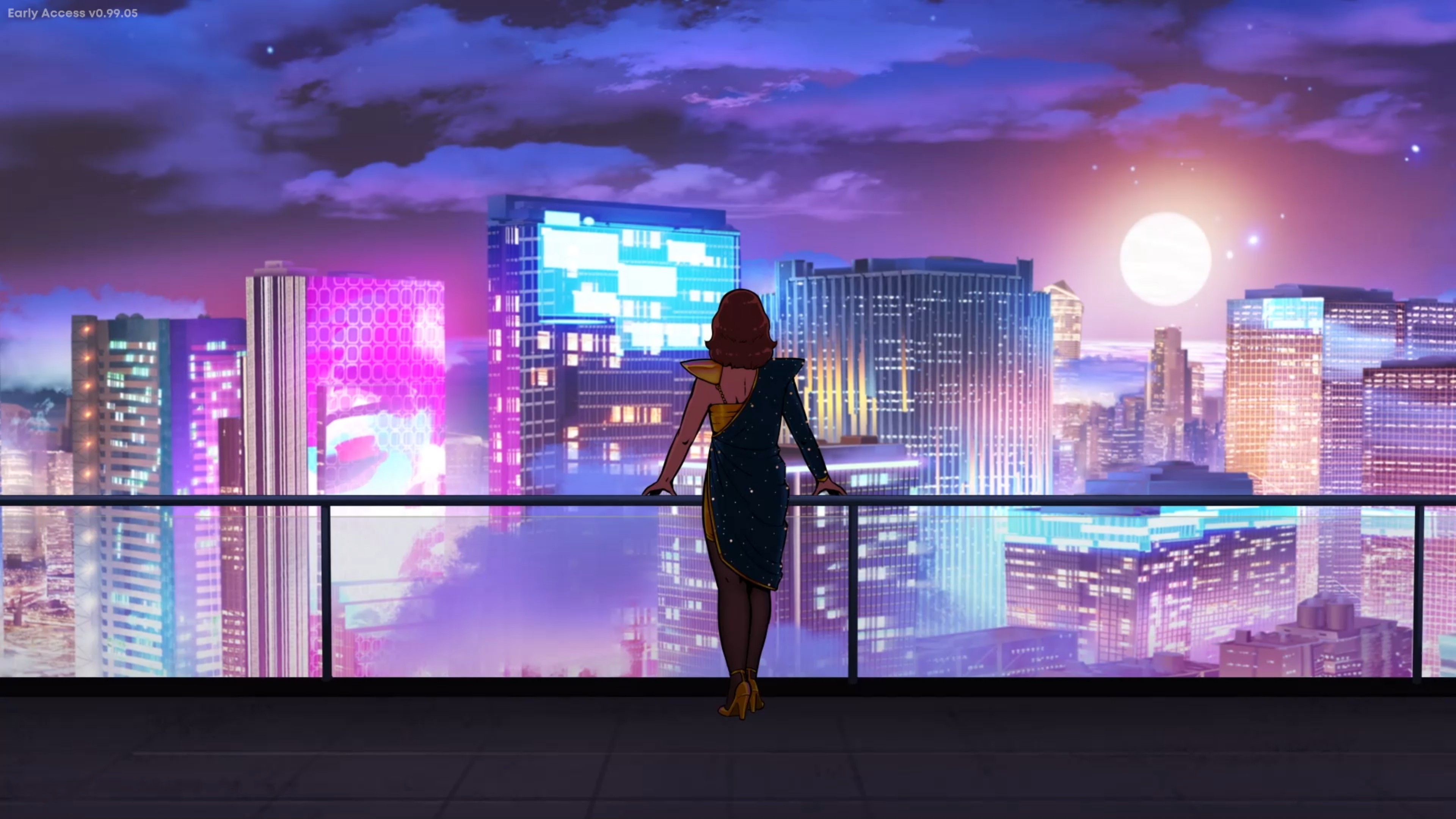
The evening before the Couteau d'Or, Rhubarb invites Nori over for dinner. The two spend a pleasant evening chatting before Rhubarb takes Nori out on the terrace and reveals that she and Nori's mother, Charlotte, were rival chefs, and that Charlotte sabotages Rhubarb's ingredients in her first attempt at the Couteau d'Or. In full villain mode, Rhubarb reveals that she's been waiting decades to take revenge on Charlotte, and has only been stringing Nori along in pursuit of this goal - which she accomplishes by drugging Nori and throwing her in the gutter so that she misses the Couteau d'Or.
That's the end of the storyline. There is no dramatic comeback or twist; Rhubarb is the villain, Rhubarb gets her way, and Nori misses what's been billed as the central event and presumed final challenge of the game. Rhubarb assaults the heroine, abducts her, and leaves her for dead, and Nori doesn't even attempt to file charges. Rhubarb just completely gets away with it and wins. (There's absolutely no suggestion anything further happened, of course, but given that the Epstein files are in the spotlight, bitter associations with similar crimes with which the powerful got away is unavoidable.)
While unconscious, Nori has a reunion / spiritual reconnection of sorts with her late mother, who affirms that everything of which Rhubarb accused her was true. After the sabotage, though, Charlotte realized that she didn't like the person she was becoming, that her competitiveness was turning her into a bad person - and she decided to leave her career instead of losing her soul. Nori is in disbelief that her mother would leave Helianthus for a dead-end burg that "had nothing," but Charlotte replies "[it] had everything. It had you." After a bit of conversation, during which Charlotte asks how things are going with Brie, Nori stammers "I wish we had more time." Charlotte: "That's how you know it was good."
After coming to and staggering back home, Nori attempts to gain a bit of closure by asking to cook for a sympathetic Couteau d'Or judge she'd met earlier - not for a rating; just for fun and the love of the game. She makes her Mom's ribollita, and the judge is genuinely appreciative and impressed - he asks for details of the preparation, and innocently insists Rhubarb, who has appeared to gloat, give the dish a try and share her thoughts. Rhubarb reluctantly takes a bite, then throws down the spoon in disgust. "I think you missed the Couteau d'Or," she hisses, then departs with the last word. The camera zooms out to take in the cavernous silence, so the player can fully appreciate Nori's defeat.
Nori and Brie watch the sunset together amid the sunflowers and windmills, as a song Brie had been attempting to compose throughout the game plays in full. The game ends.
(The sun is still going to explode someday in the unknowably near future, as that problem was not going to be resolved by cooking outside of a chorus of "Ready, Steady, Go" and the intervention of the Ouendan.)
So Cook Serve Forever ends up a game about what happens, what to do, when the bad people win. And its message is: build happiness with those you love, and appreciate it while you have it.
This story is as 2025 as fuck.
I admire Vertigo's audacity and heart here. It's gutsy as (again) fuck. It's a good solution to a horrifying situation, and a good message for our times. I admire that they stuck to their guns and their message in both gameplay and story (and, frankly, they probably weren't gonna do the "winner takes all" climax better than they did in CSD3, so why not go for a swerve).
On the other hand: this is a game with kind of finicky gameplay with no big test of or climax to that gameplay and an ending that's at best bittersweet and at worst feel-bad. (Yeah, what do I expect, 2025 is a feel-bad year.) This game was also clearly Vertigo's moonshot - it has a very evident high level of production, polish, and love - and, I mean, it's not one that leaves you feelin' fine and positive at its end - that leaves you wanting more. I felt downright exhilarated at the end of CSD3. Here, I just wanted to step away. I Love Galindo and Vertigo, they obviously put a lot of time and effort and resources into this project, and I want to see them succeed. I don't know how the player base is going to respond to this project.
(There are practical reservations I have to the story's twists: why make Rhubarb a seemingly textured character if she's just going to be a sneering villain in the end; Charlotte could have used her talents to some professional effect in her new home, as she and her daughter were clearly in poverty for most of Nori's childhood. They pale, though, against the weight of the choices made in the ending. One thing I did find kind of darkly clever: the game has three achievements that stay locked for most of its length, leading the player to suspect they correspond to scores of one, two, and three stars in the Couteau d'Or. This, of course, does not come to pass, and the achievements are unlocked in other ways during the actual, competition-free ending.)
I've mulled over the ending for a few days now, and I still don't wholly know how I feel about it. The ending is arguing that Nori's true priority should be her love for Brie, and I agree. Does the rest of the game really argue that, though? Well, it does in having Brie a constant, supportive presence at Nori's side and making their dialogue and chemistry, which does work, the mainstay of the narrative portion of the game. Does it really depict that Nori's ambitious are threatening her relationship with Brie, though? There's a bit where Nori keeps missing a sunset date Brie wants to have, but I don't think it does, overly. But perhaps it shouldn't need to - the game is arguing, after all, that forging a wonderful everyday with those you love should be your priority, and it argues for it by depicting that everyday, not extraordinary events.
The ending also argues that cooking is about the joy and connections you make, though, CSF has some gameplay systems that fight you to a degree on that account, and, as mentioned, I think the game could have showed Nori forging friends and memories through her cooking career a bit more. I can't say there aren't incidents, though - she partially wins over a librarian who thinks her food cart represents the intrusion of capitalism on the last place a person can go and not spend money; she meets a gourmet jazz singer who's dined at every restaurant in the city, including Charlotte's; there's a bit where Brie institutes a unionization movement at a game studio after the dumbass manager hires them for a pizza party; the fatherly bodega owner who saves primo produce he manages to get for Nori's cart; the hilariously gregarious host of a underground cooking tourney Nori manages to get embroiled in; and there's the bond between Nori and her Mom, of course, and Brie helping on the food cart. Thinking back objectively, I find it hard to defend my idea that the bonds forged through cooking aren't depicted here - and yet I can't wholly shake the feeling.
And there's Rhubarb getting the last word. Perhaps she doesn't - the shot of Brie and Nori together watching the sunset is quite gorgeous, and they do love each other. Perhaps it's just the totality and sting of Rhubarb's victory in the arena she chose. Nori making a stand for the joy and goodness of cooking in that next-to-last scene by cooking for the judge with her heart and no personal gain is a good character-based decision, but it kind of rings hollow with how Rhubarb controls the stage and narrative in this scene and those preceding.
In writing this, I'm finding that I'm defeating my own arguments against the ending but still kind of feel them in my gut. I imagine I'll feel better about the ending with time, as the gameplay frustrations become more distant yet the memory of the narrative, and the daringness of the ending, persists. It's, as I keep saying, gutsy to do, no matter how it's done.
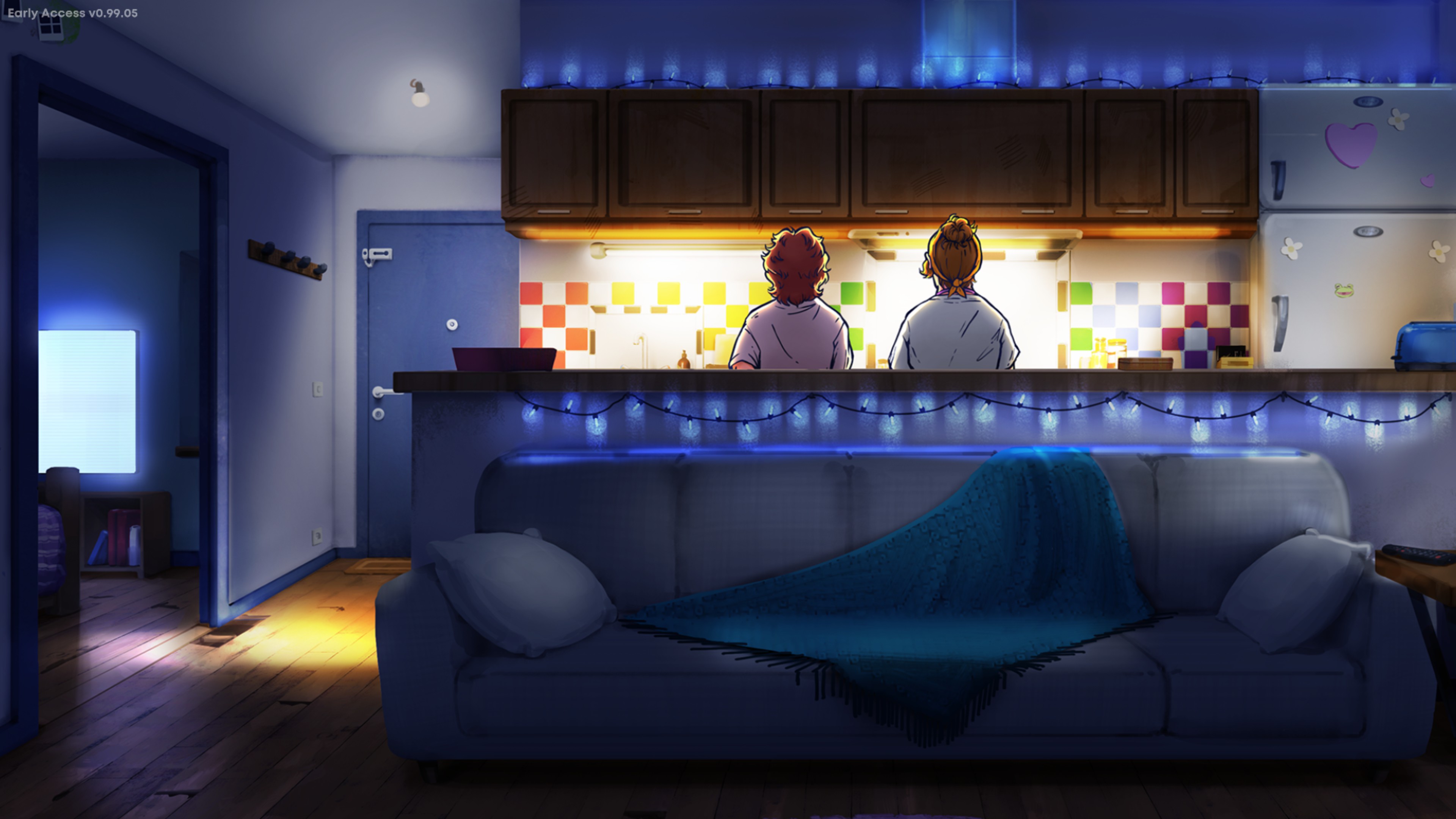
In the final analysis: If you're a Cook, Serve, Delicious fan, I would recommend you play this, as the presentation you likely love about the series really has been taken to the next level, and it is interesting to see a full-fledged narrative told in this universe - just bear in mind that the gameplay isn't to what you're accustomed, and it's very possible you won't like it as much. If you're coming into the series fresh, despite intentions, I actually wouldn't recommend you start with this, as it's not typical of the rest of the series and will likely prove frustrating gameplaywise unless you completely abandon gameplay goals - and maybe would still do so. (The linear presentation of tasks may be less overwhelming than the main series' emphasis on time management, but the two-hands system has its own problems in that department.)

